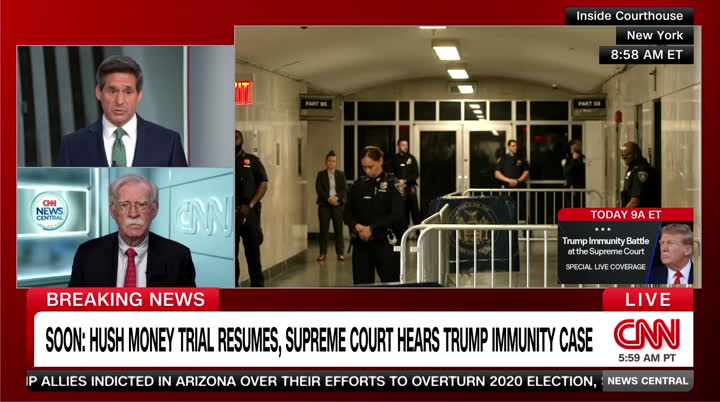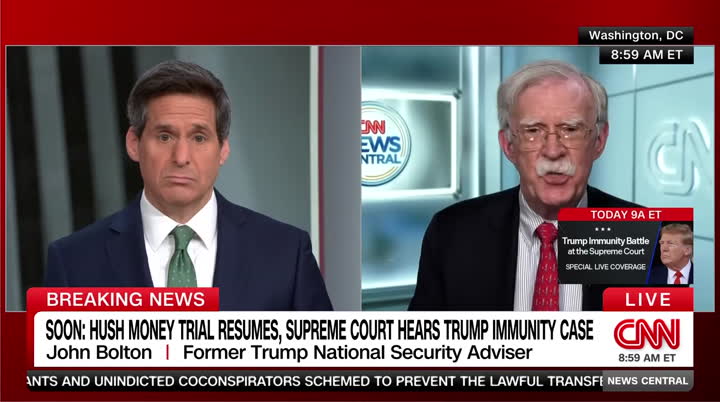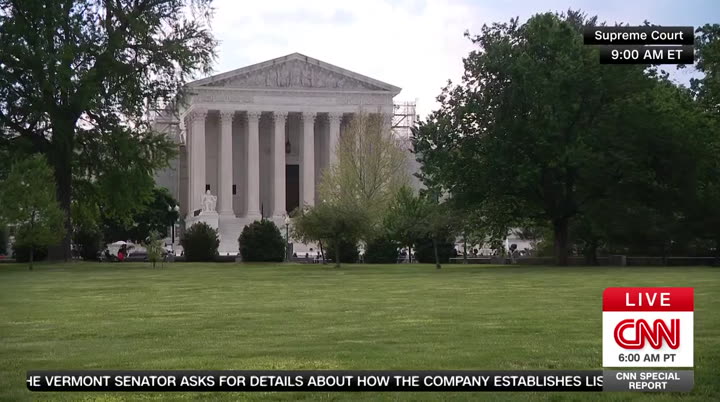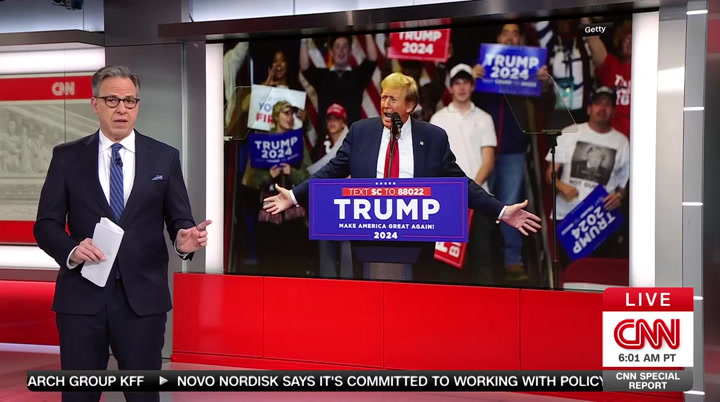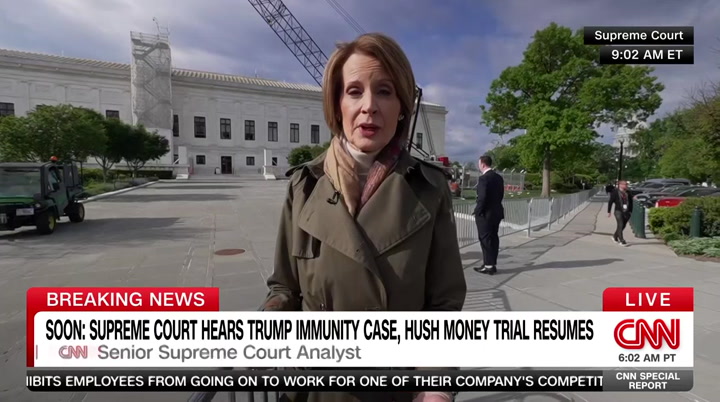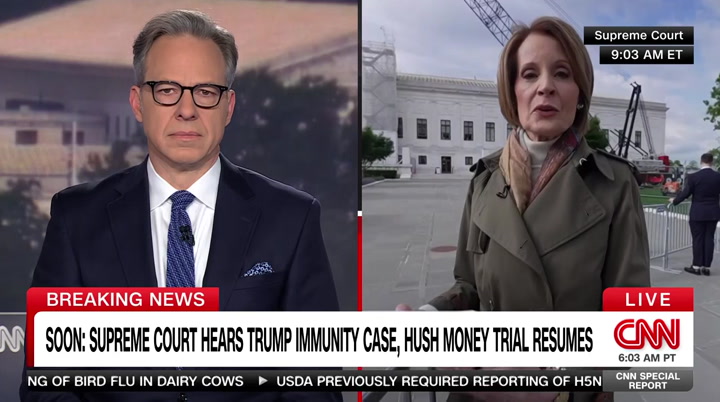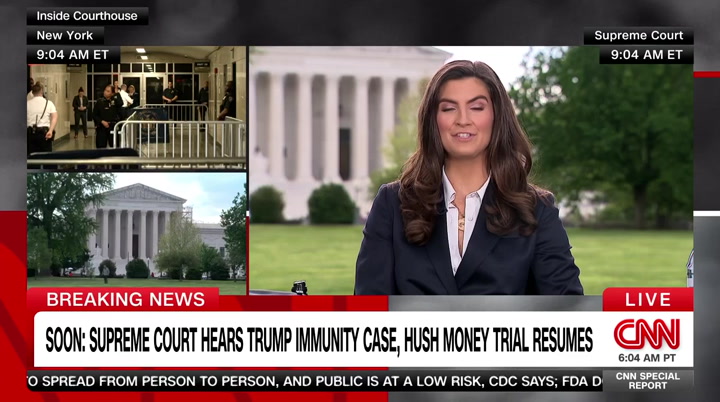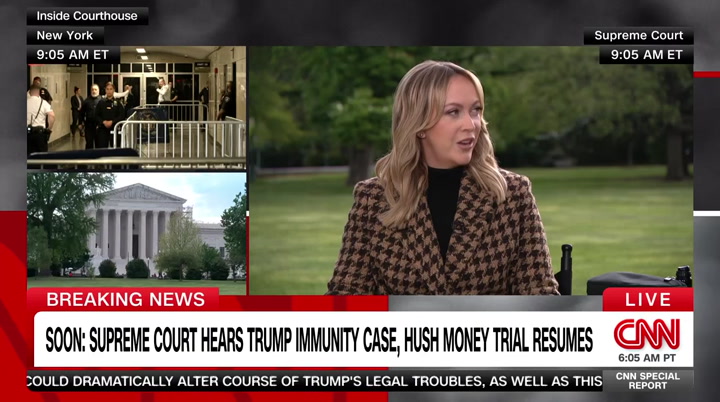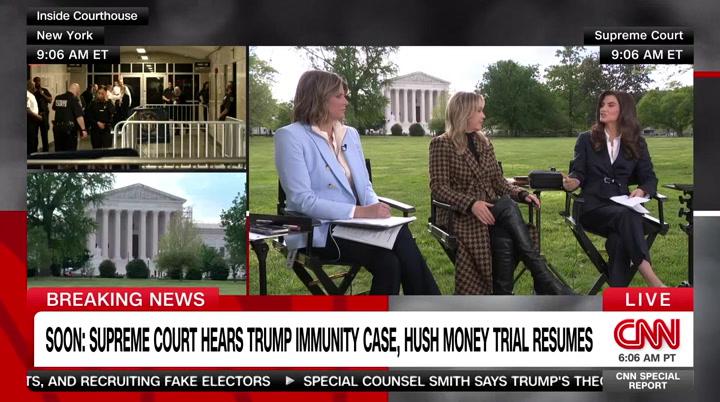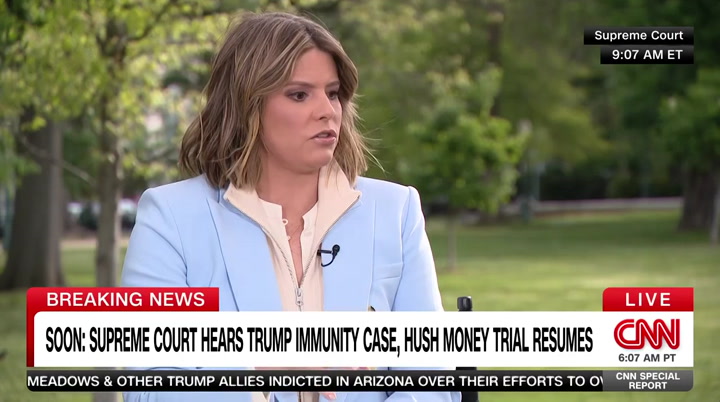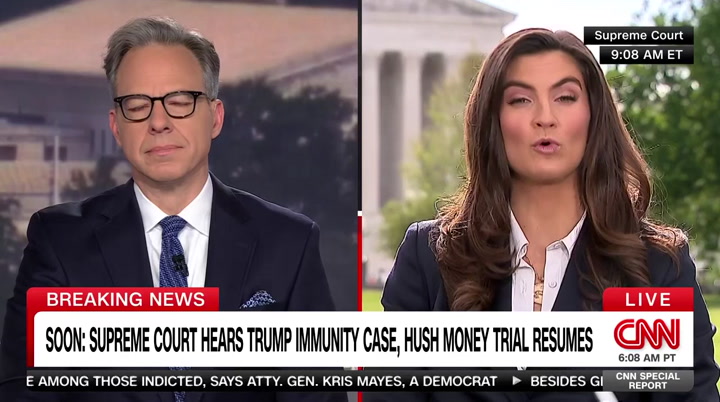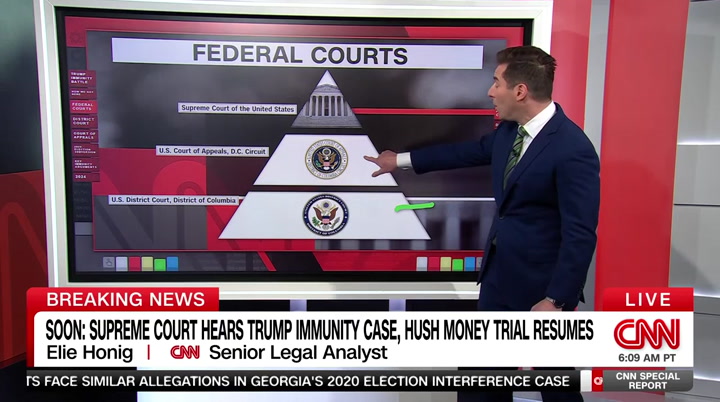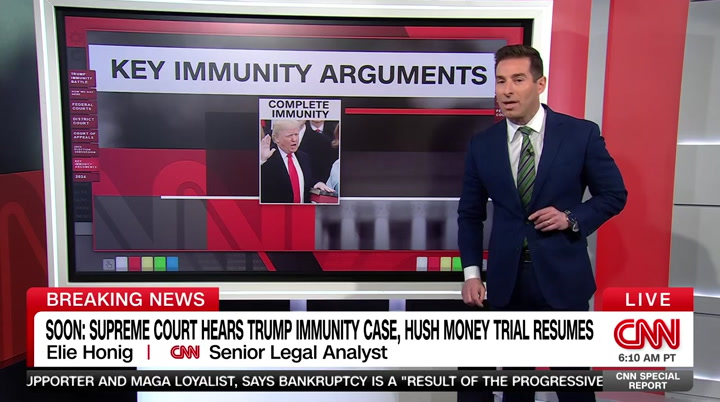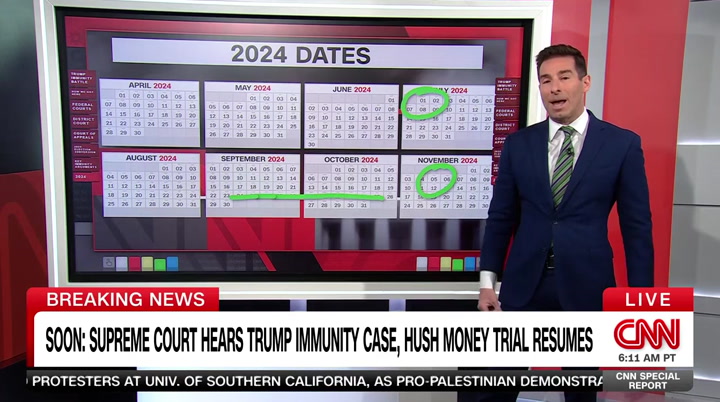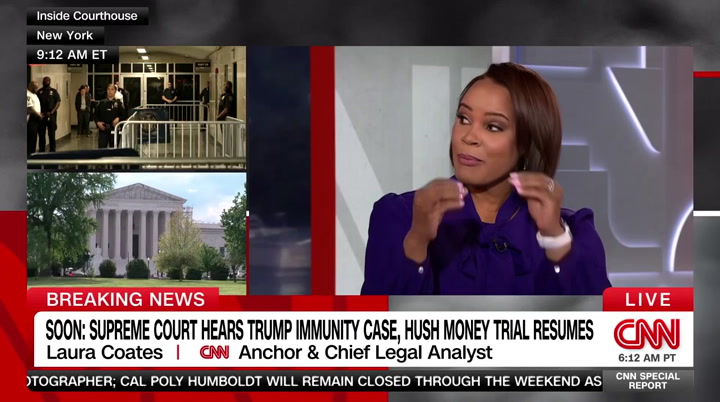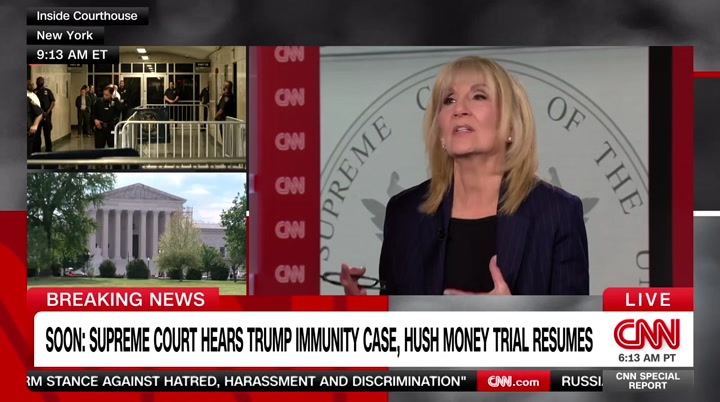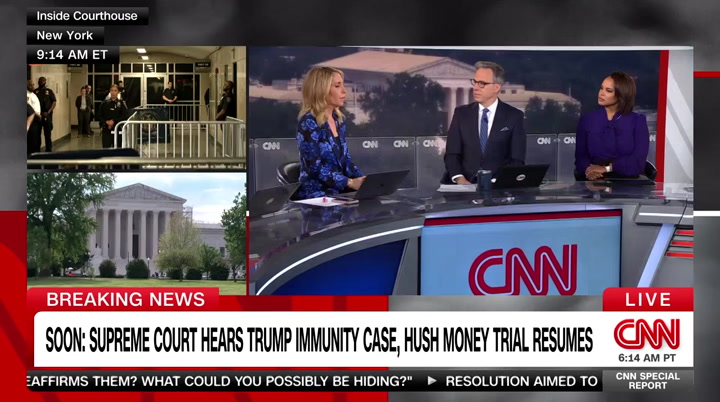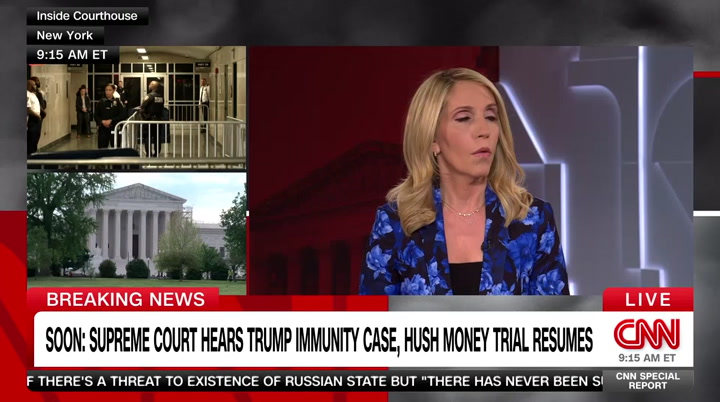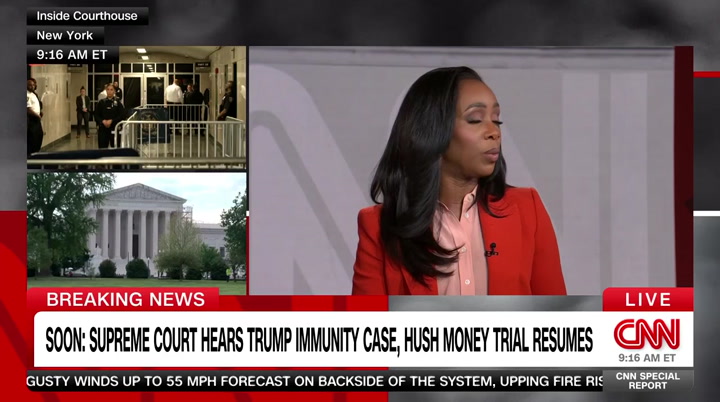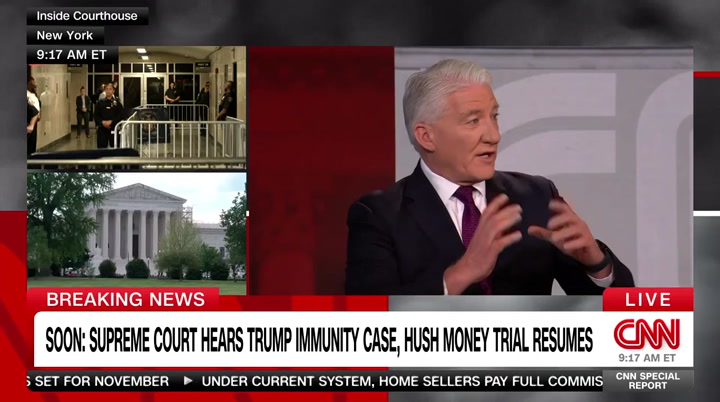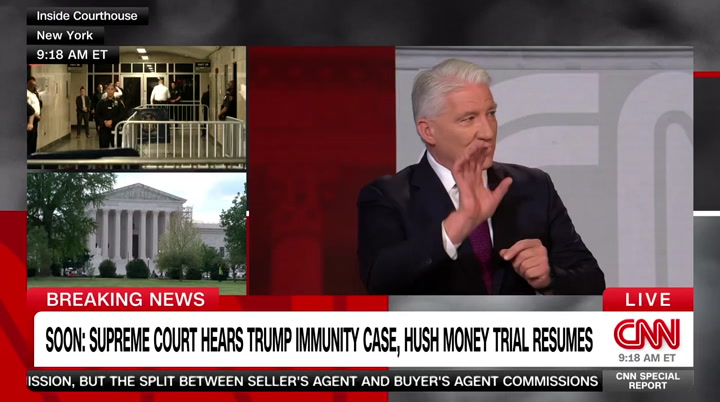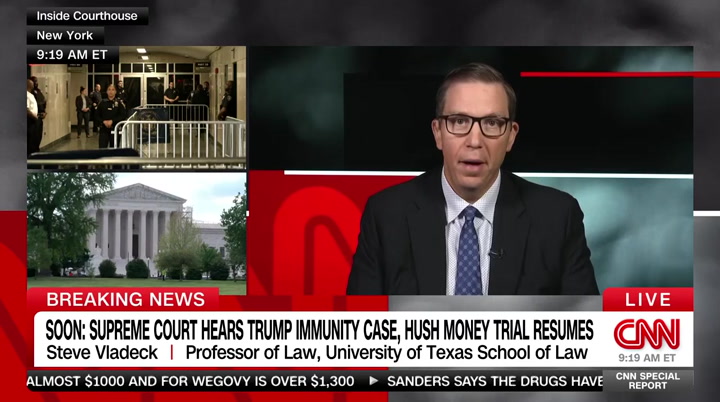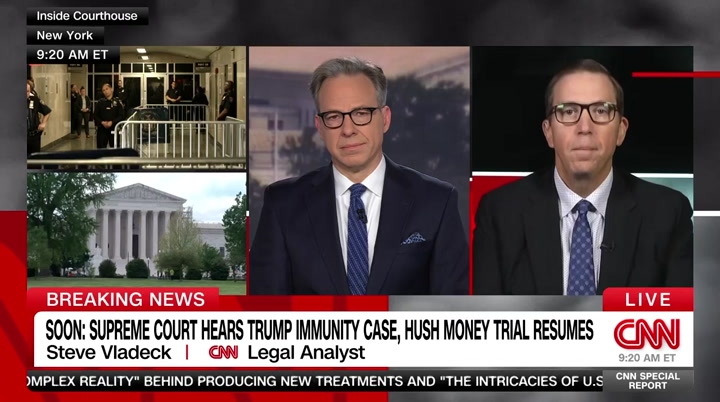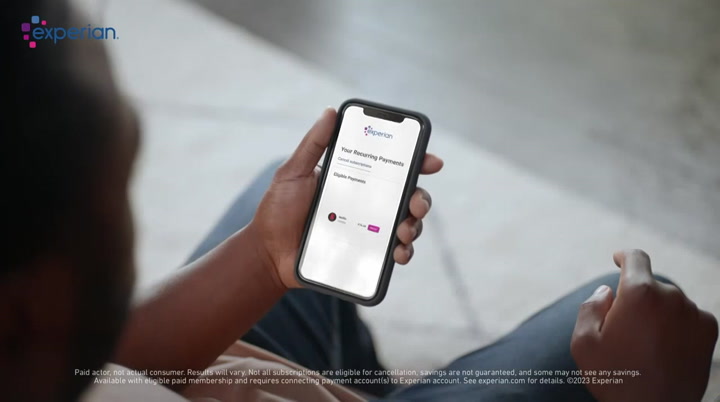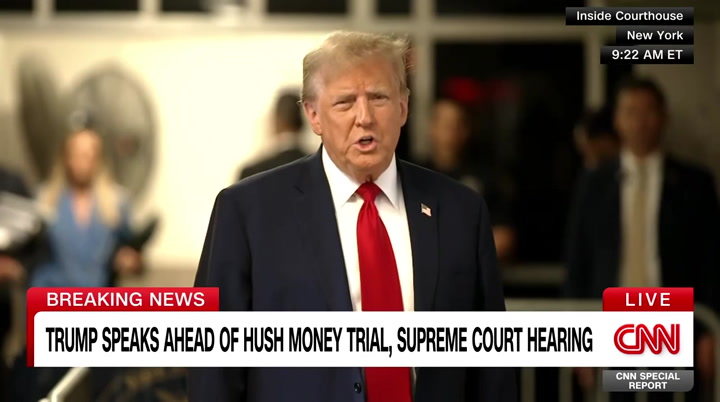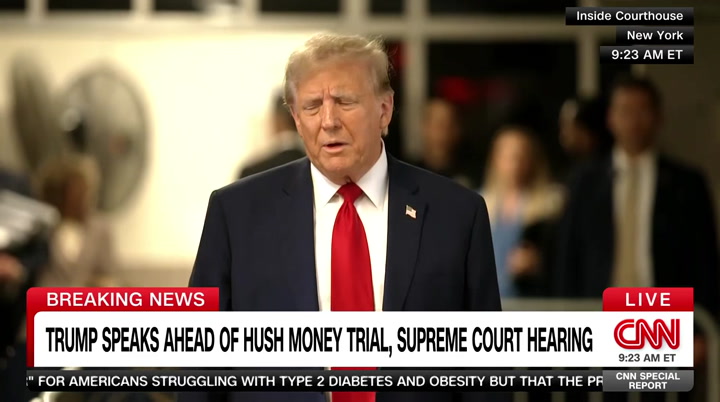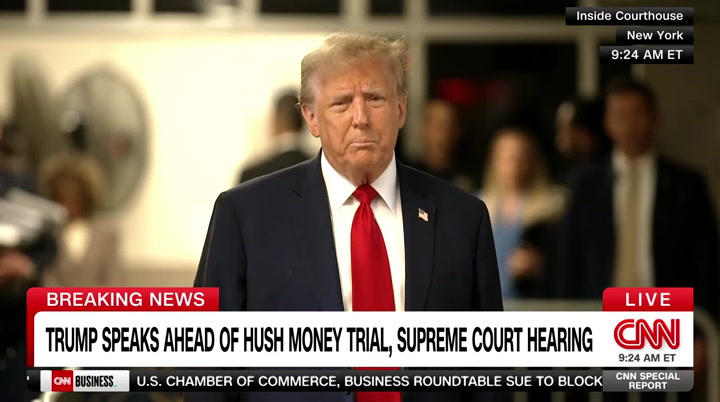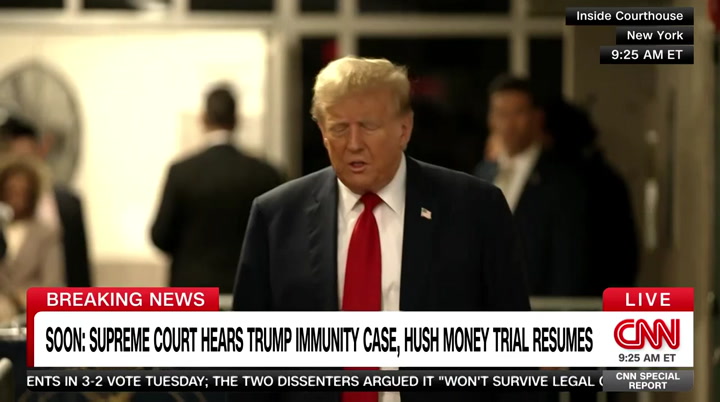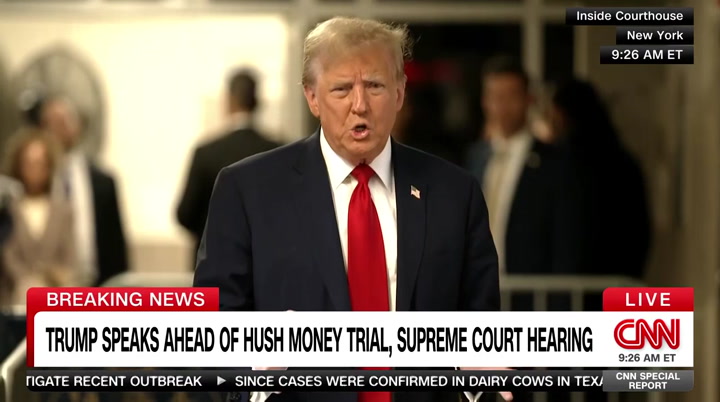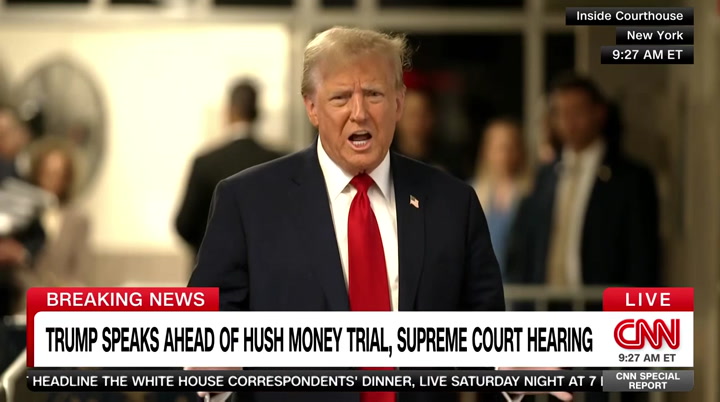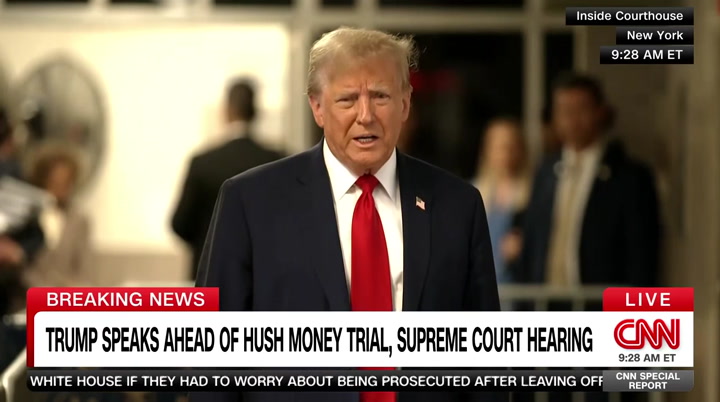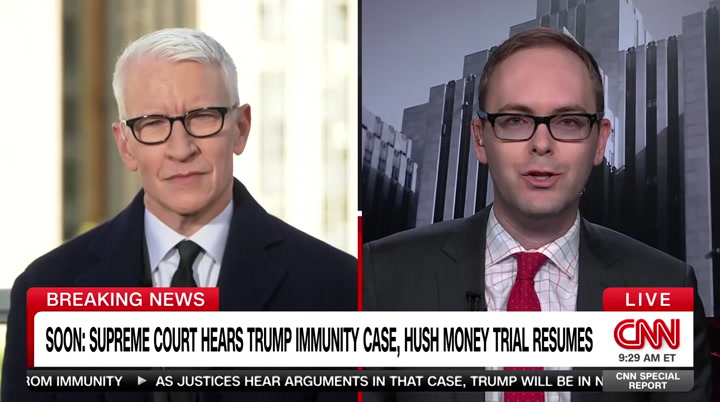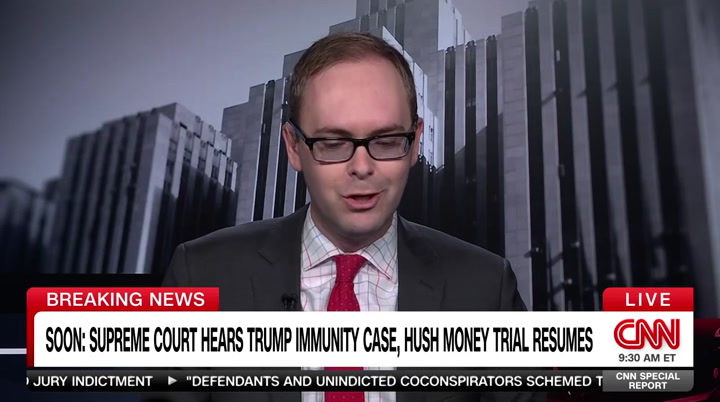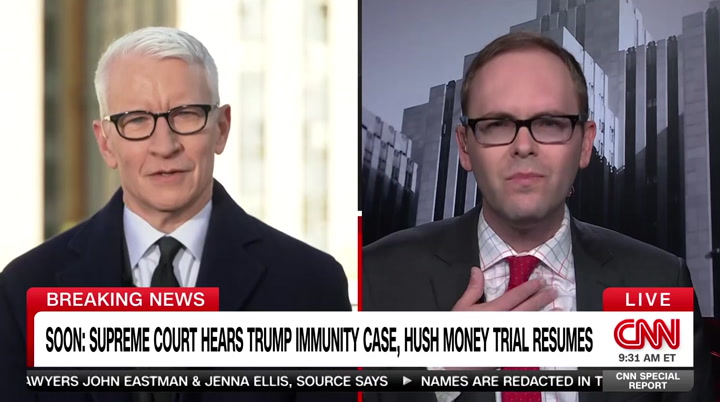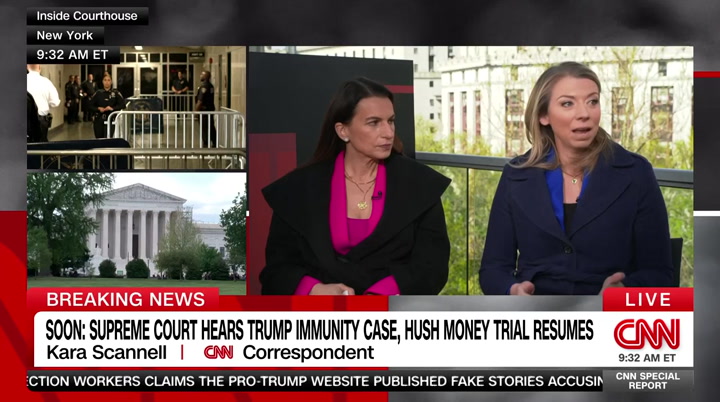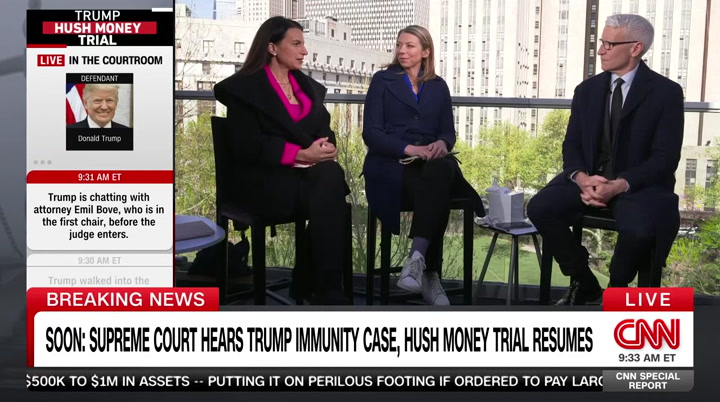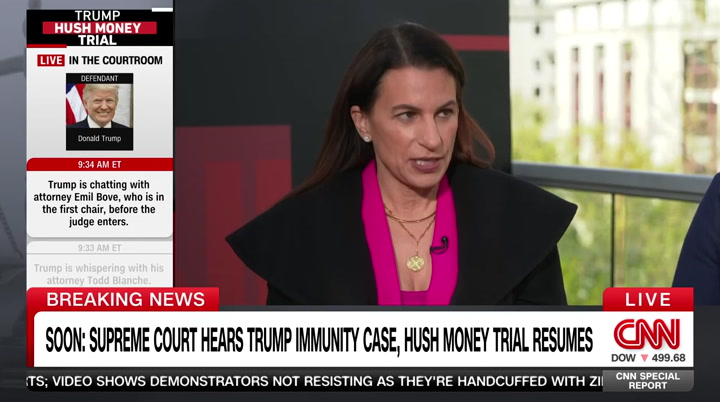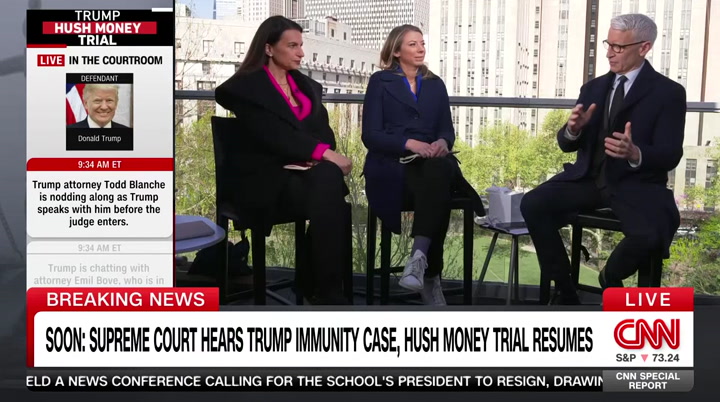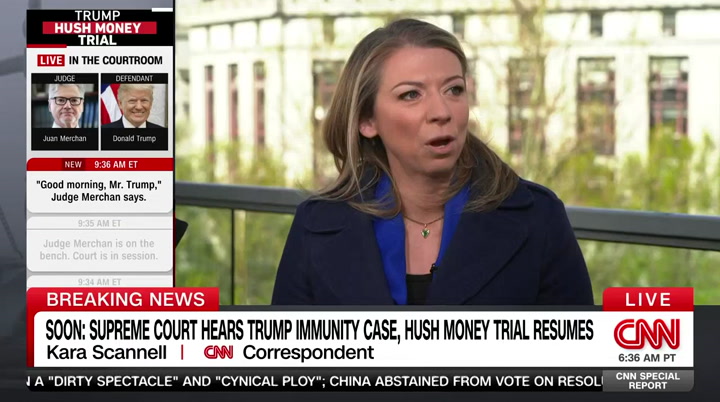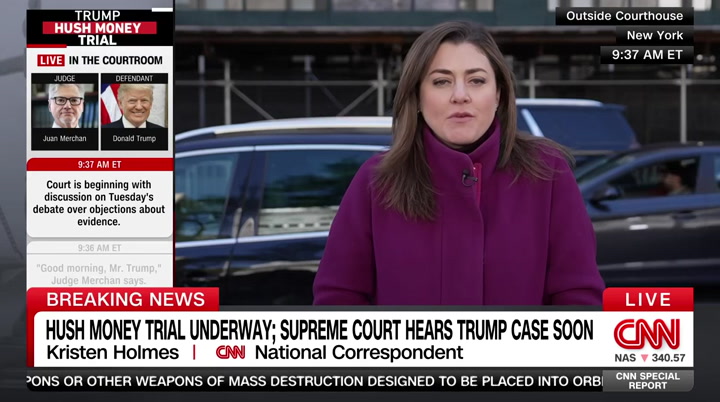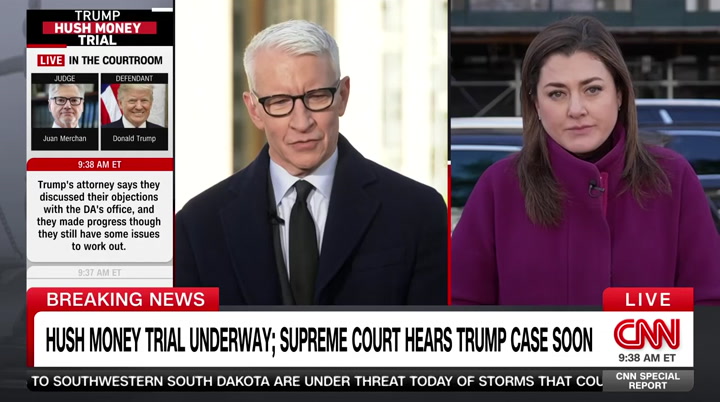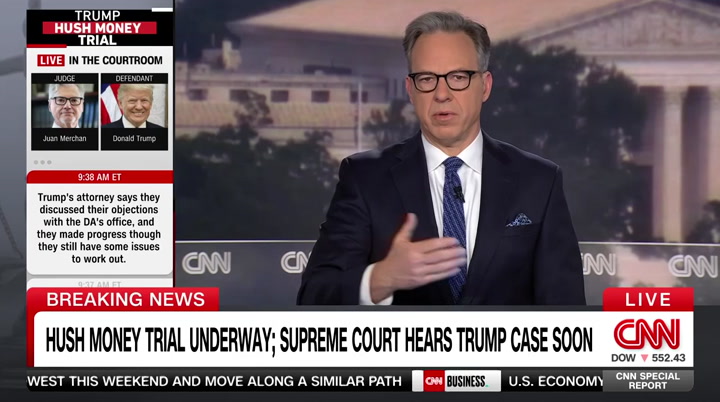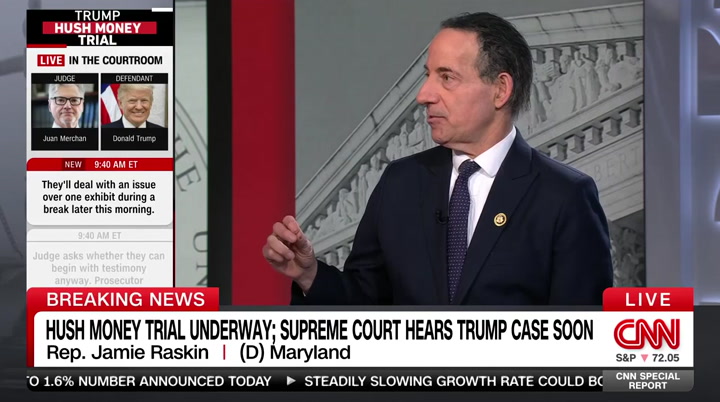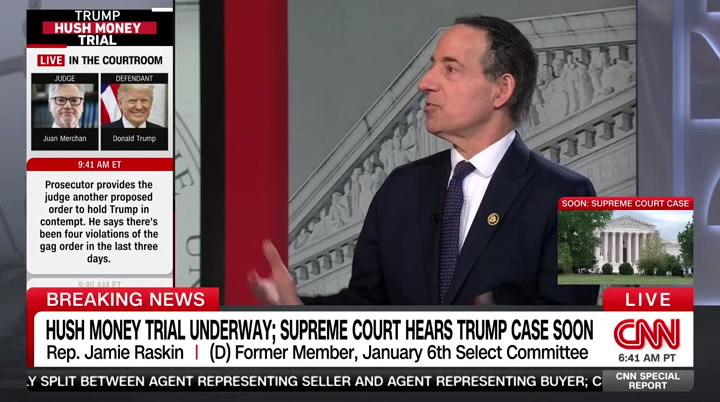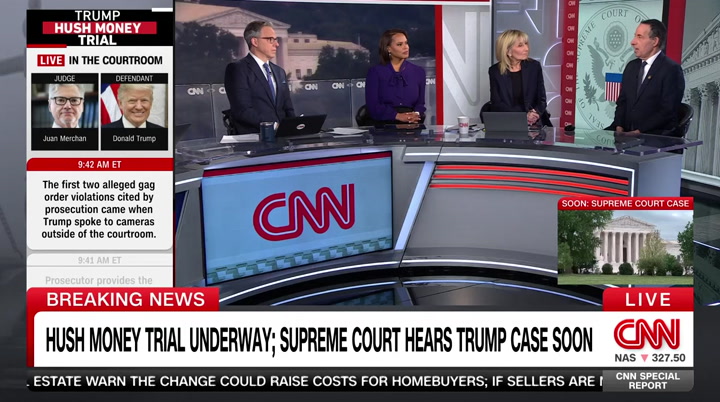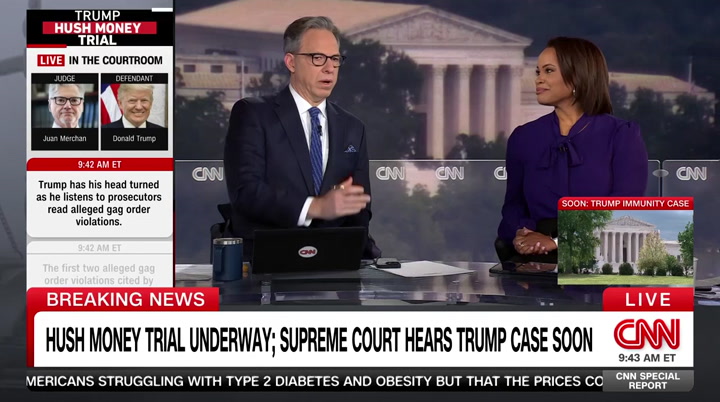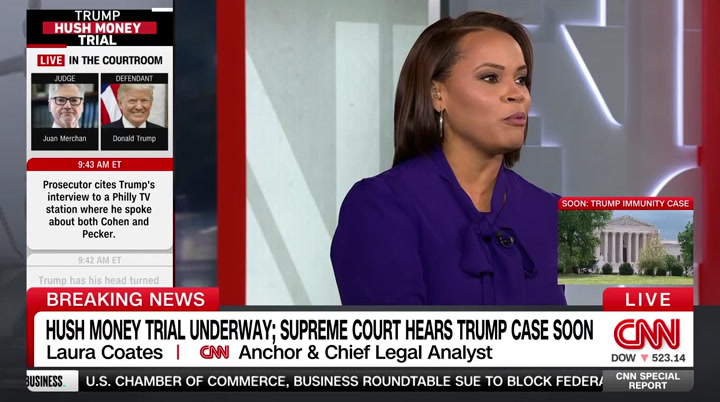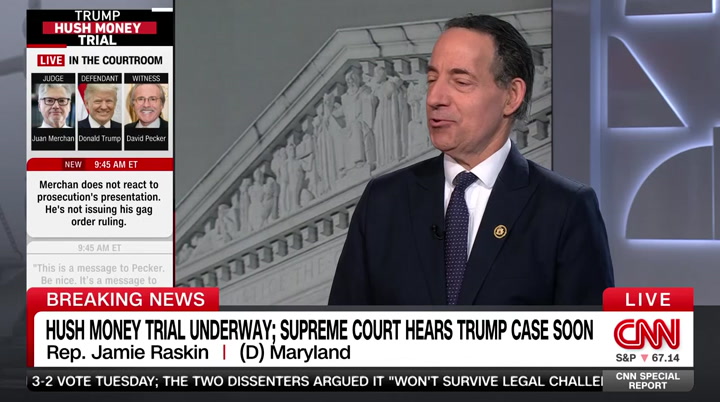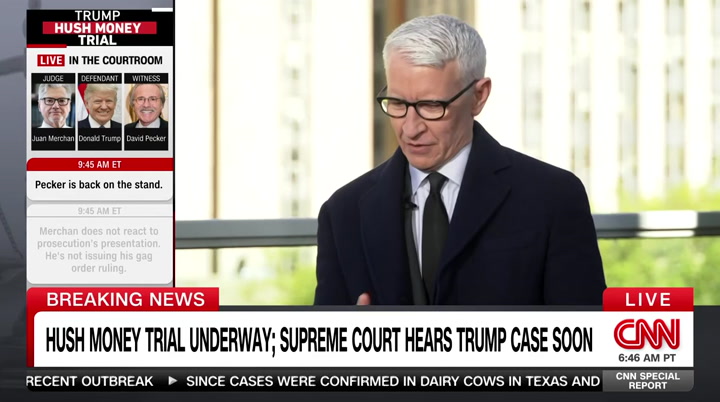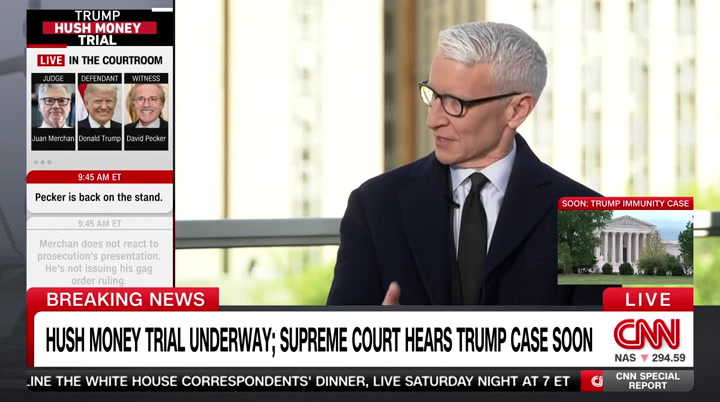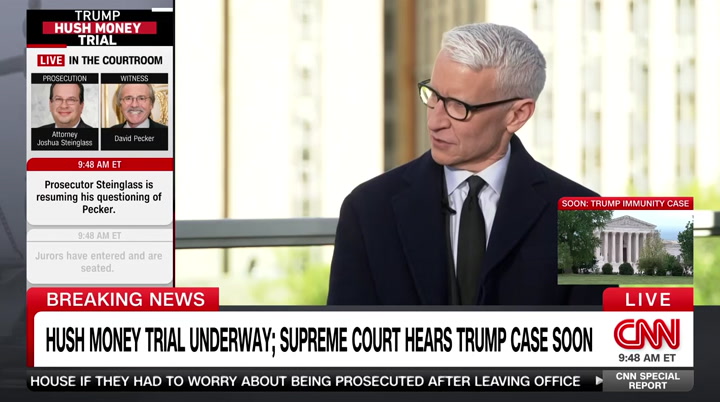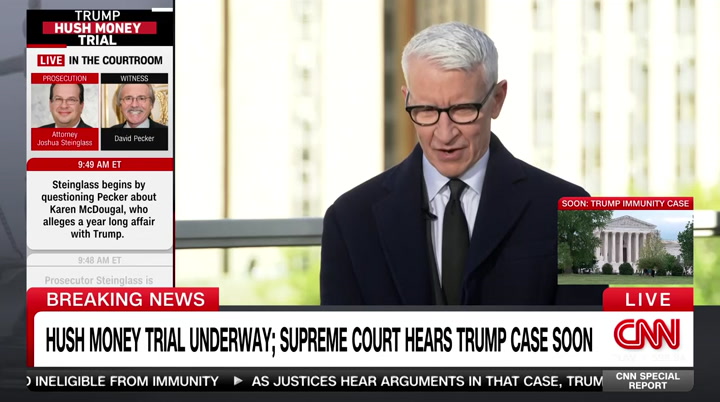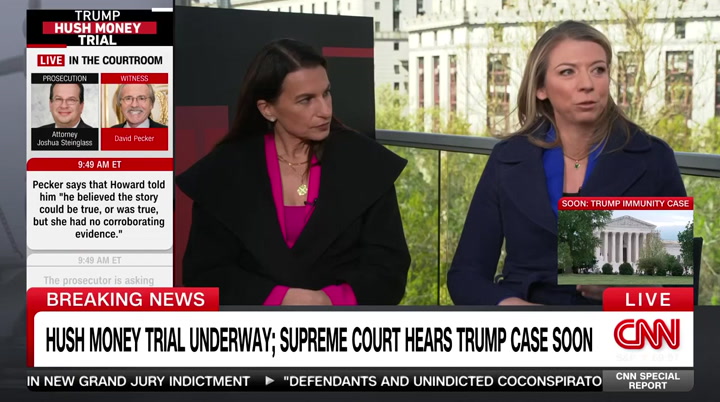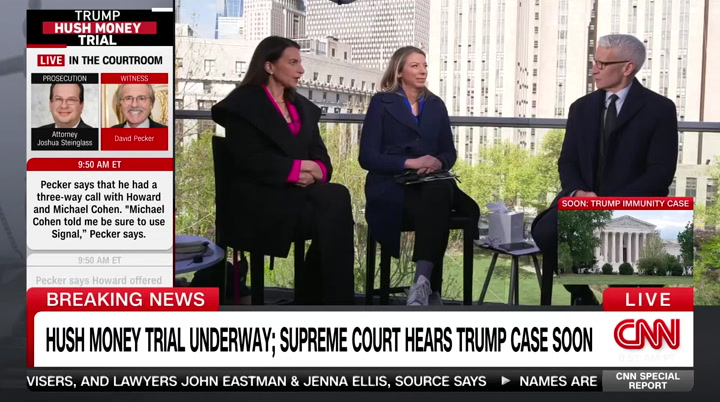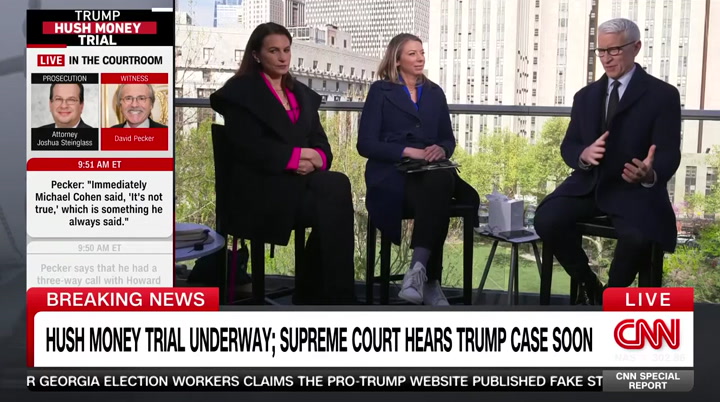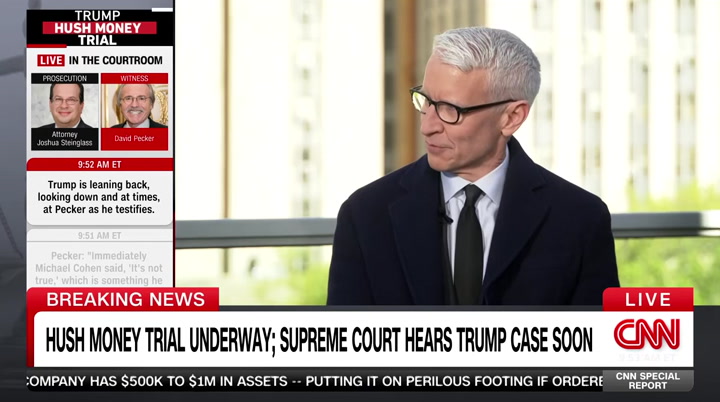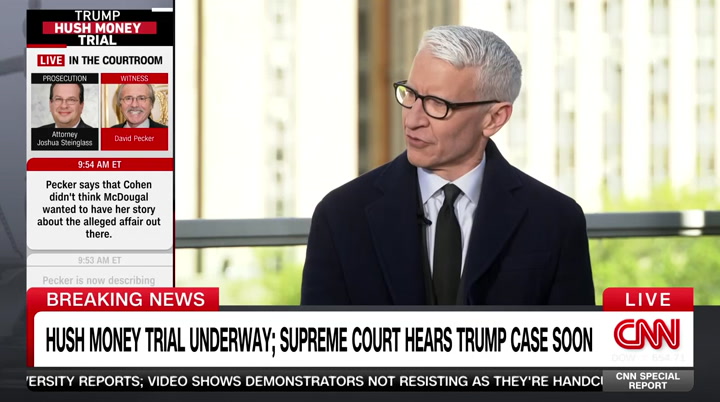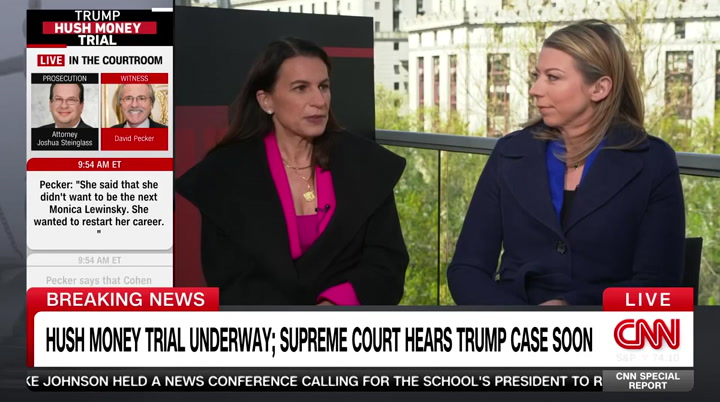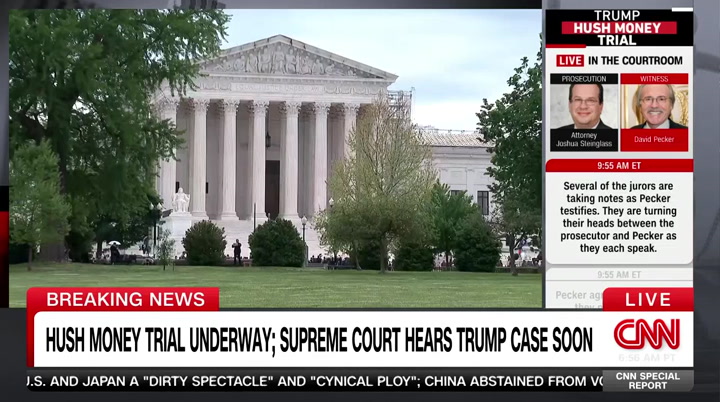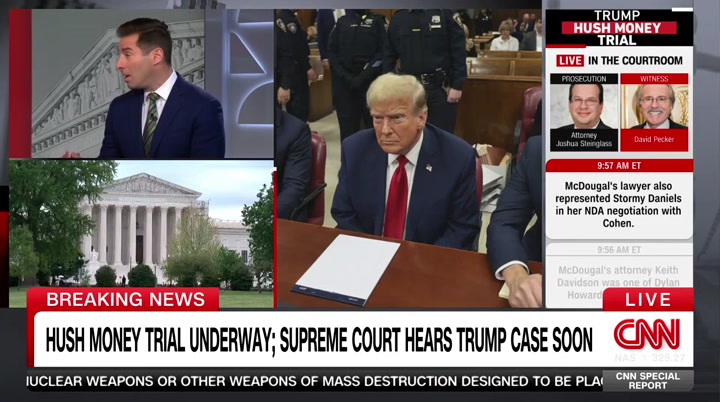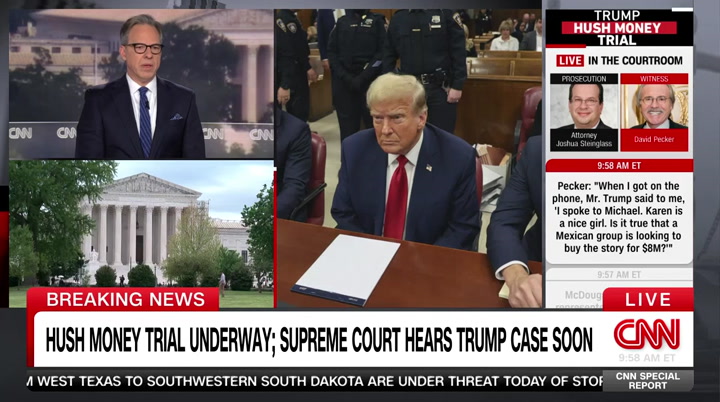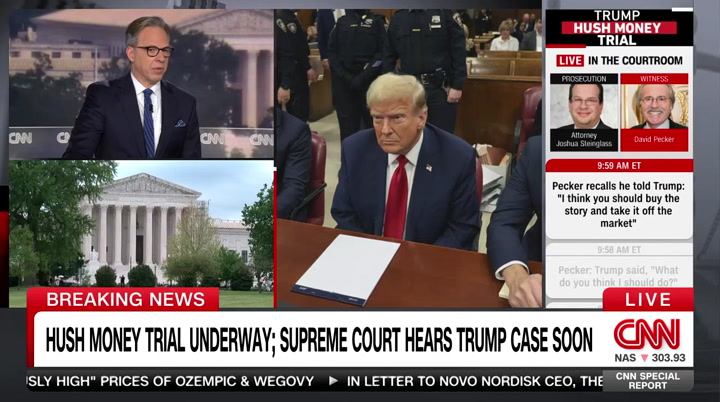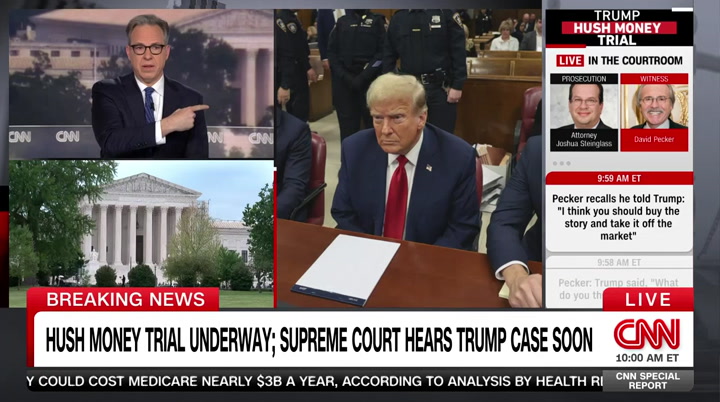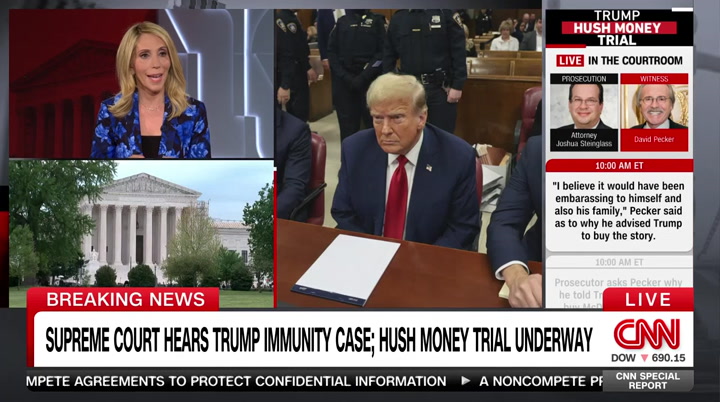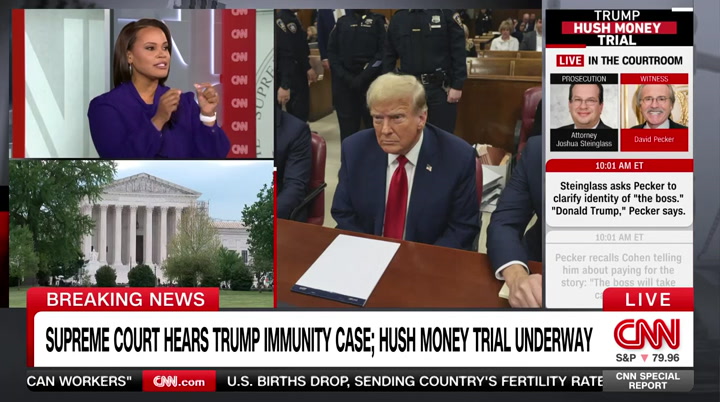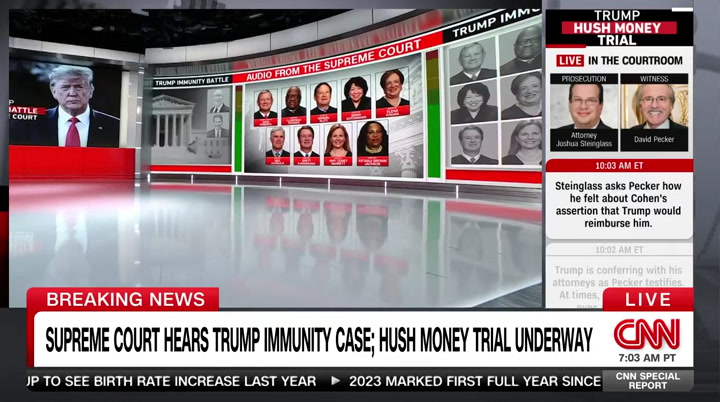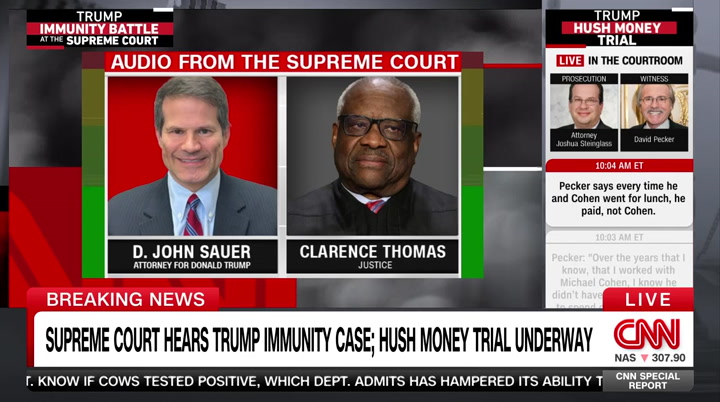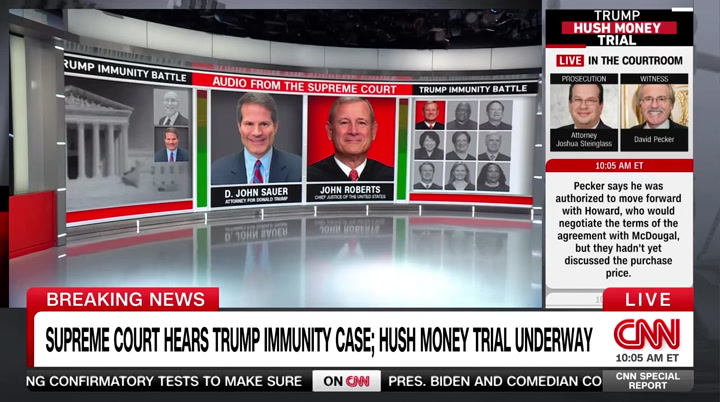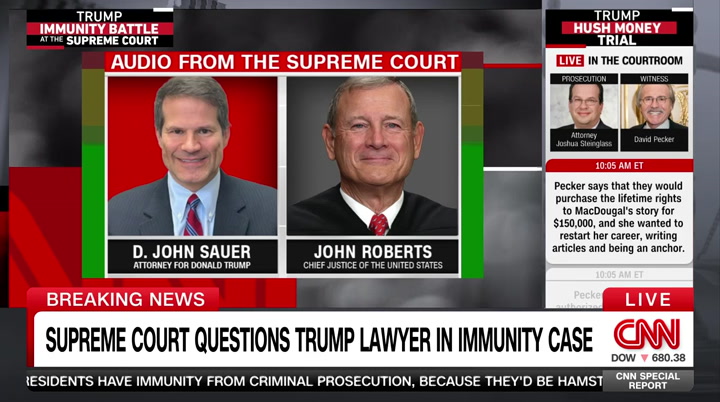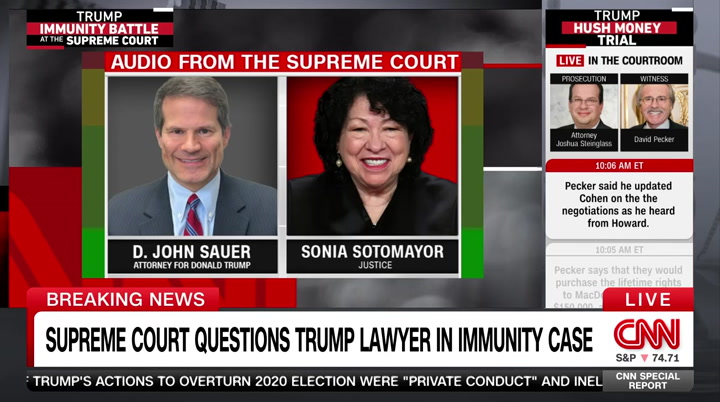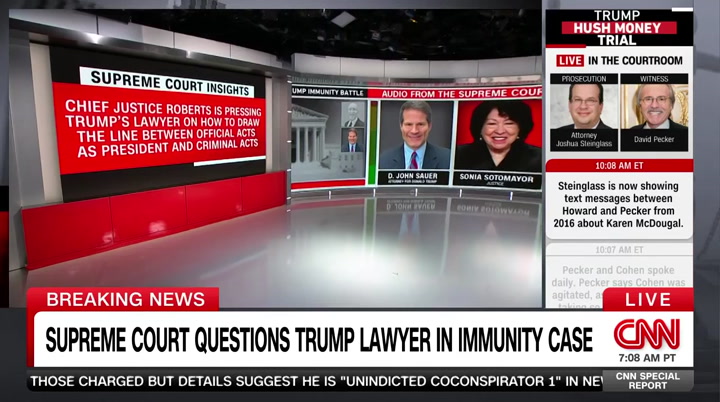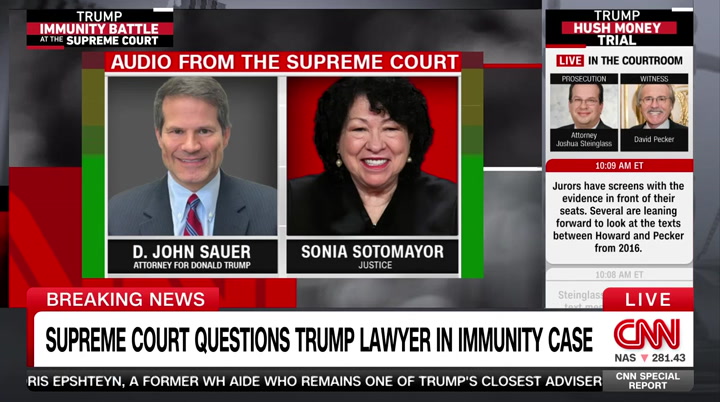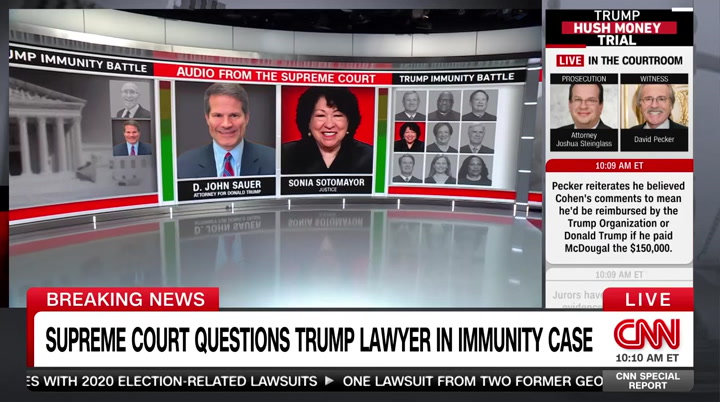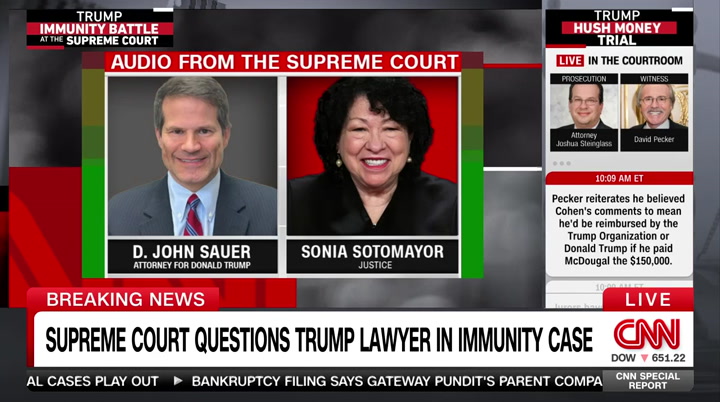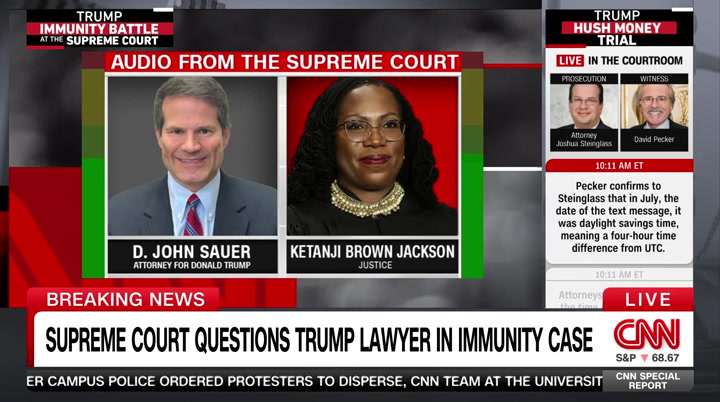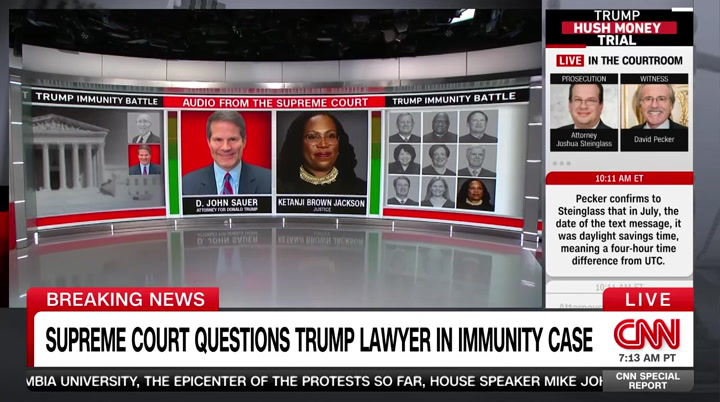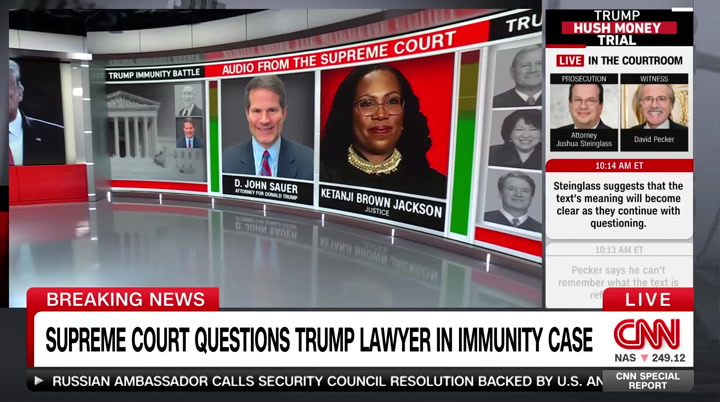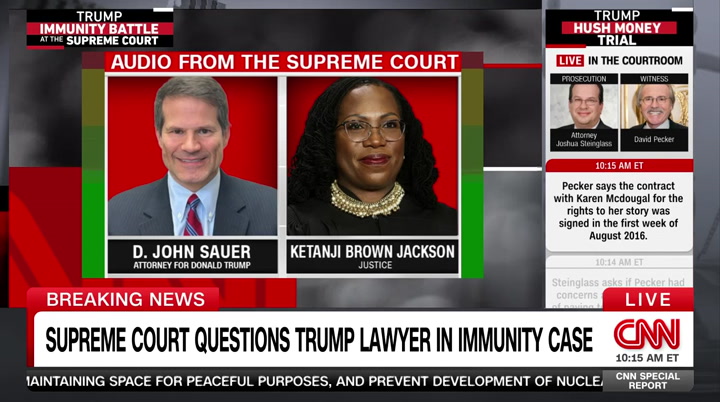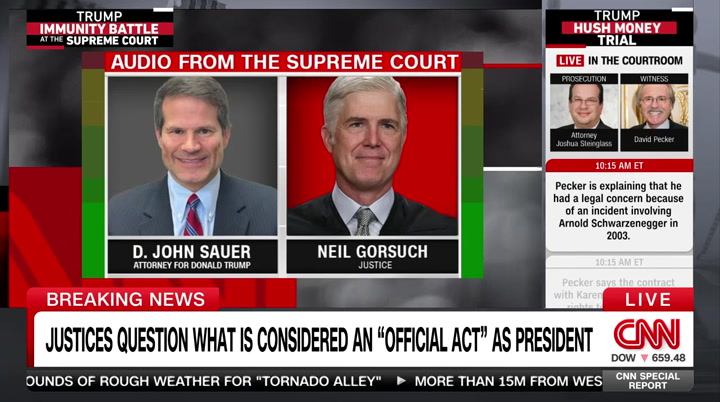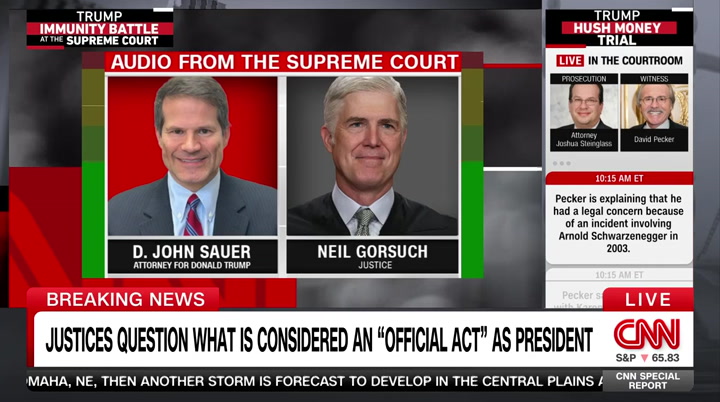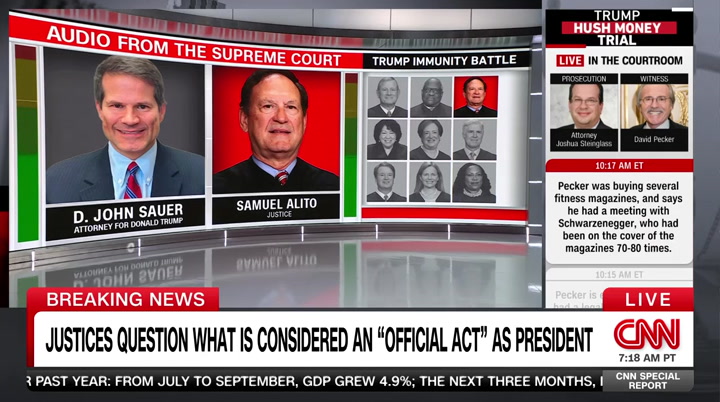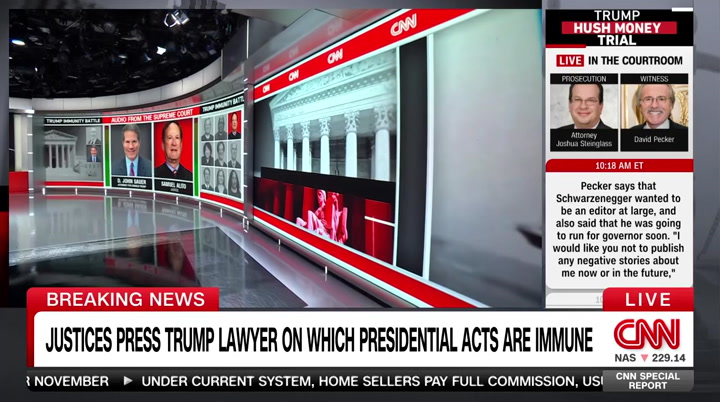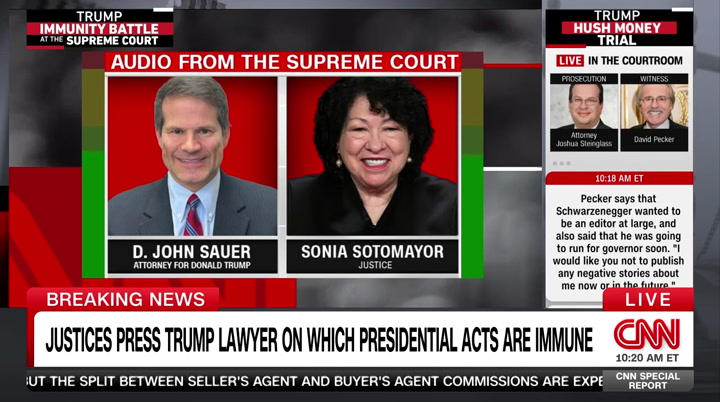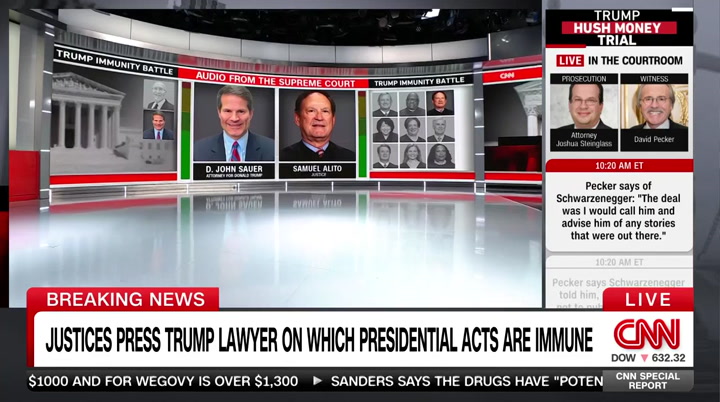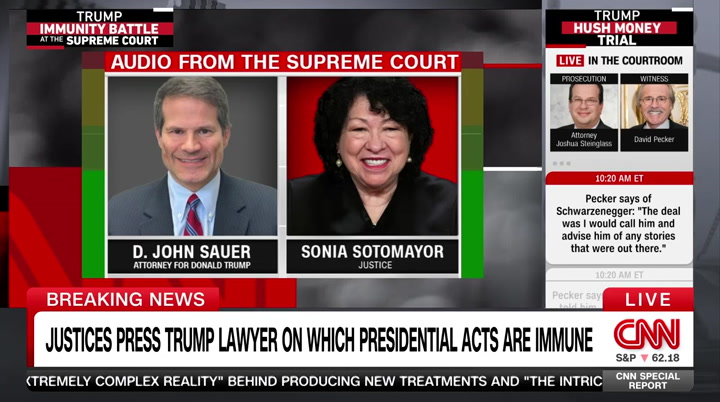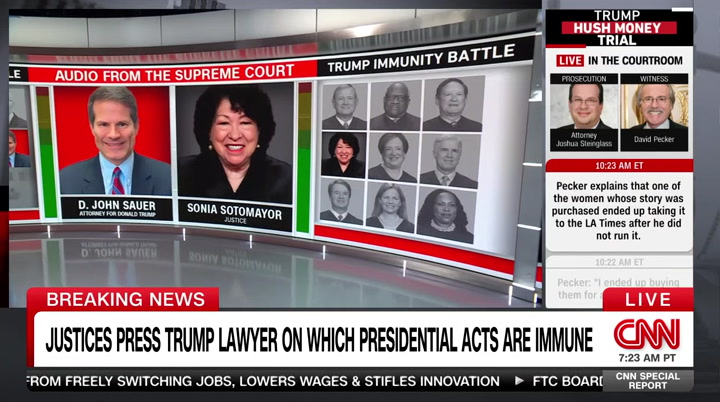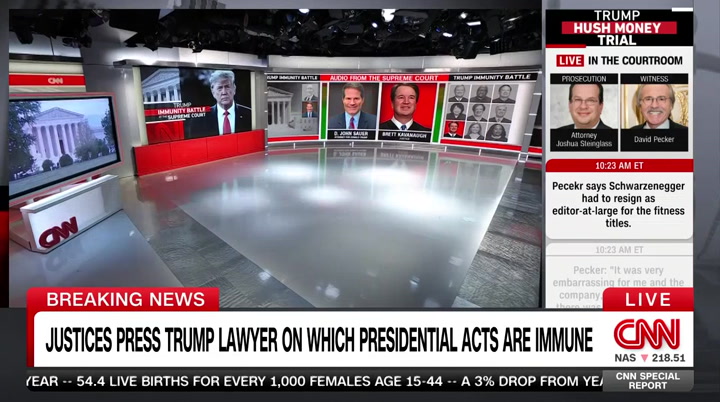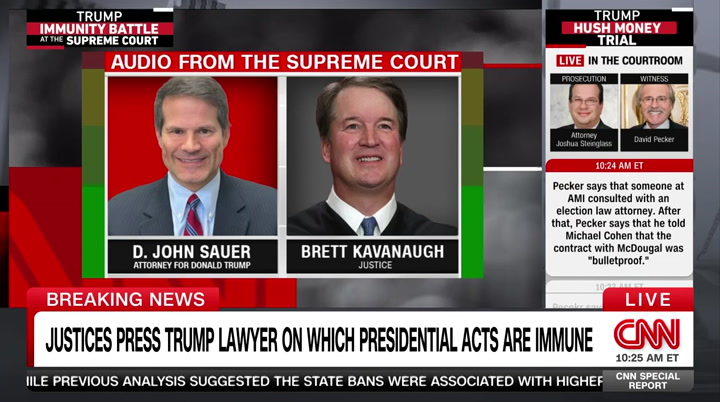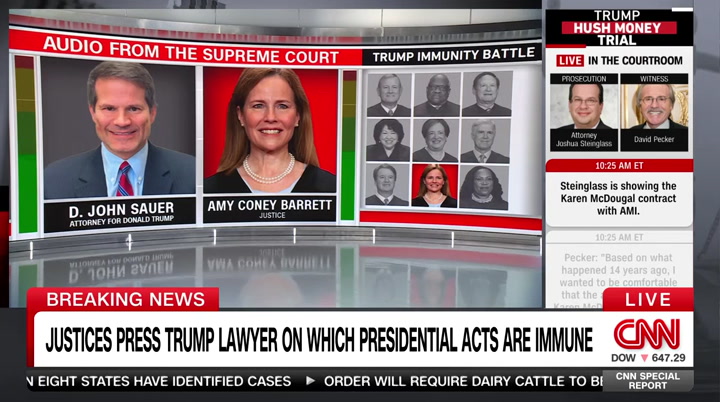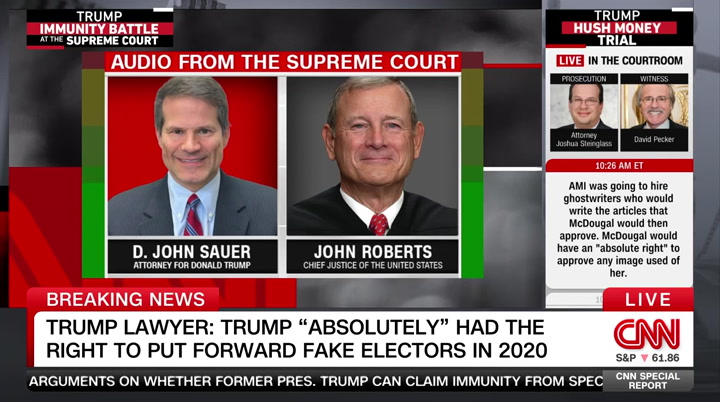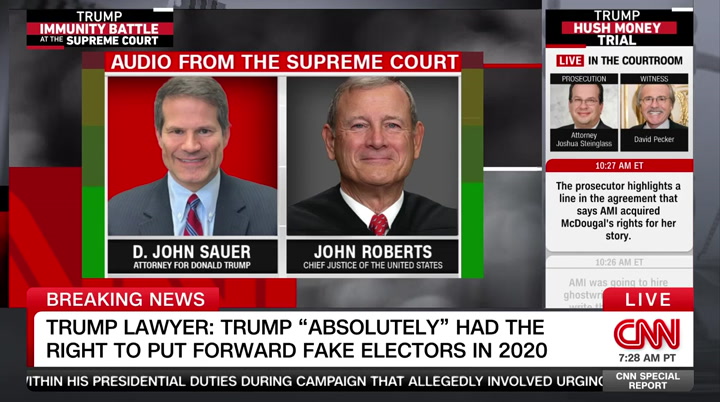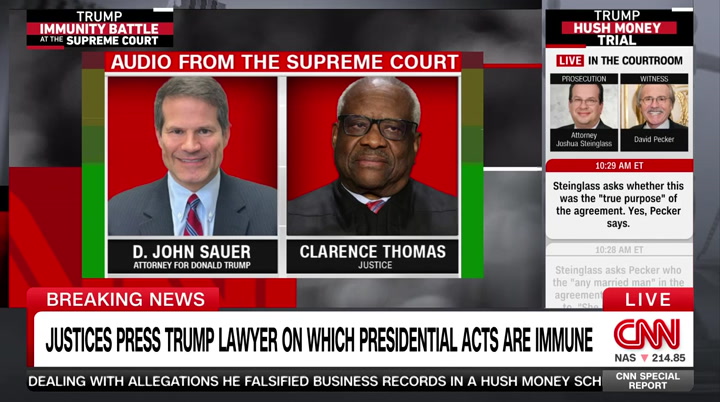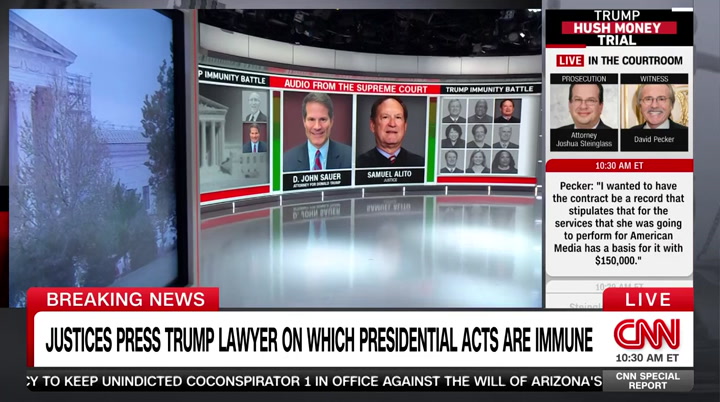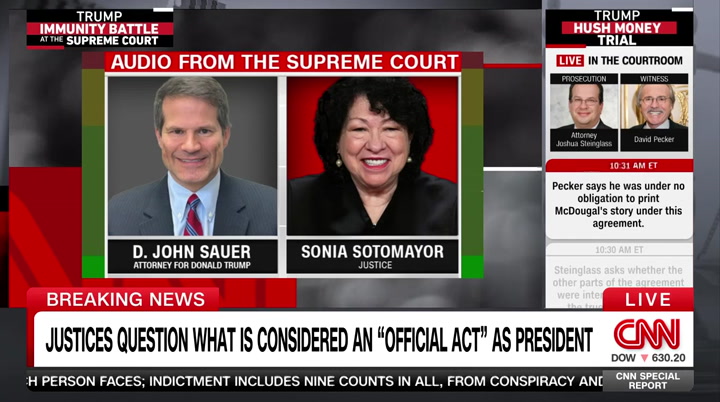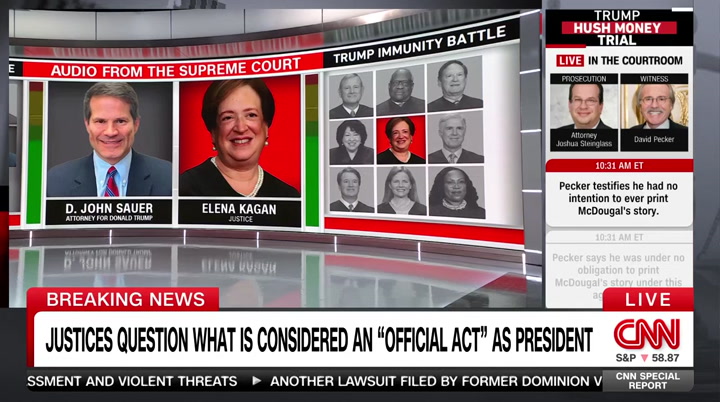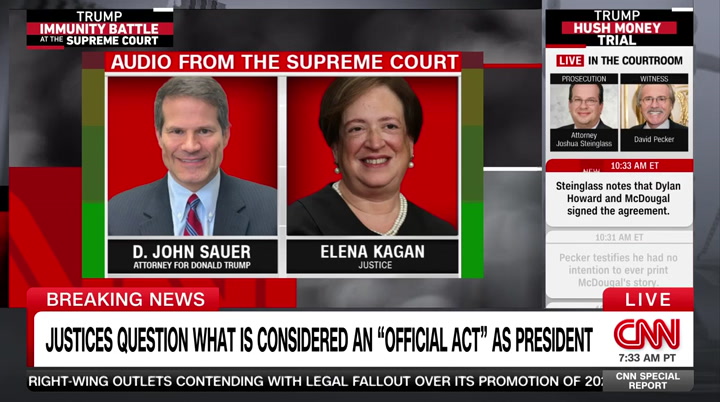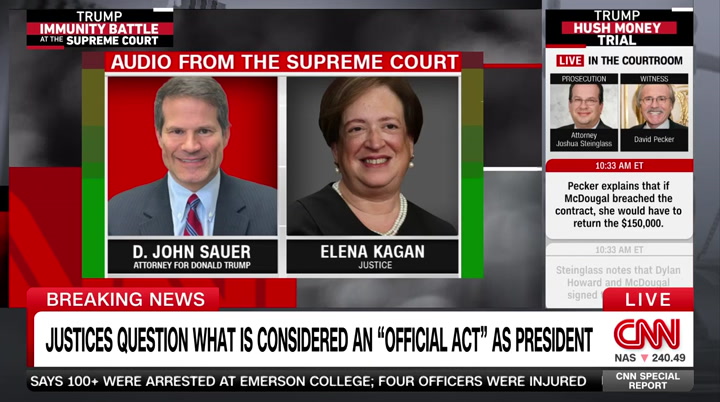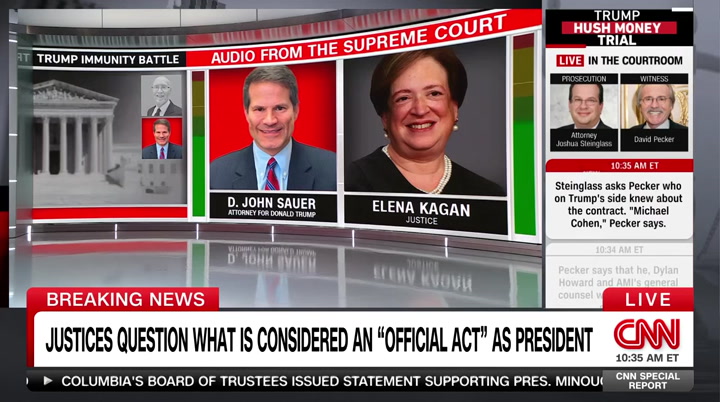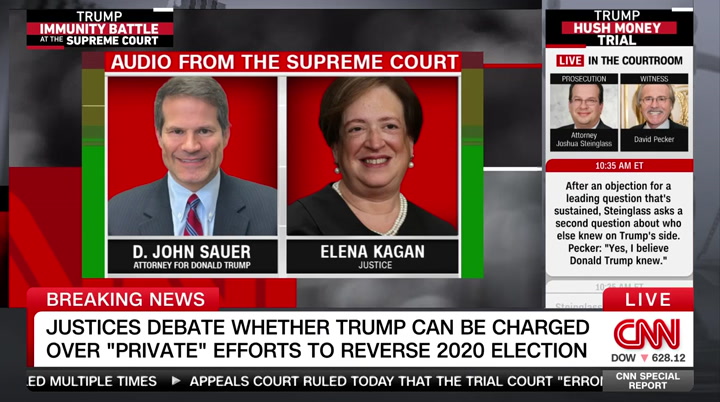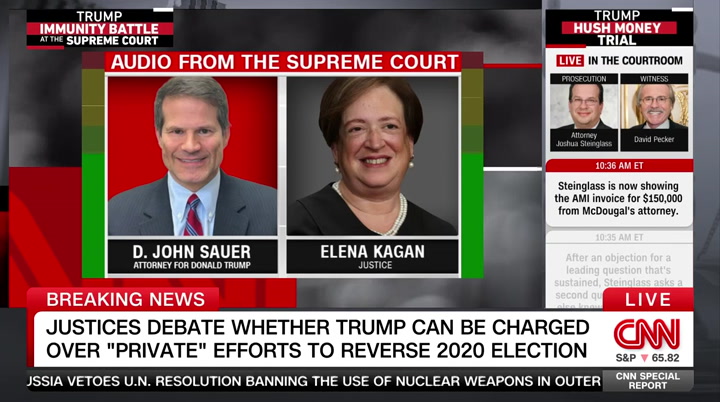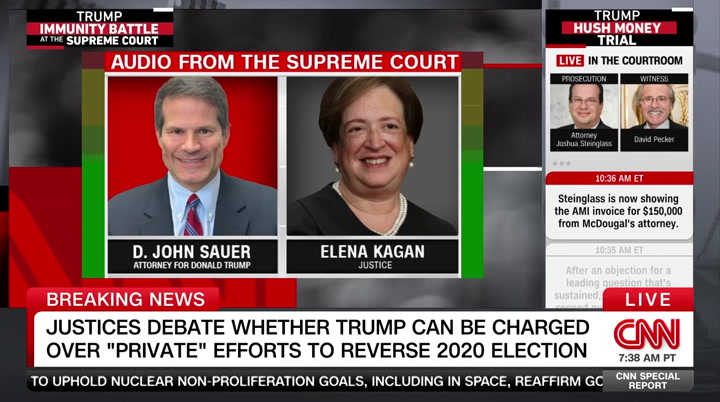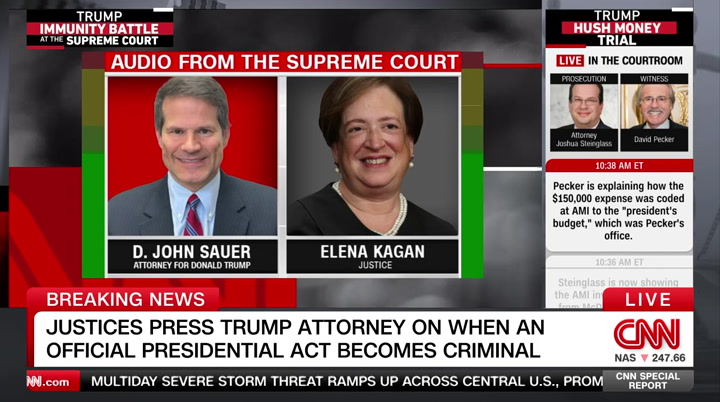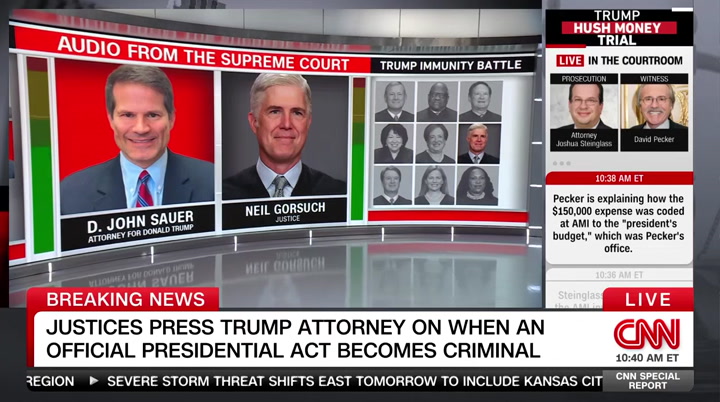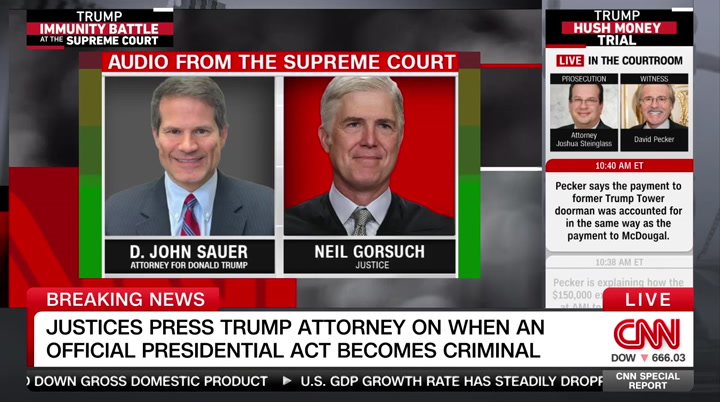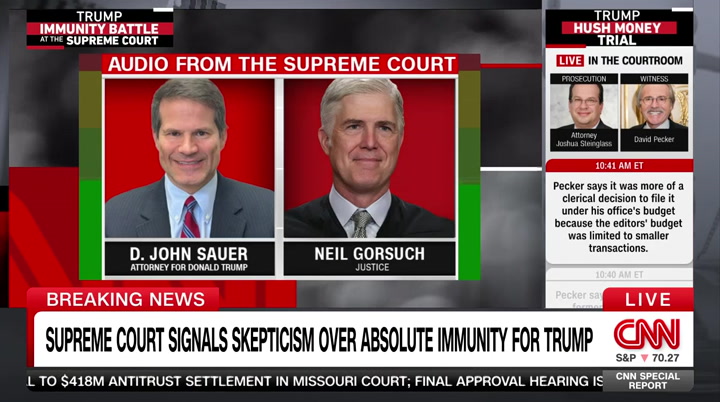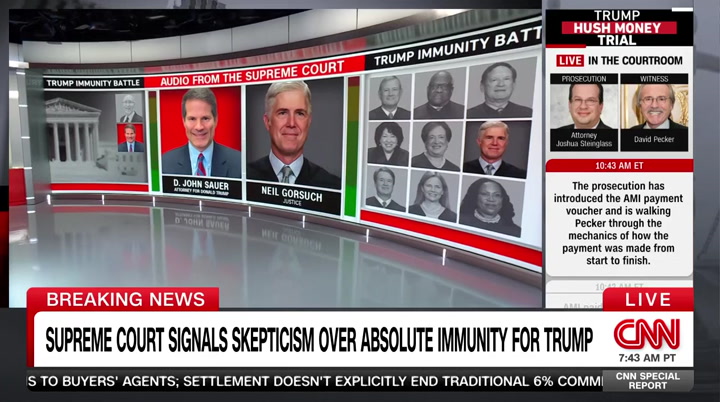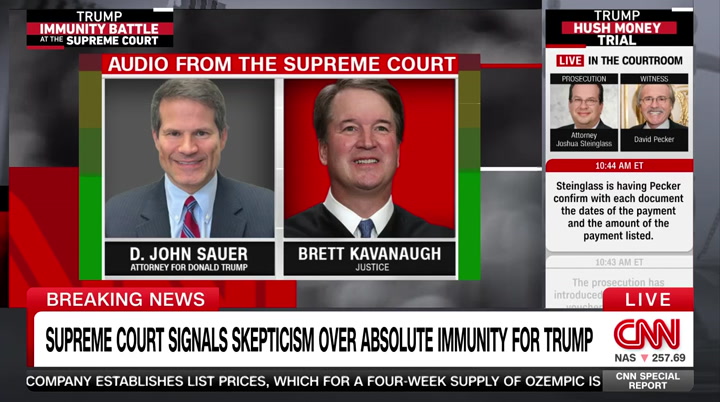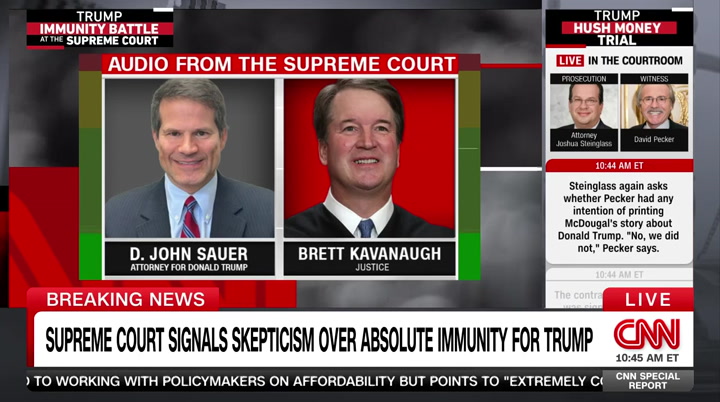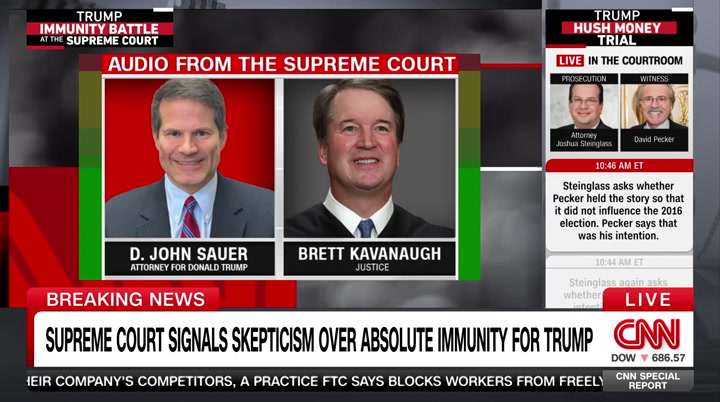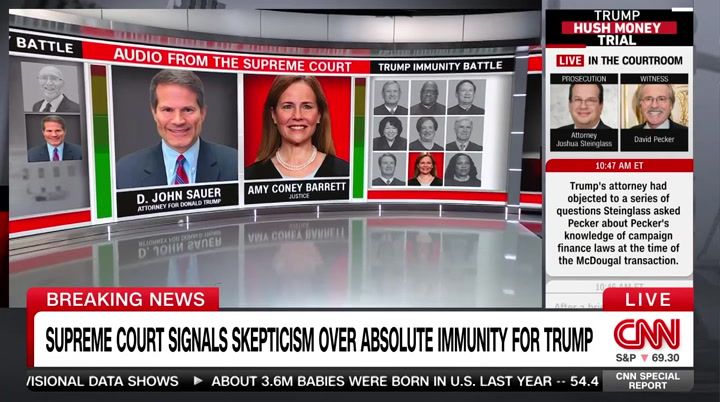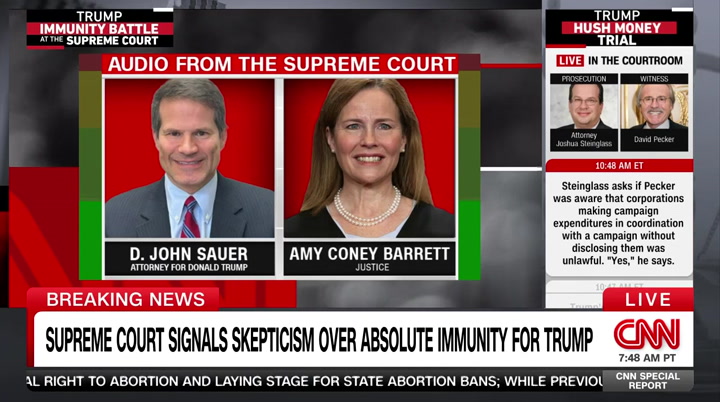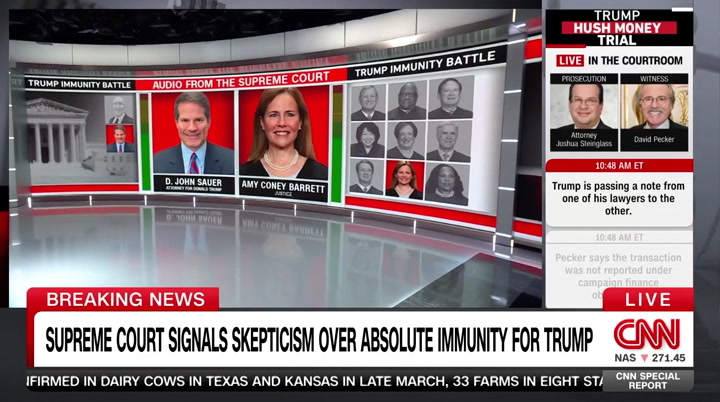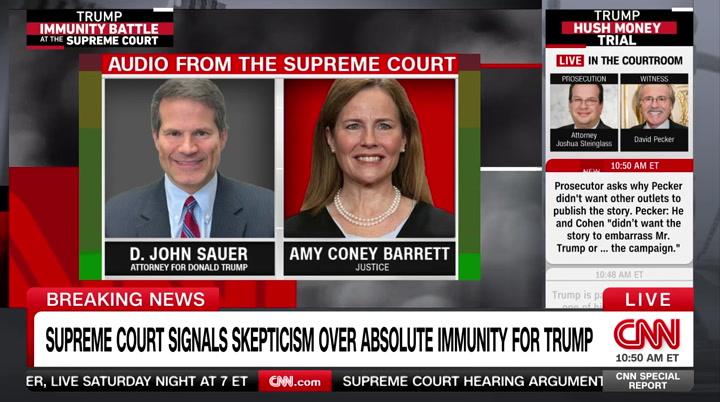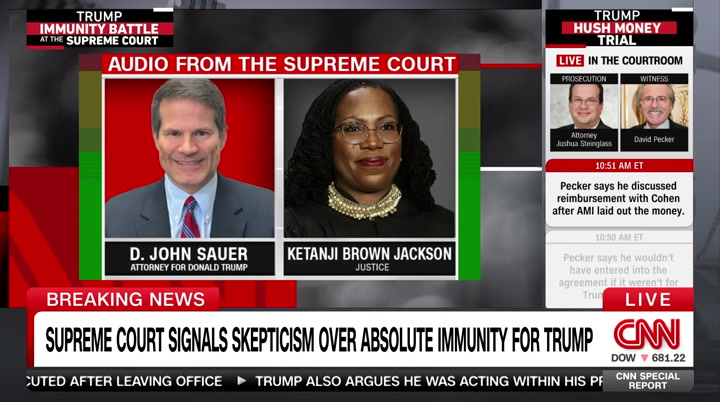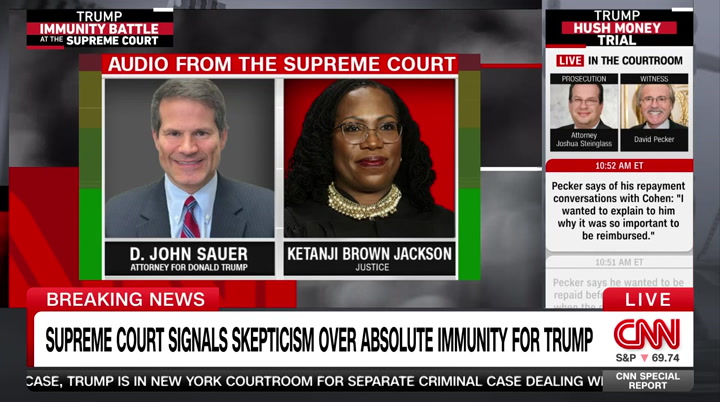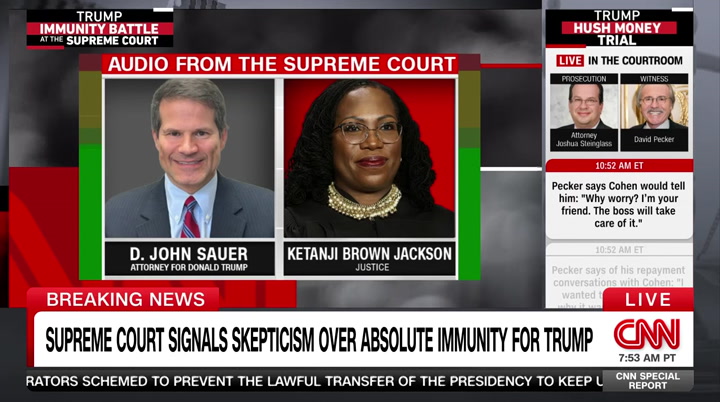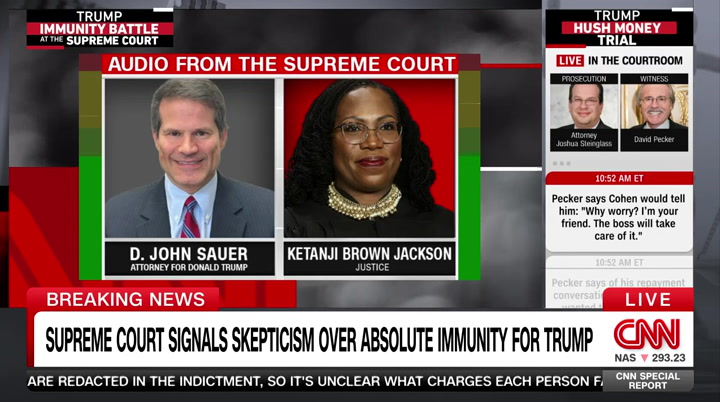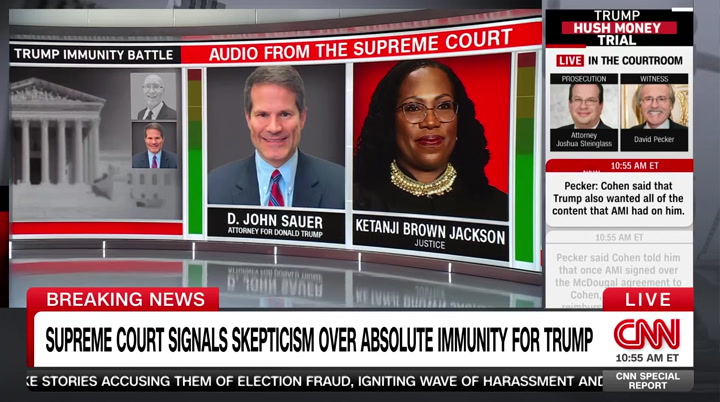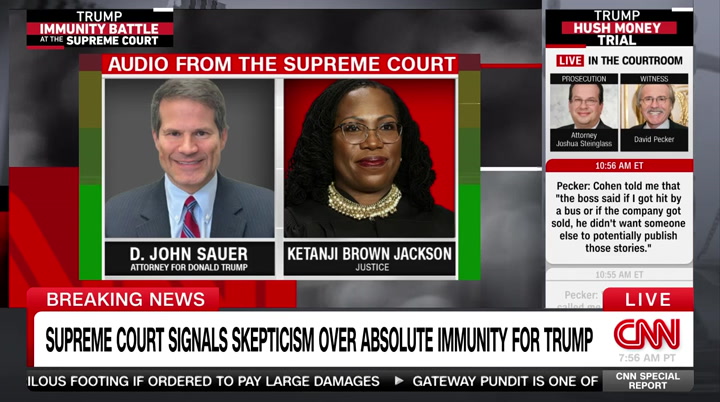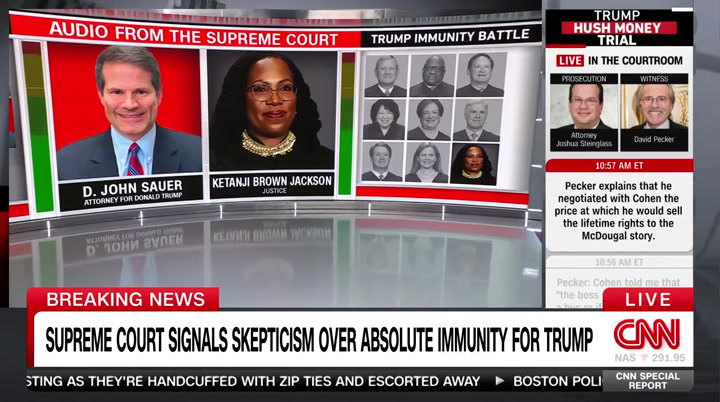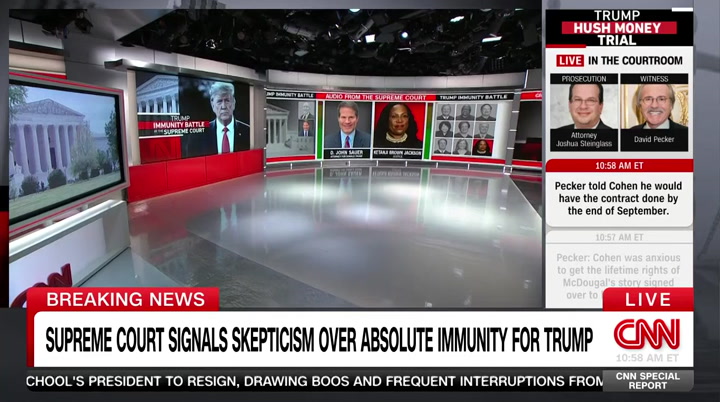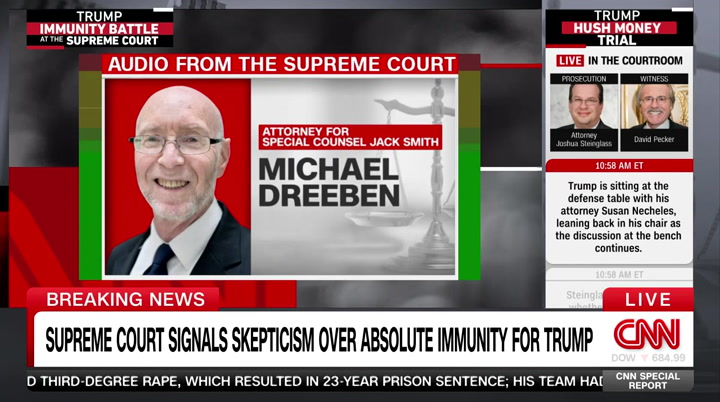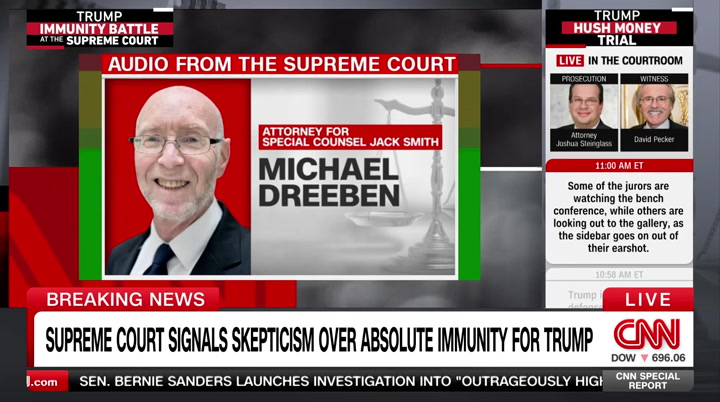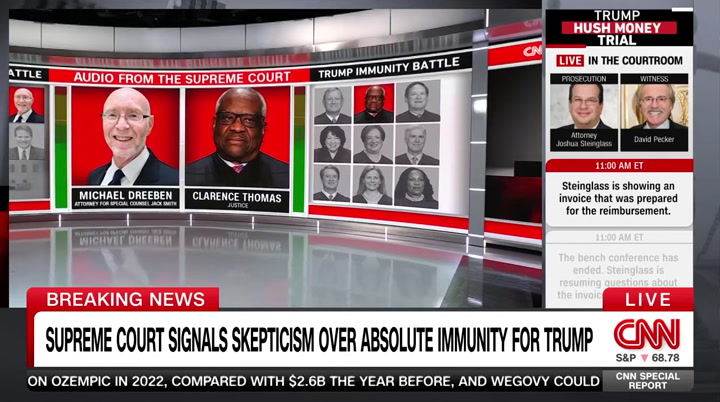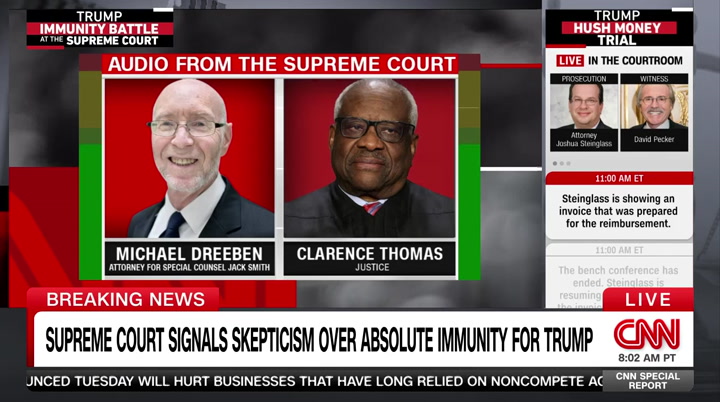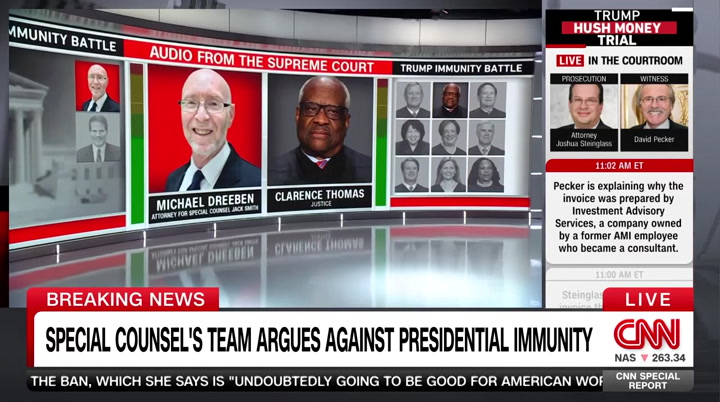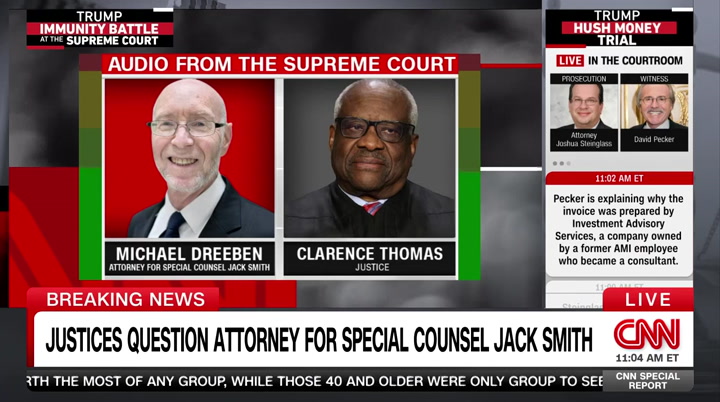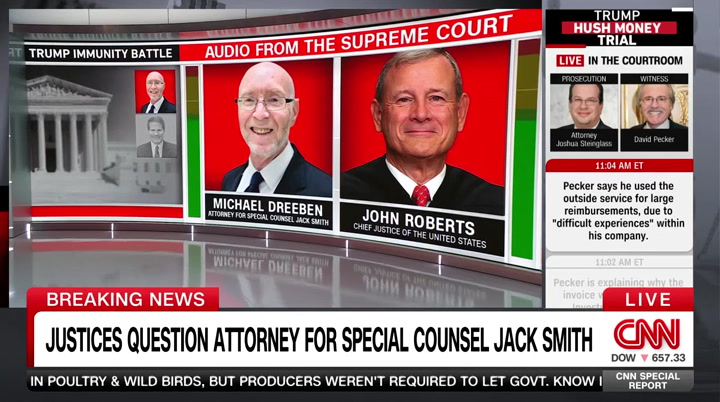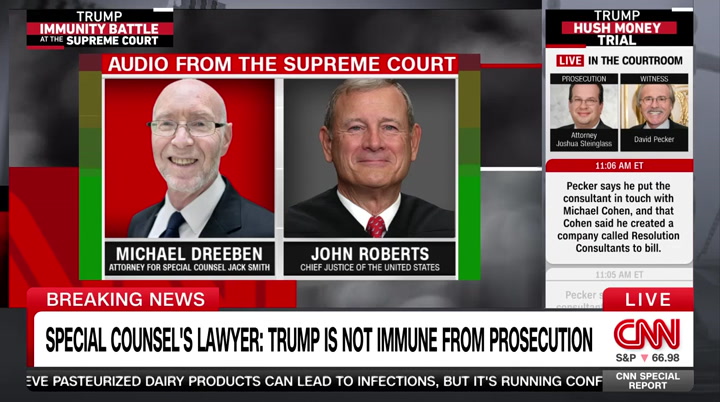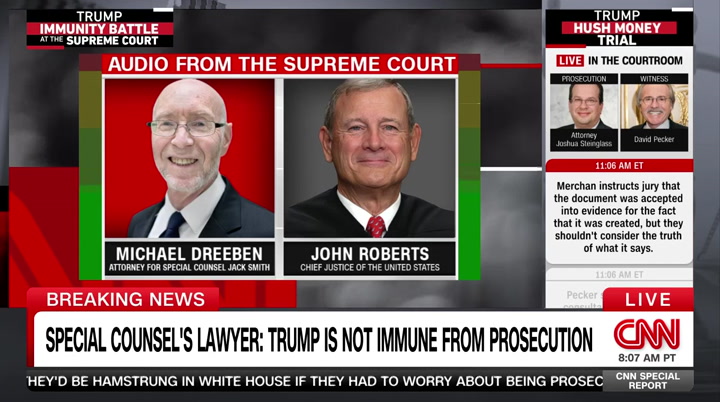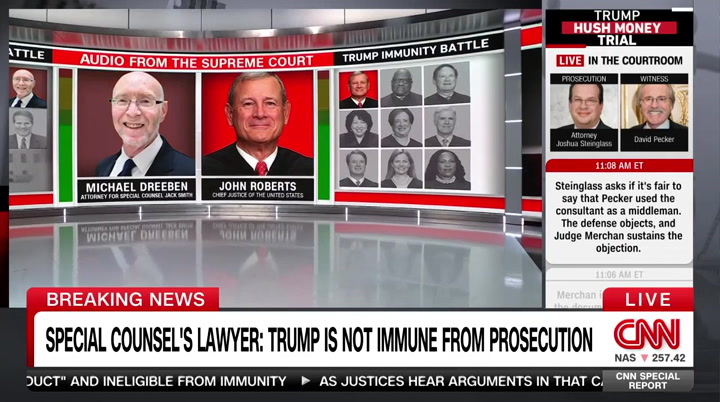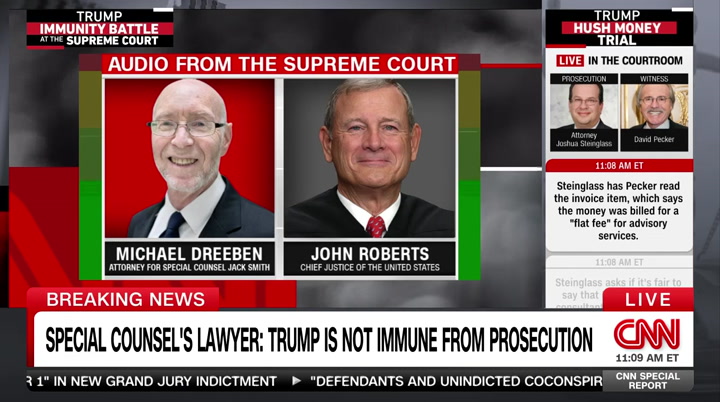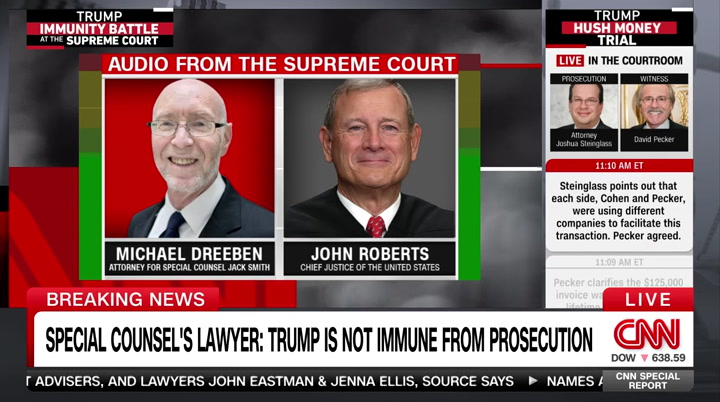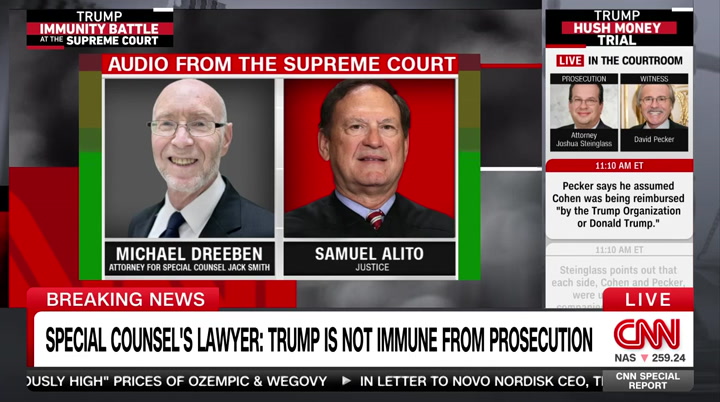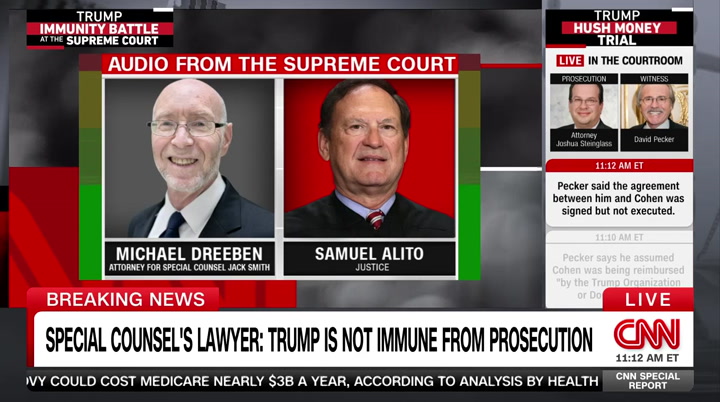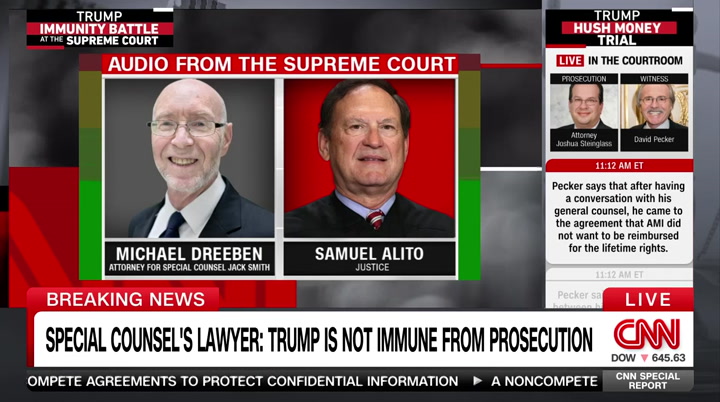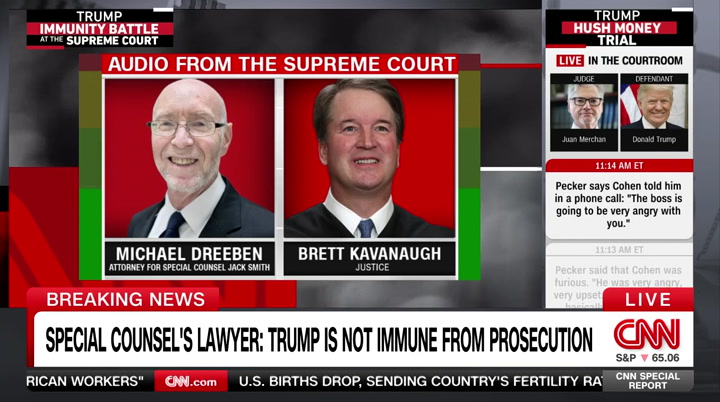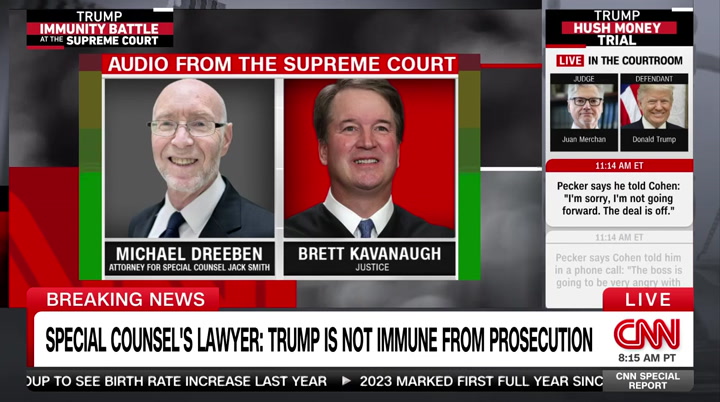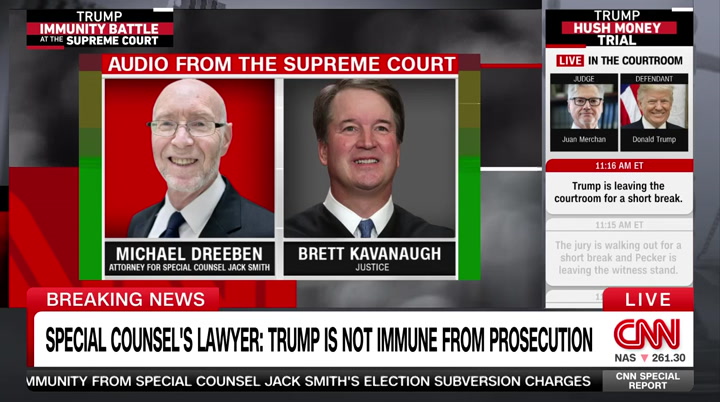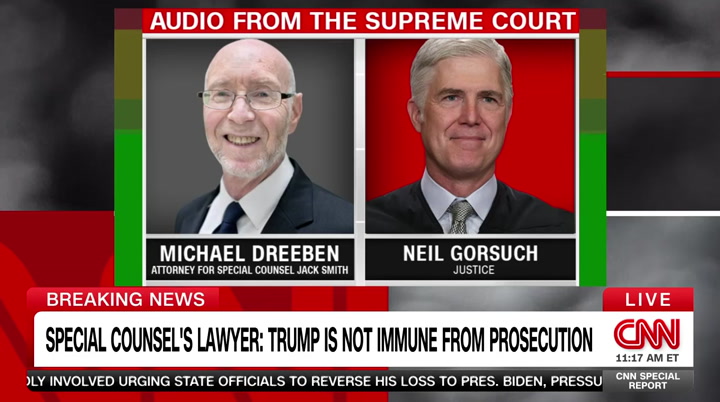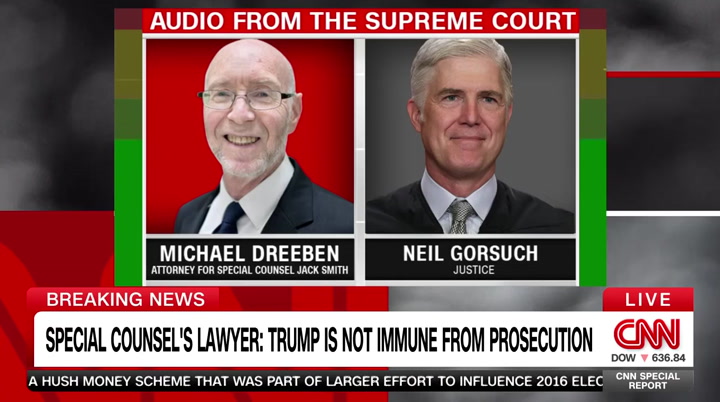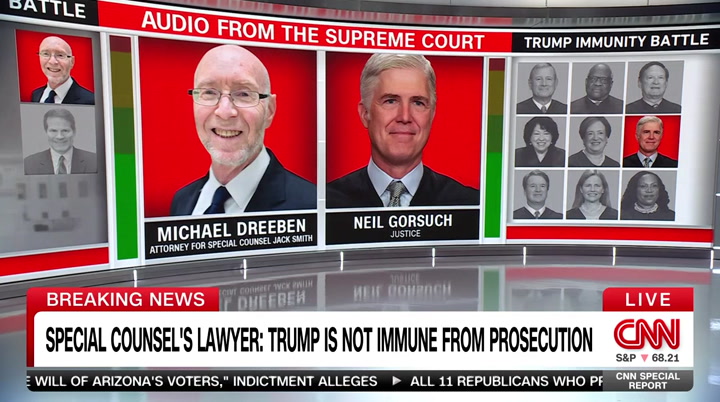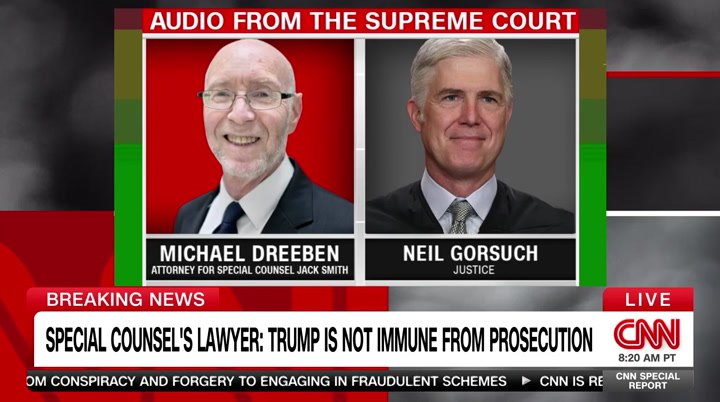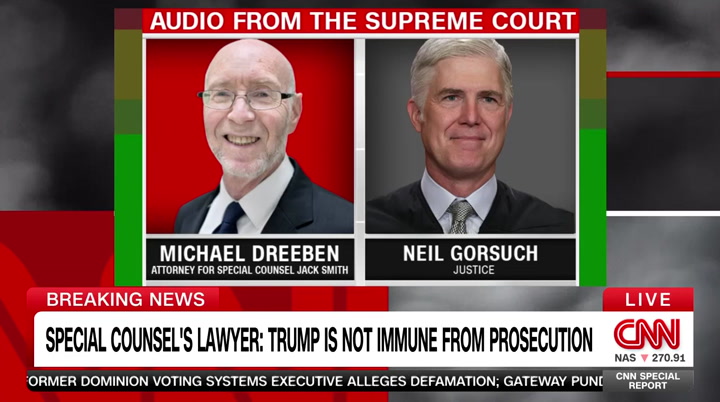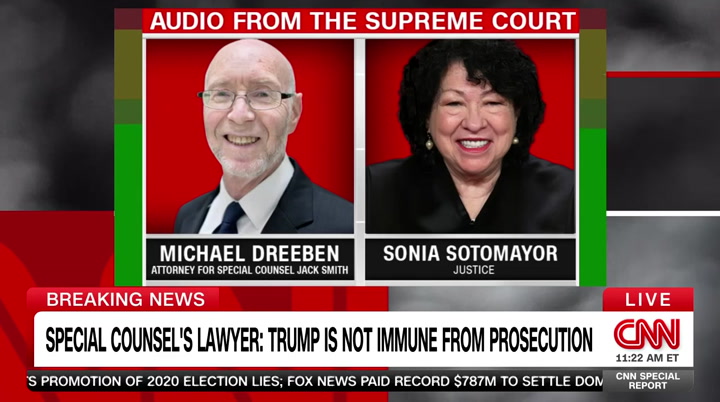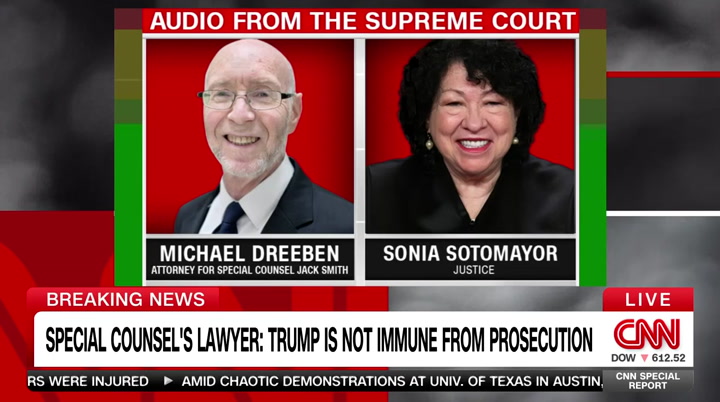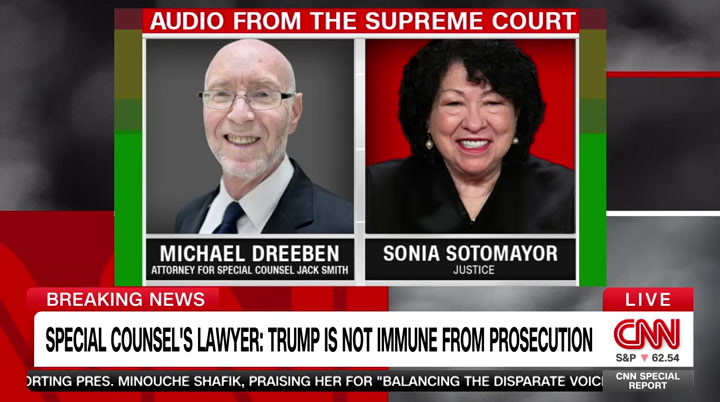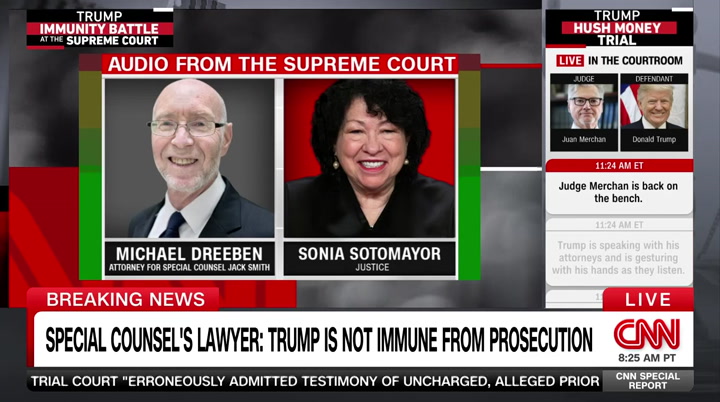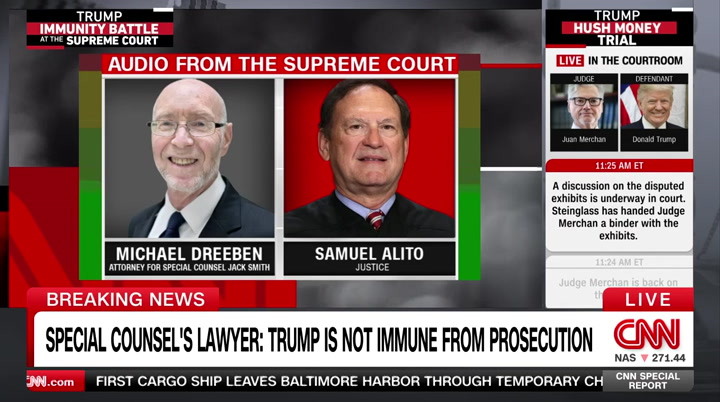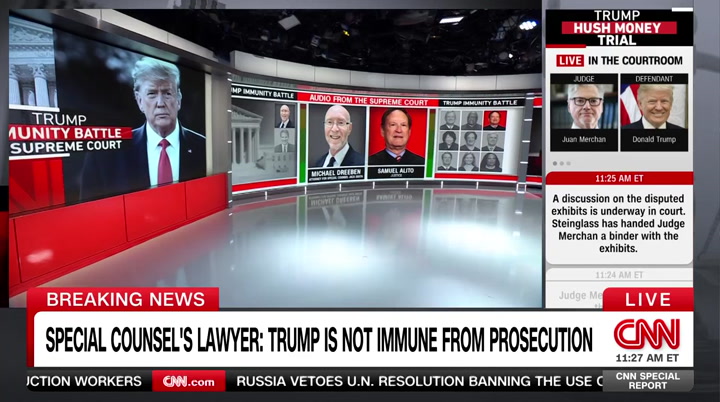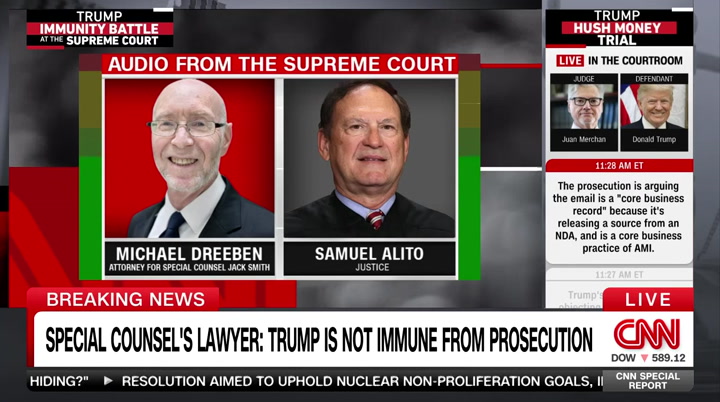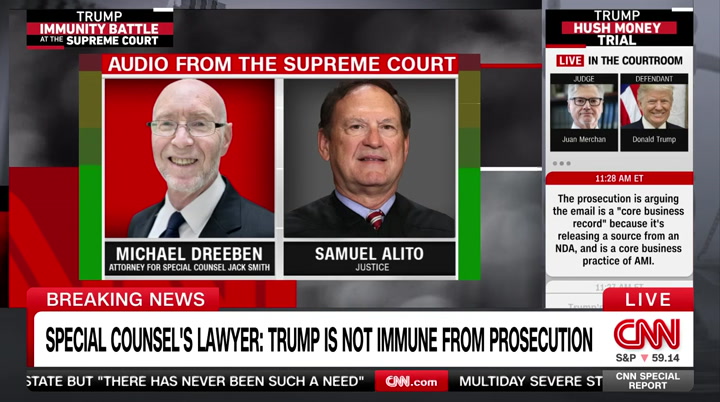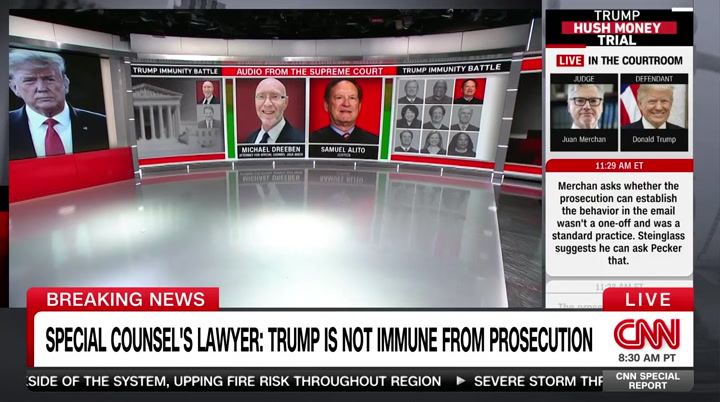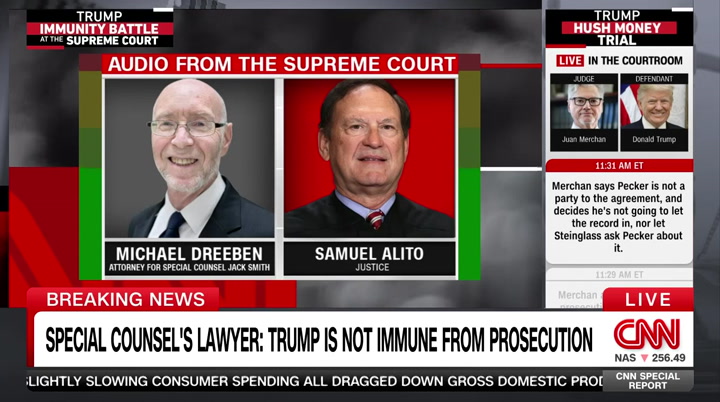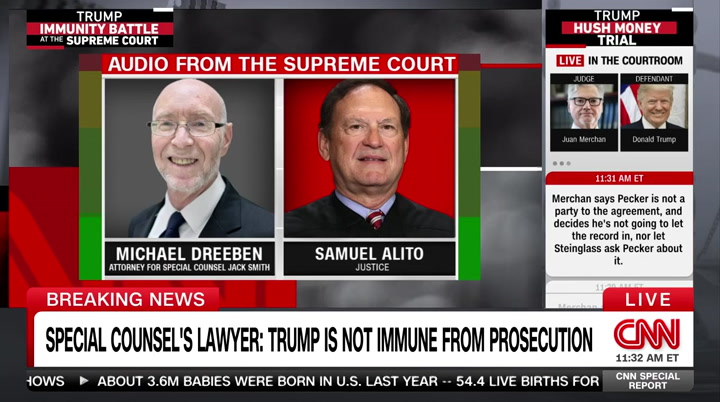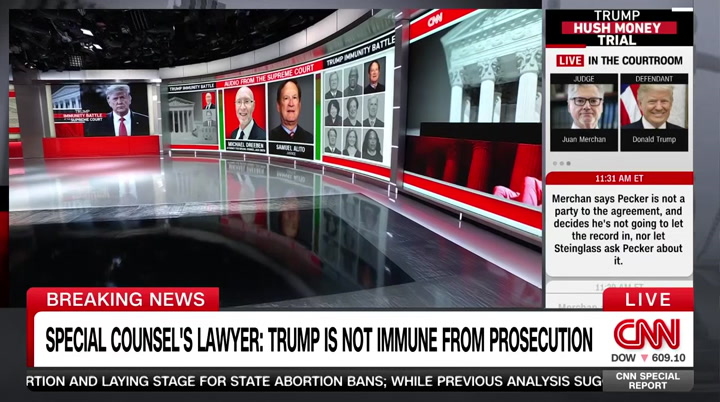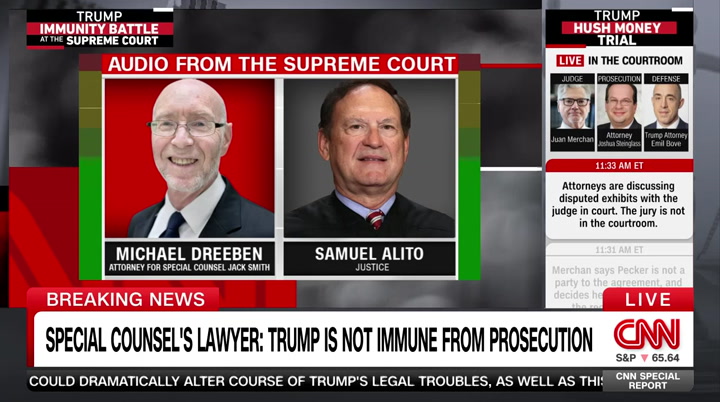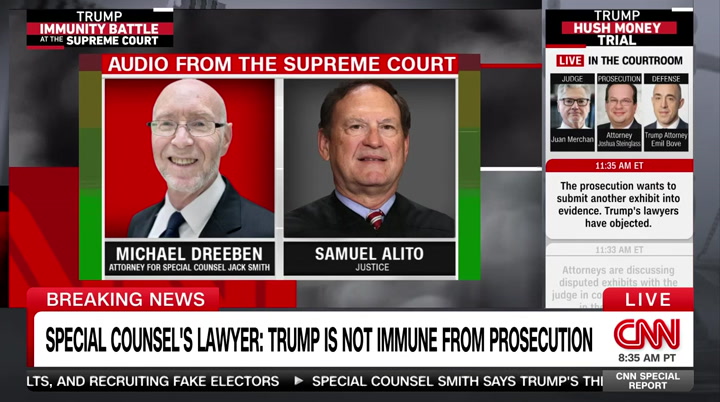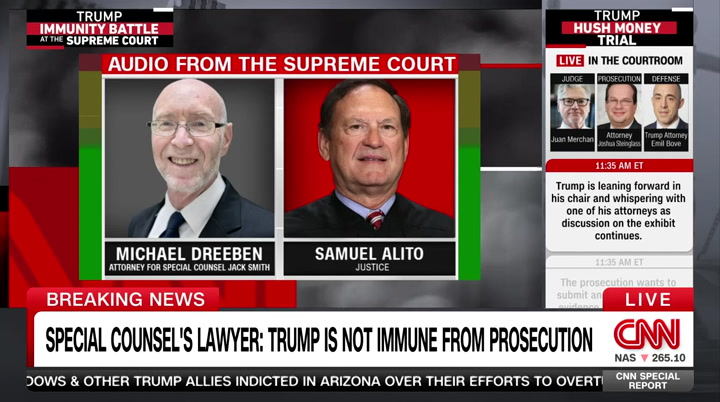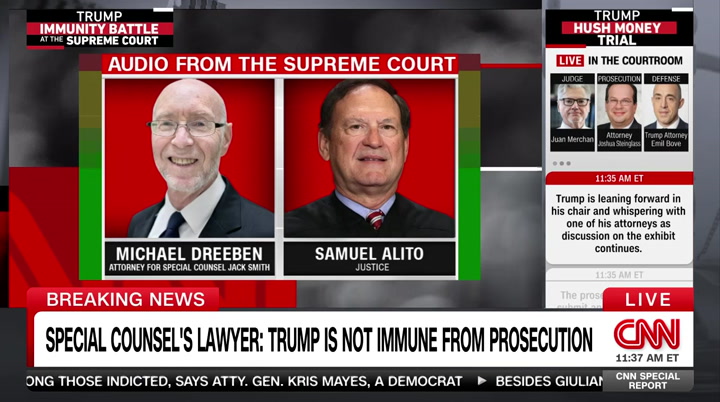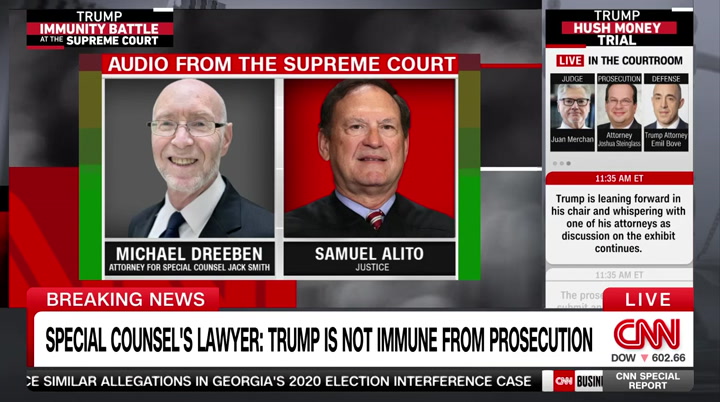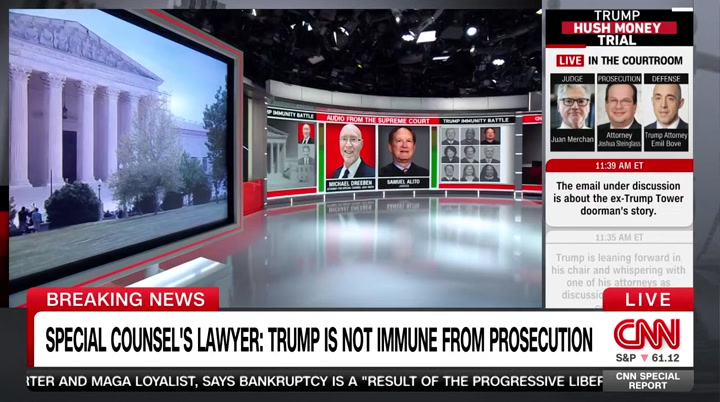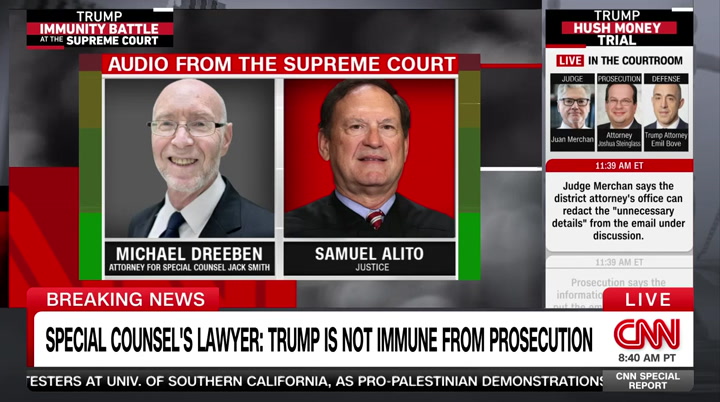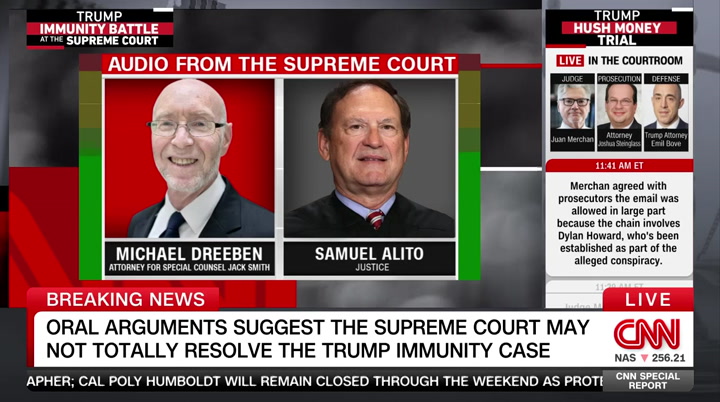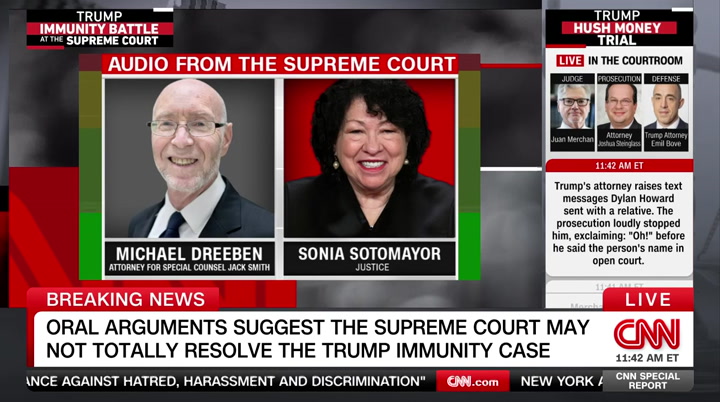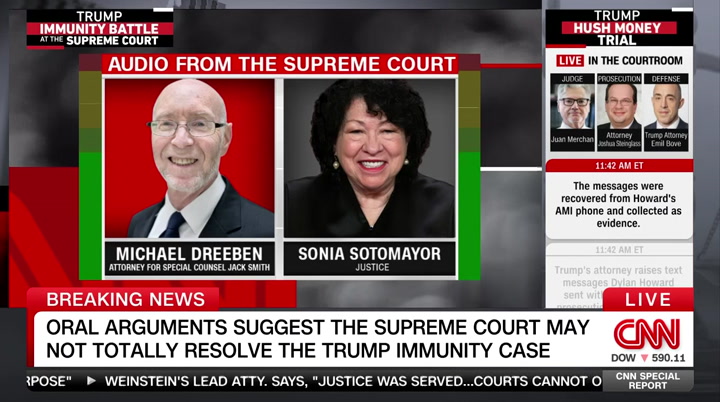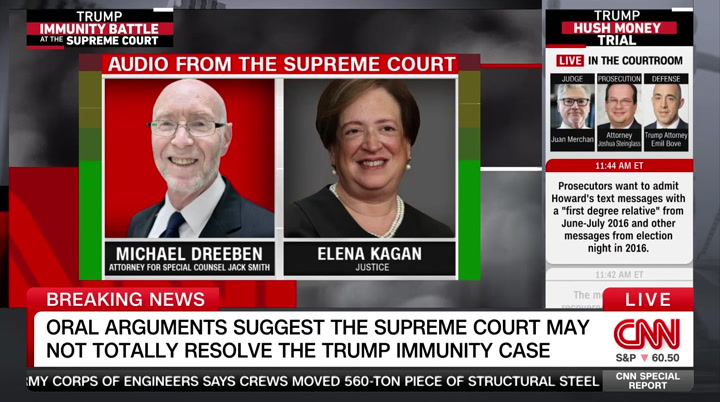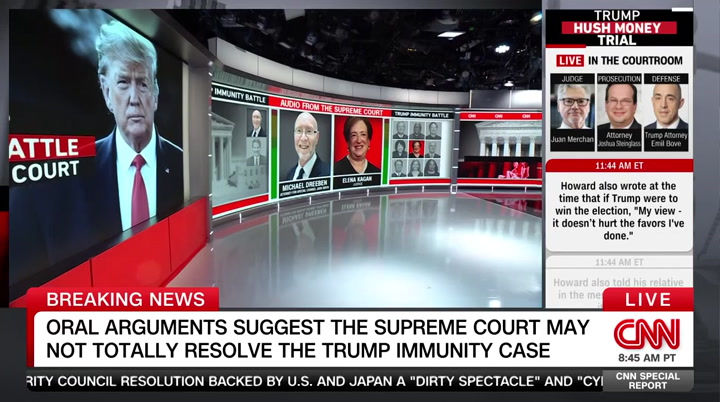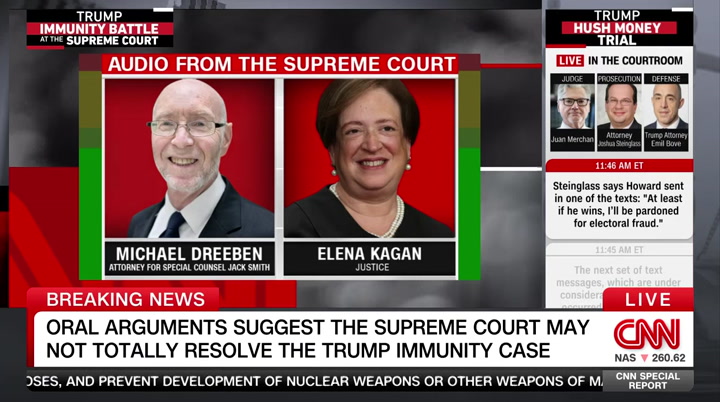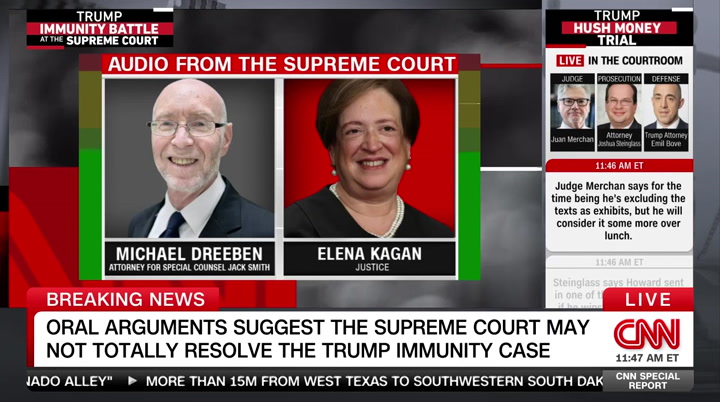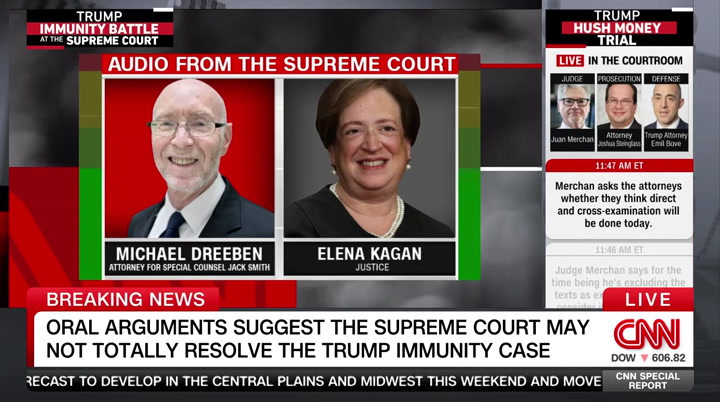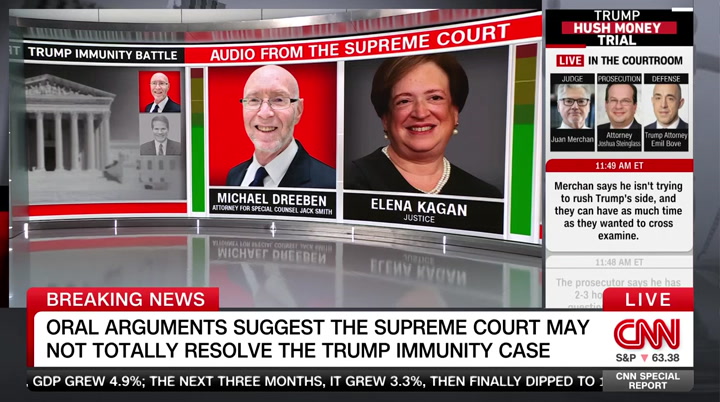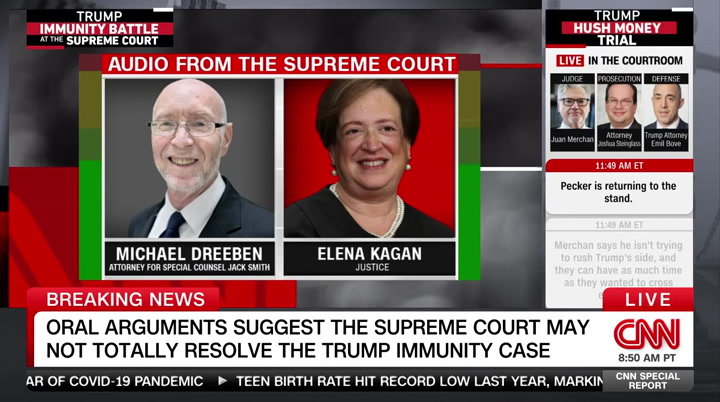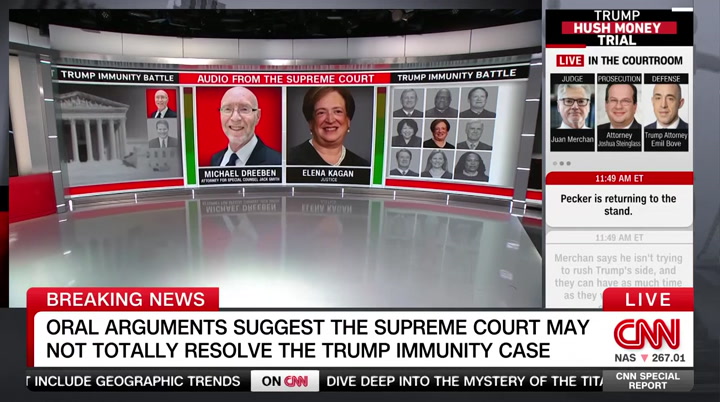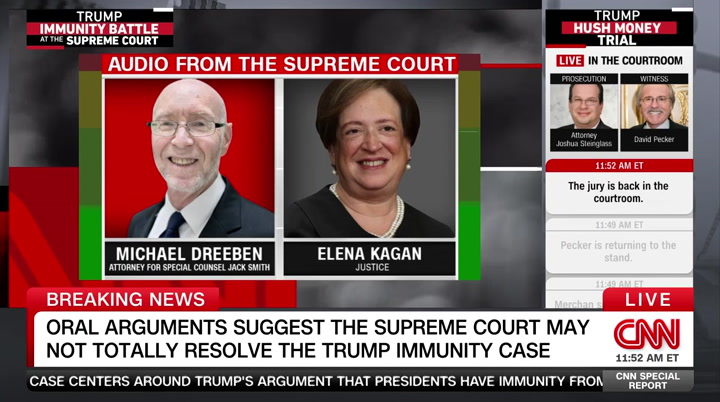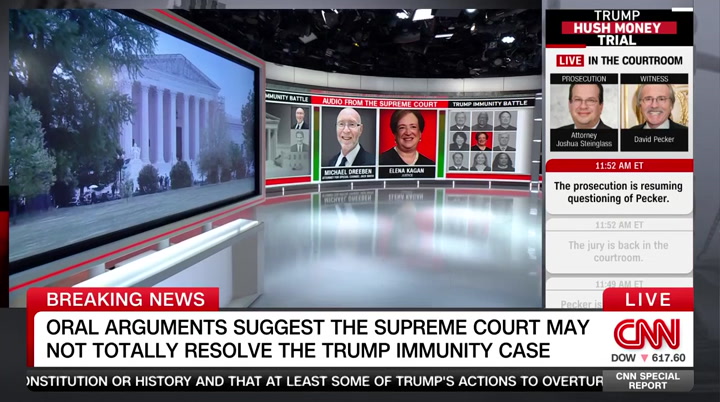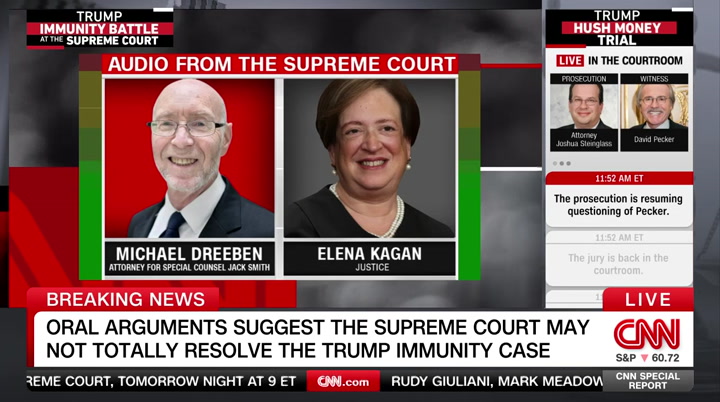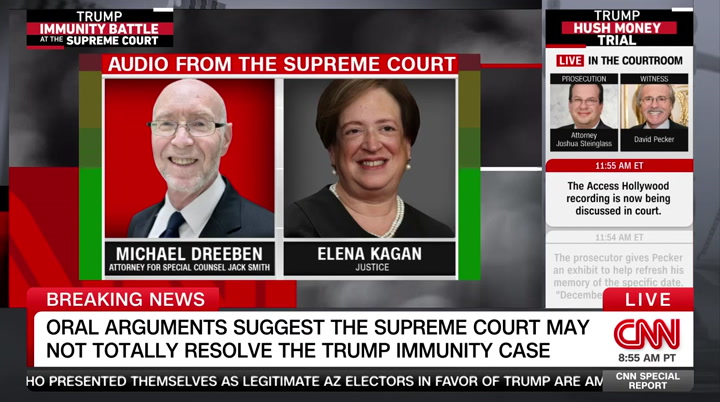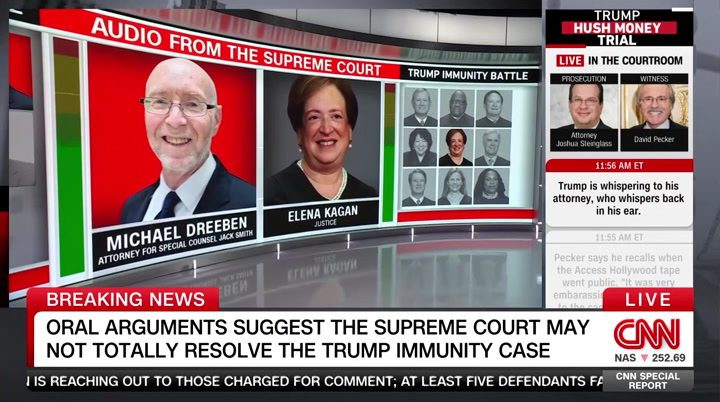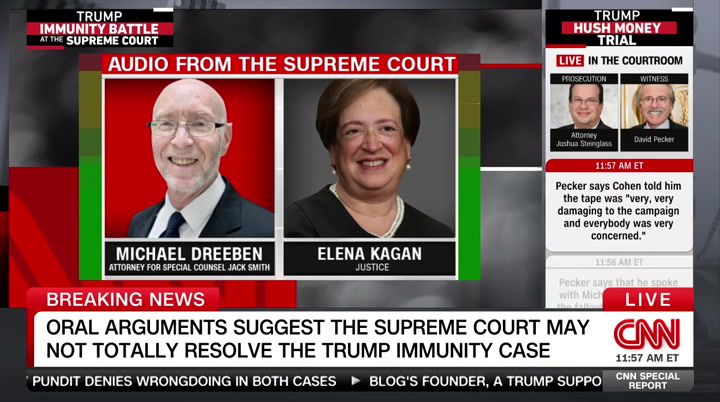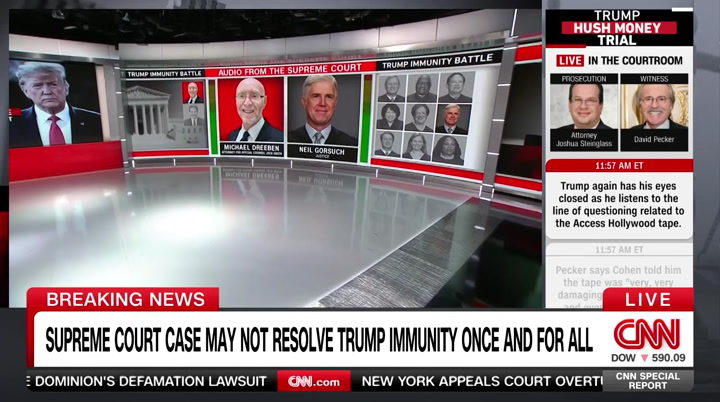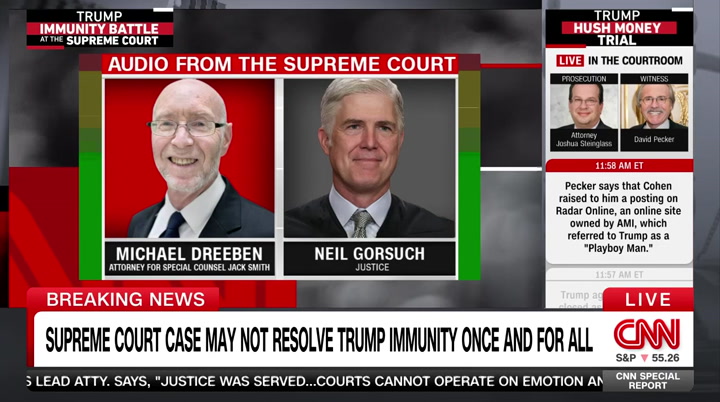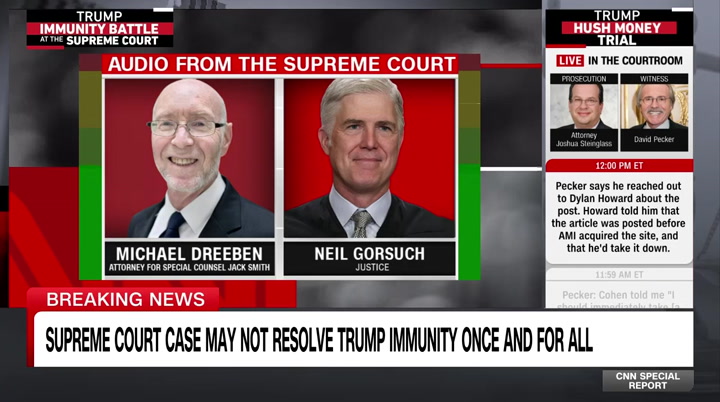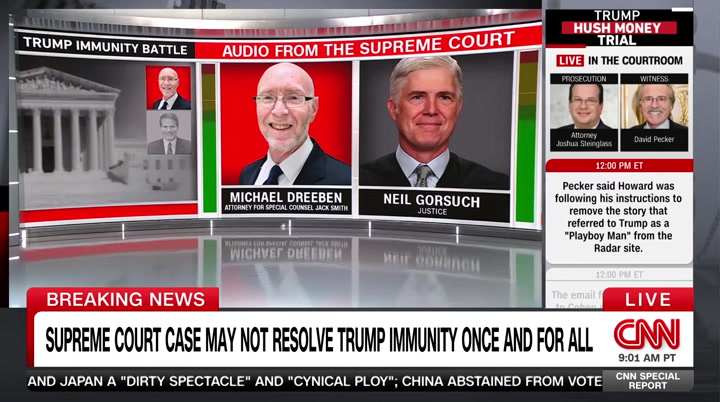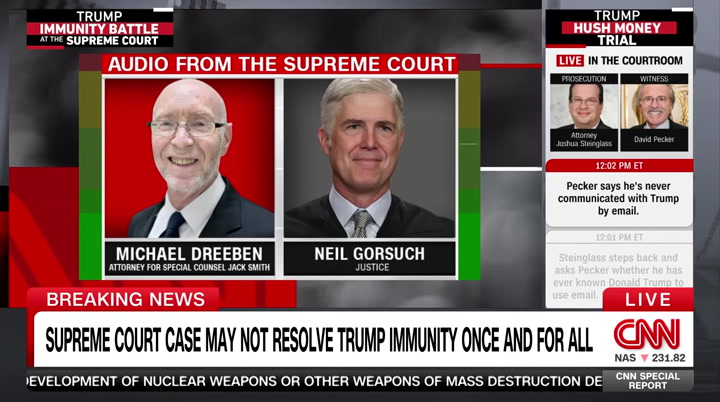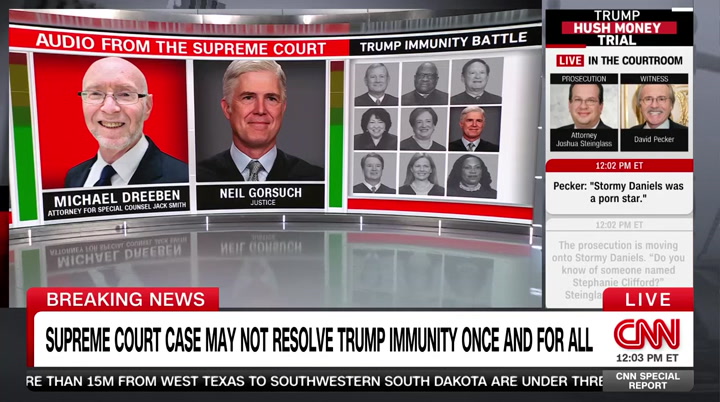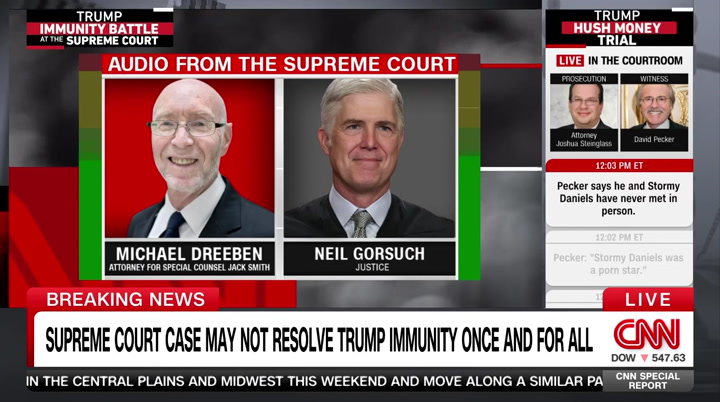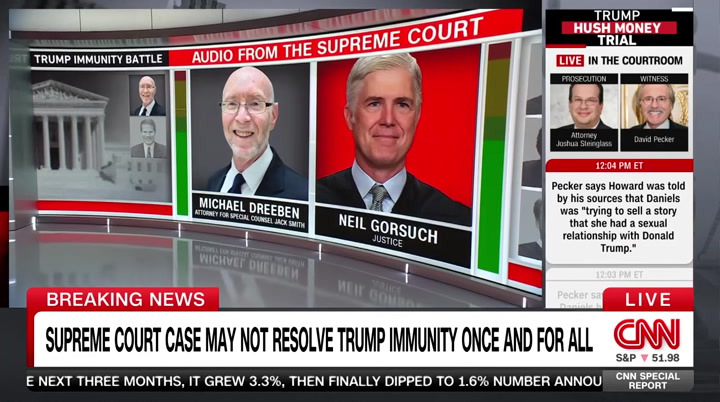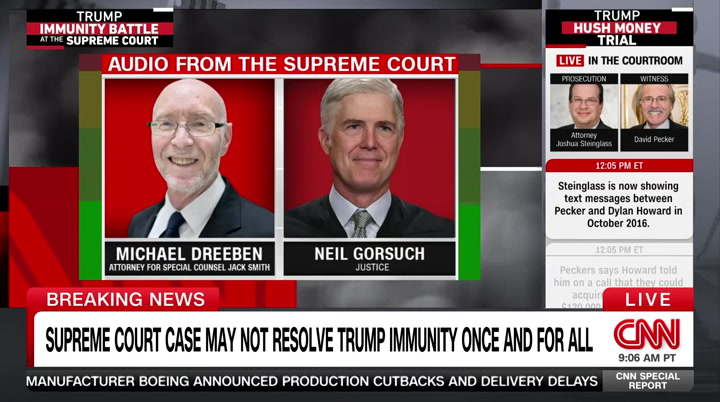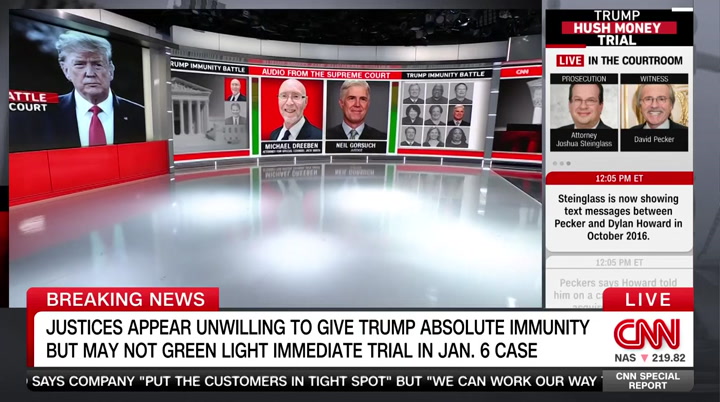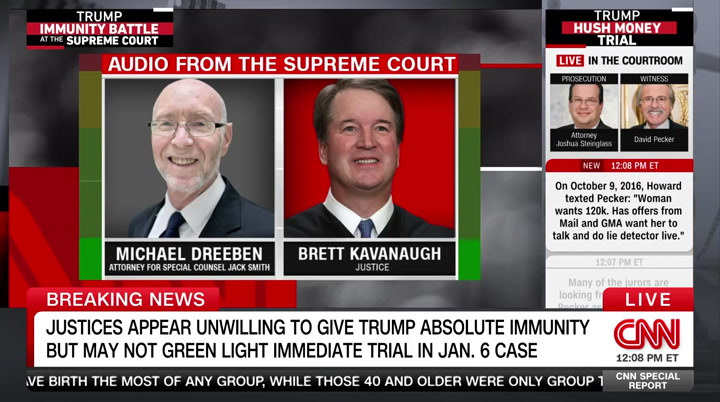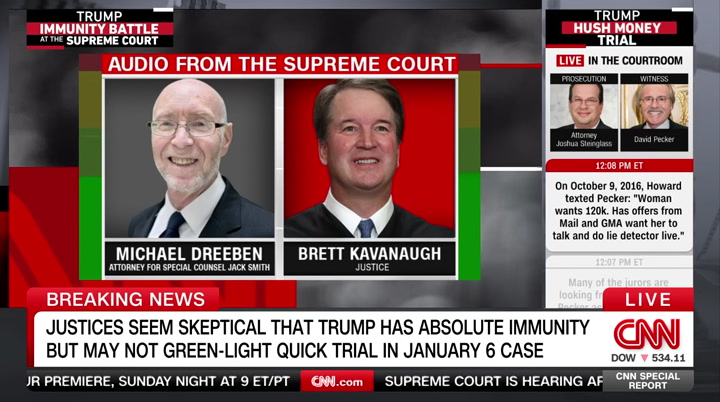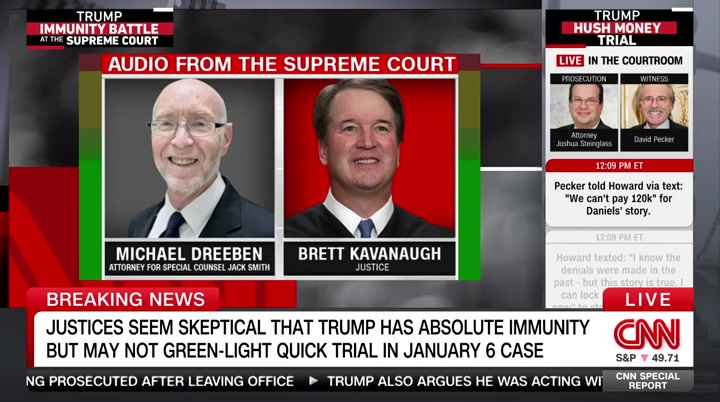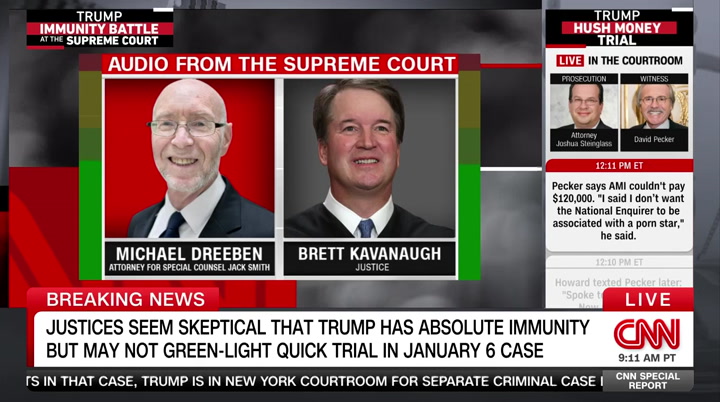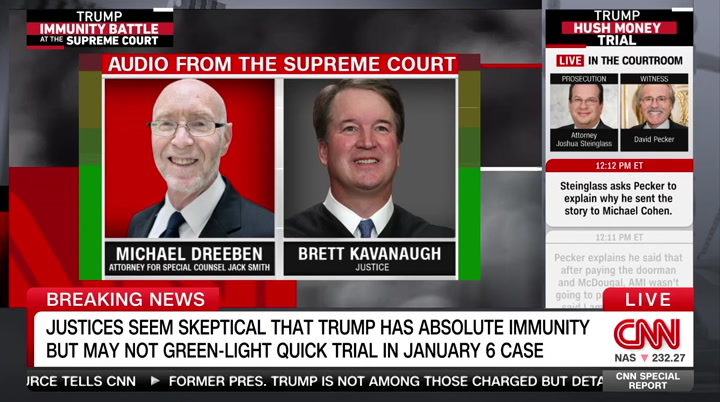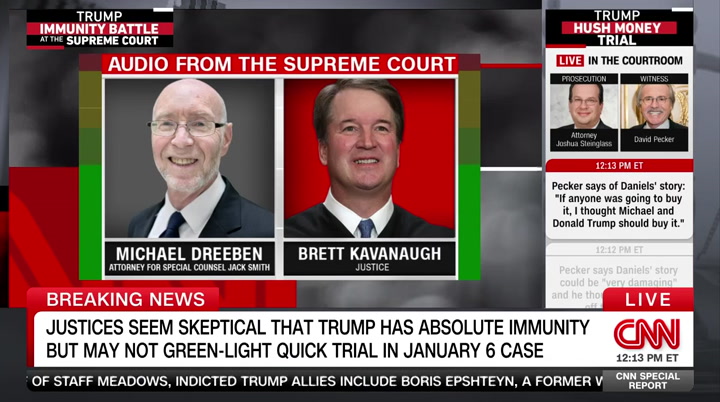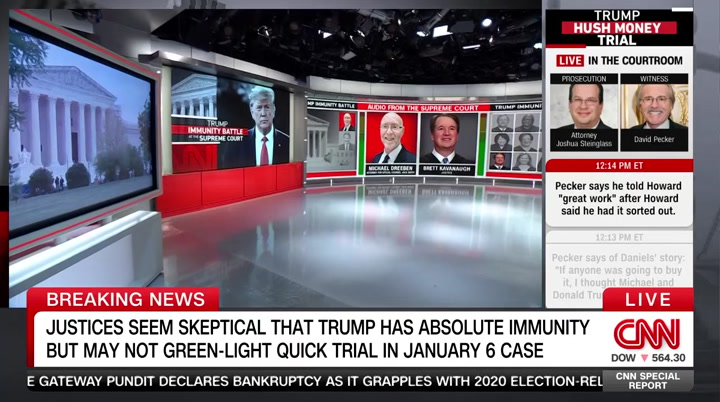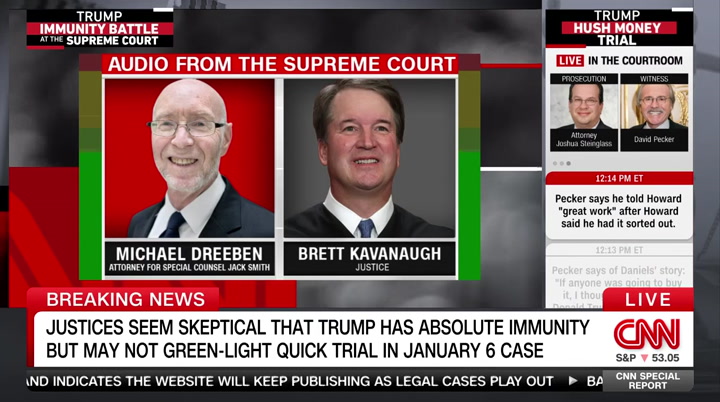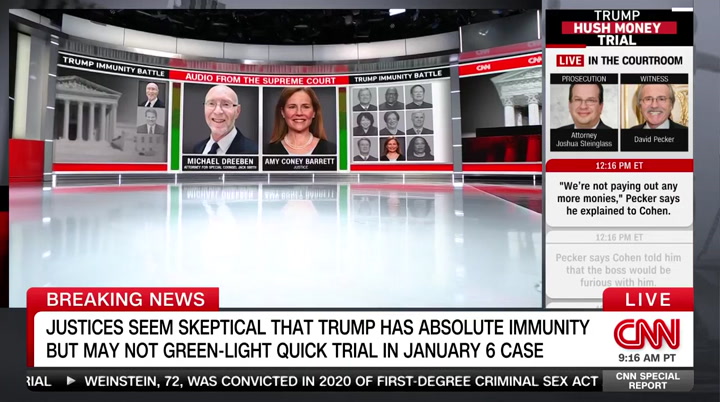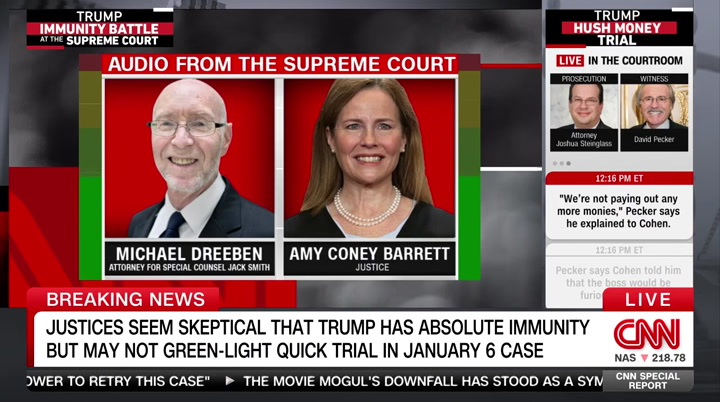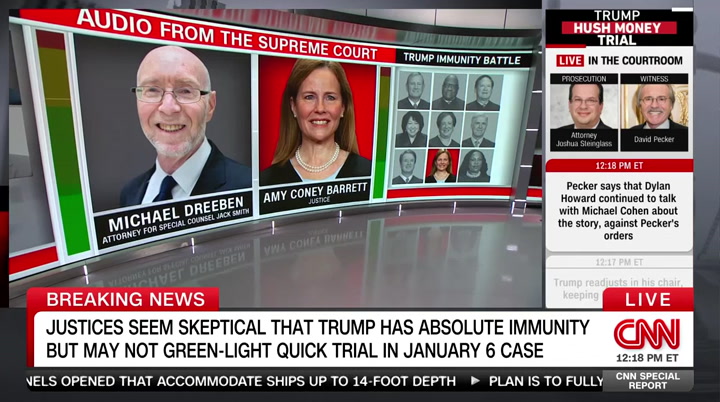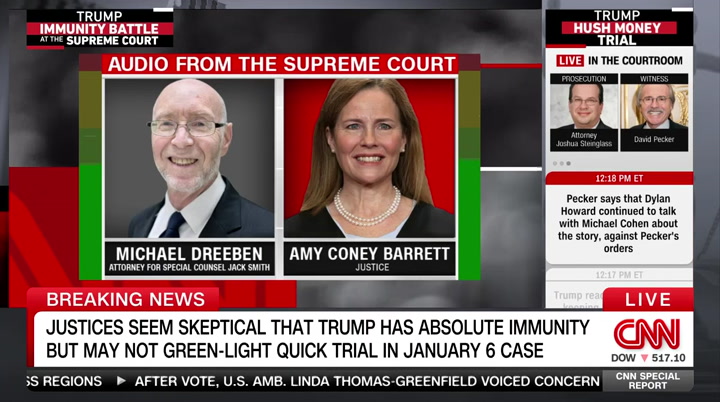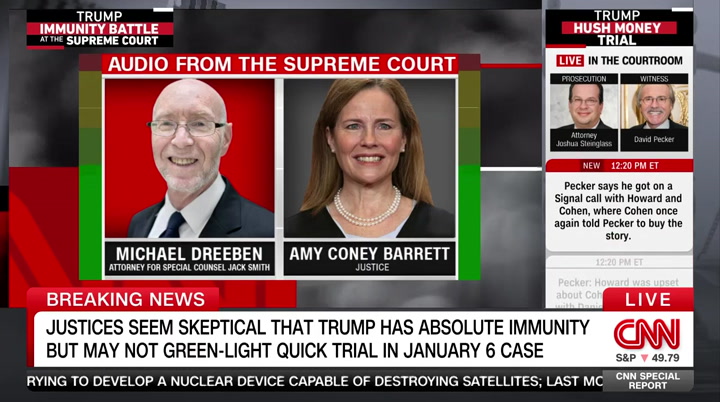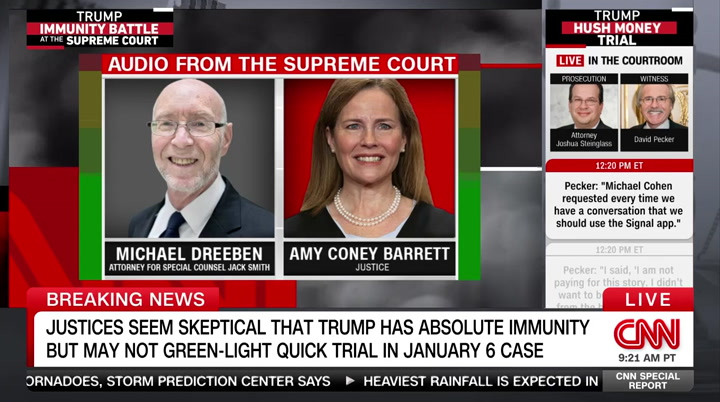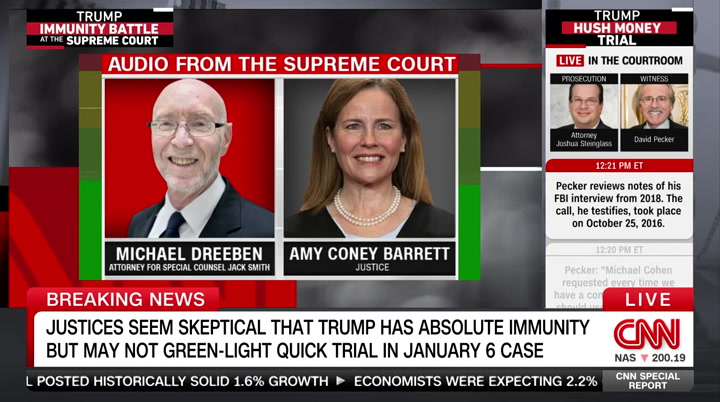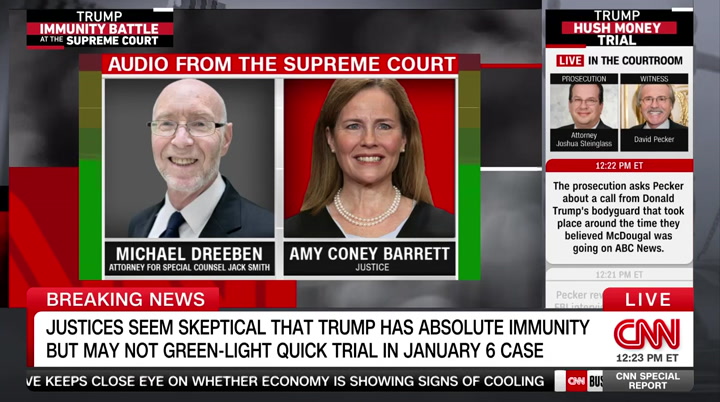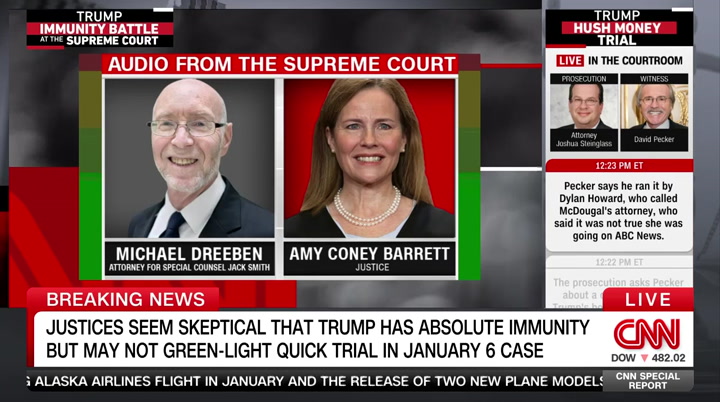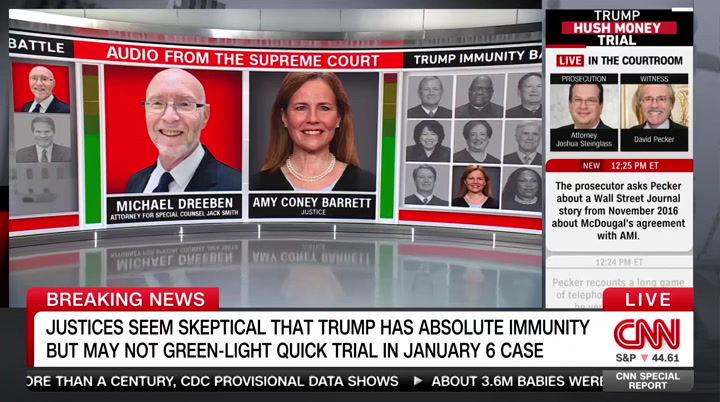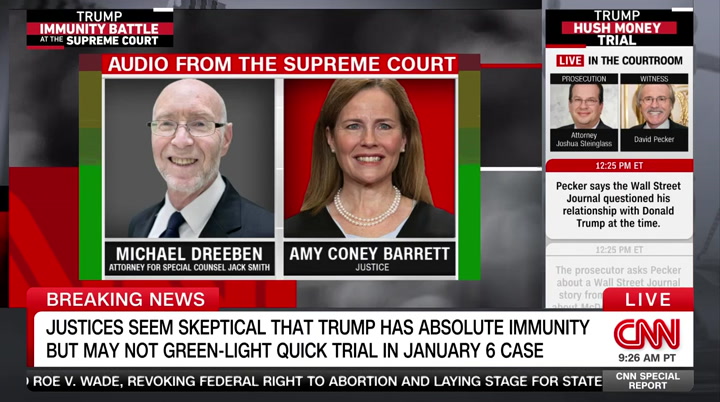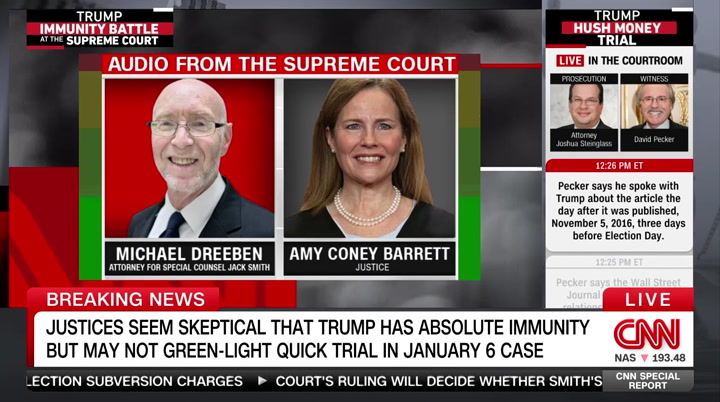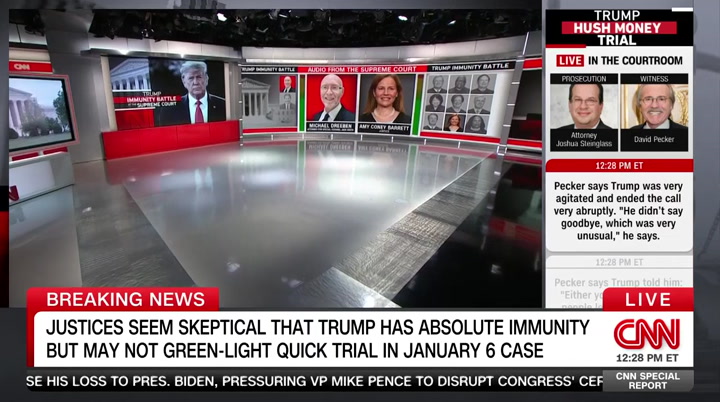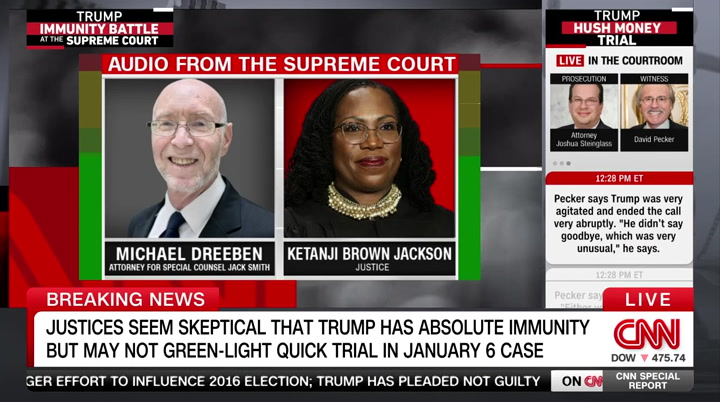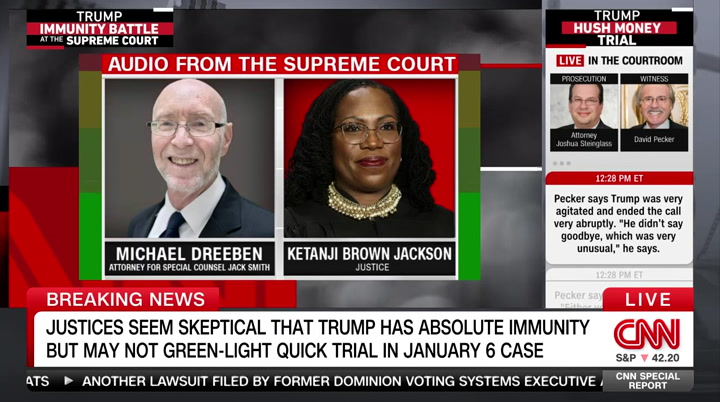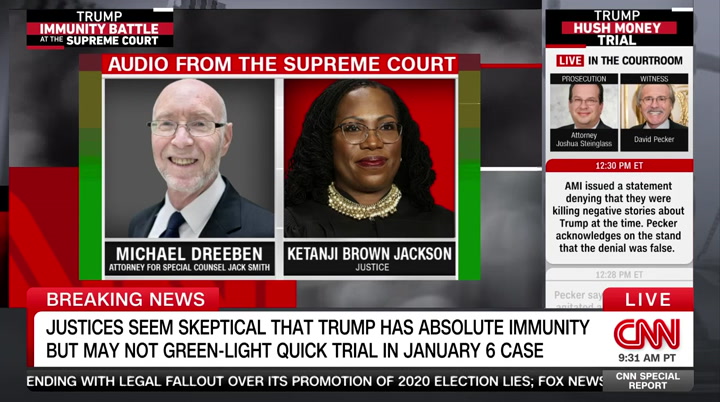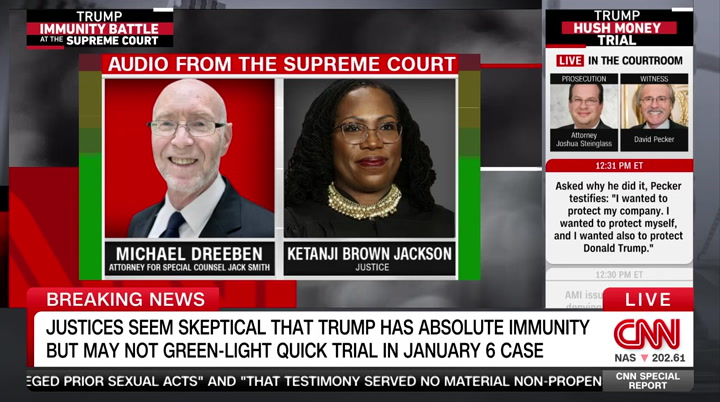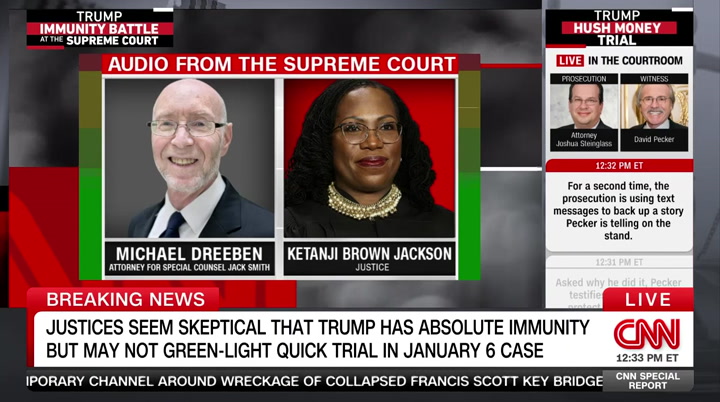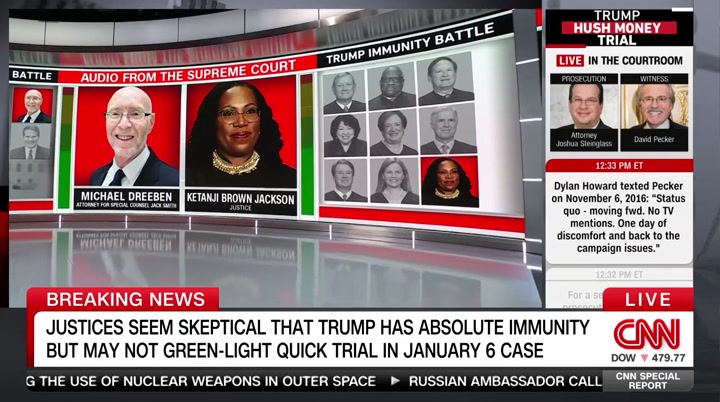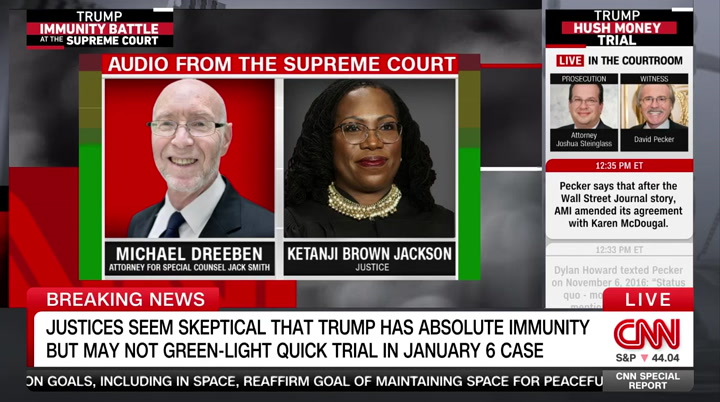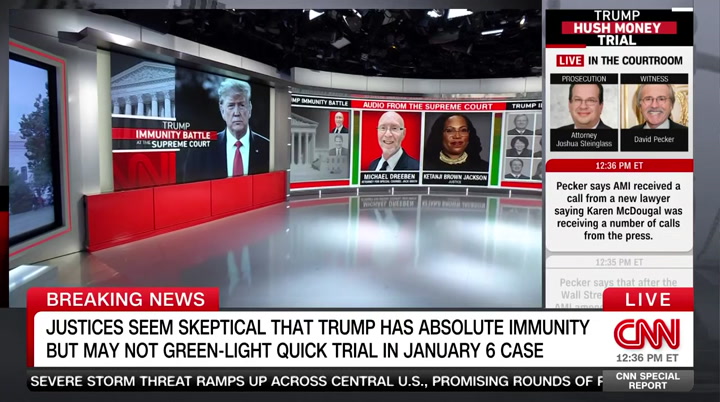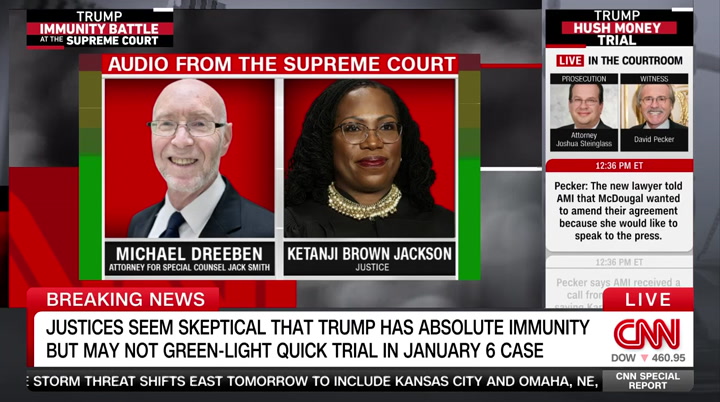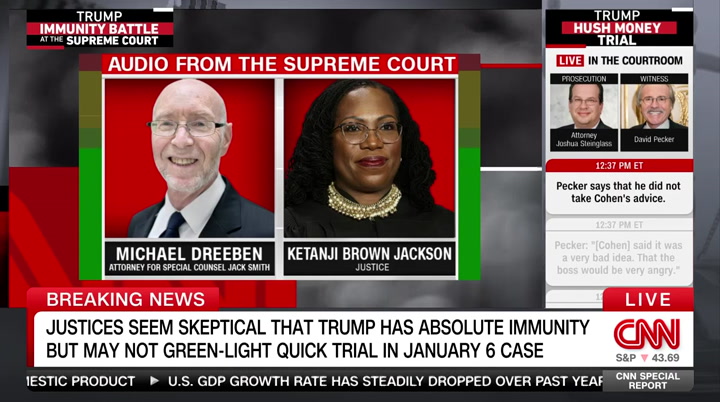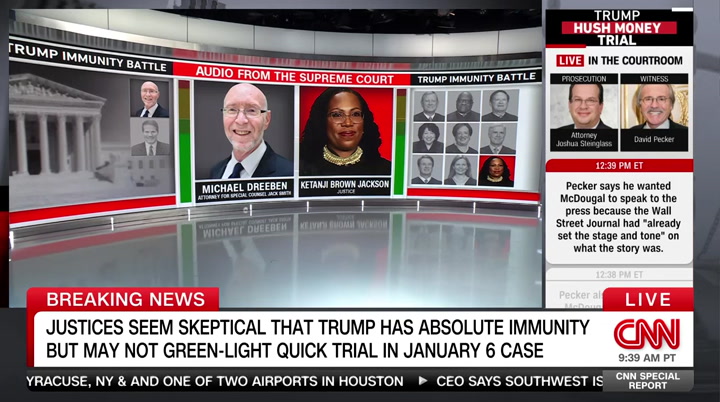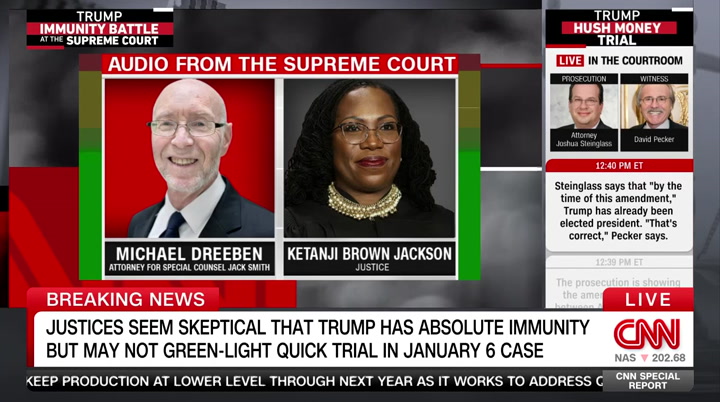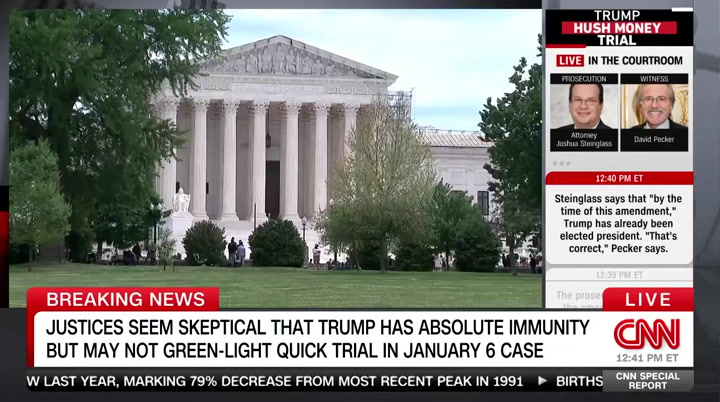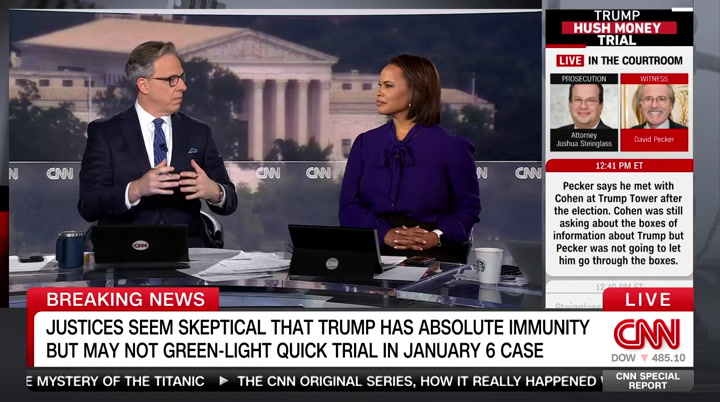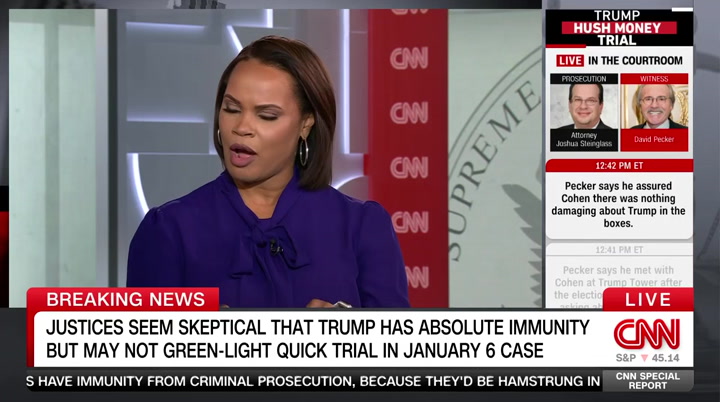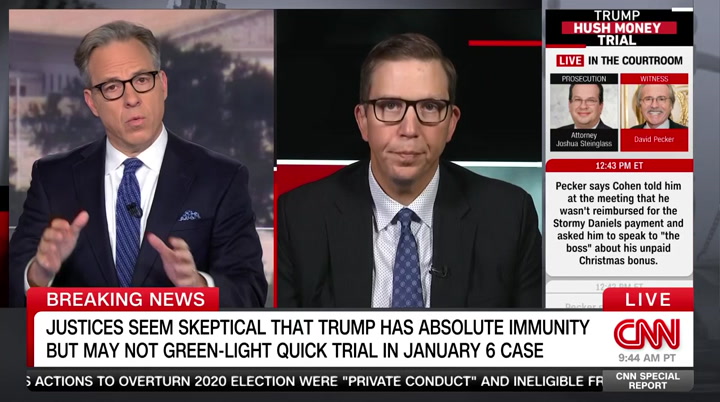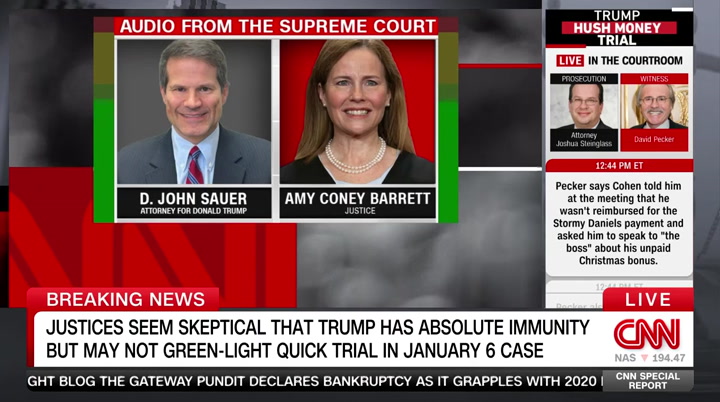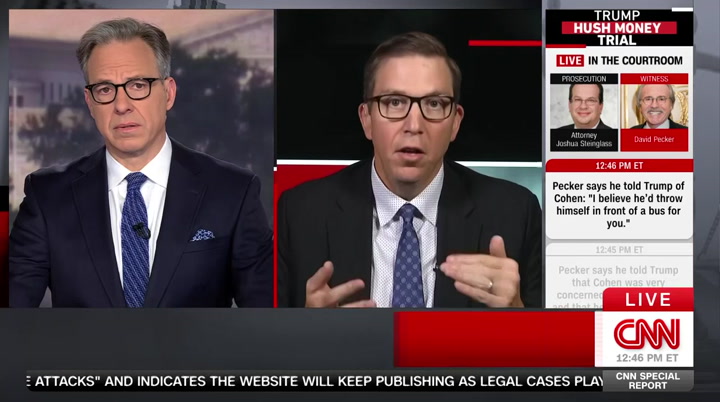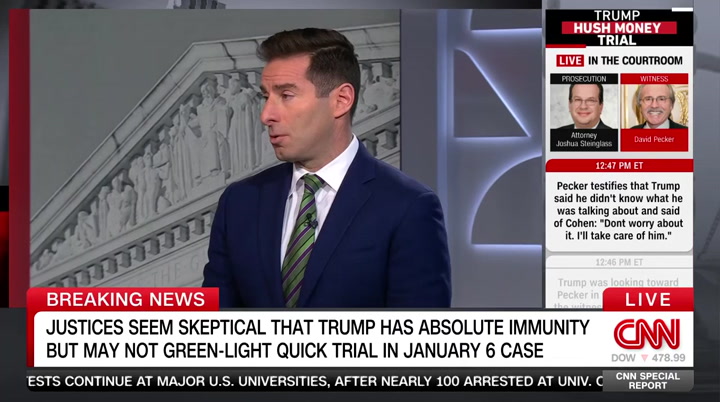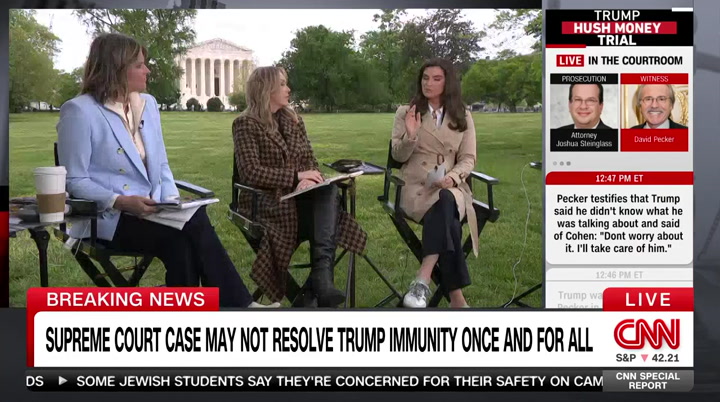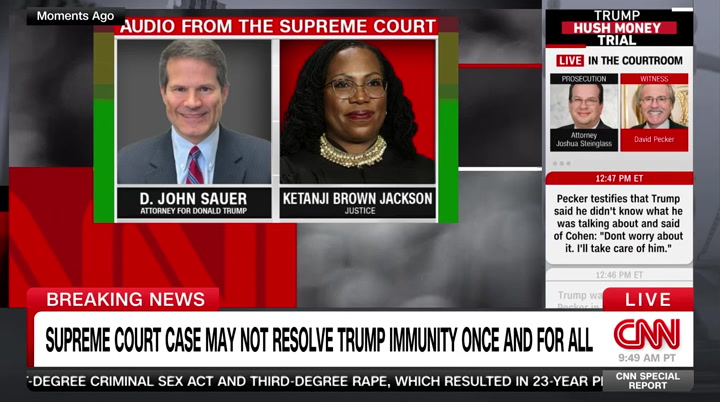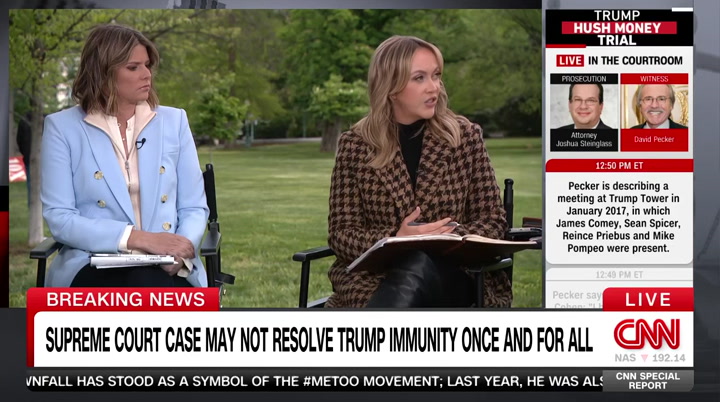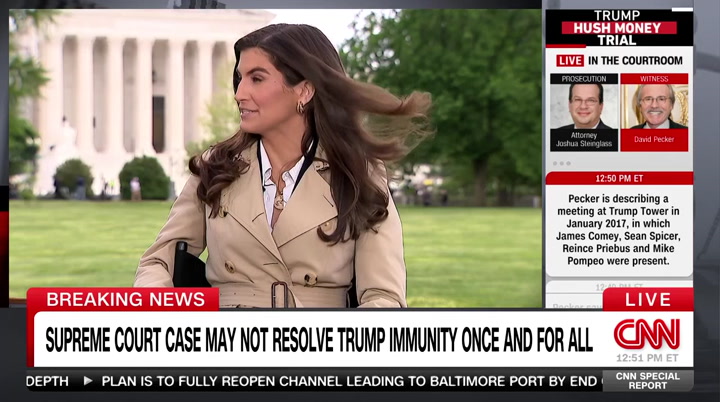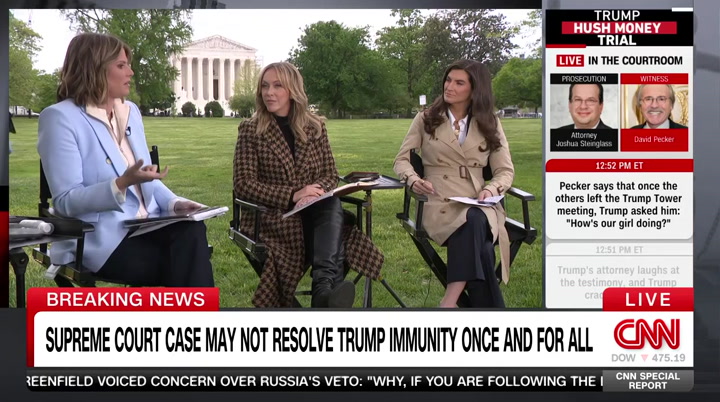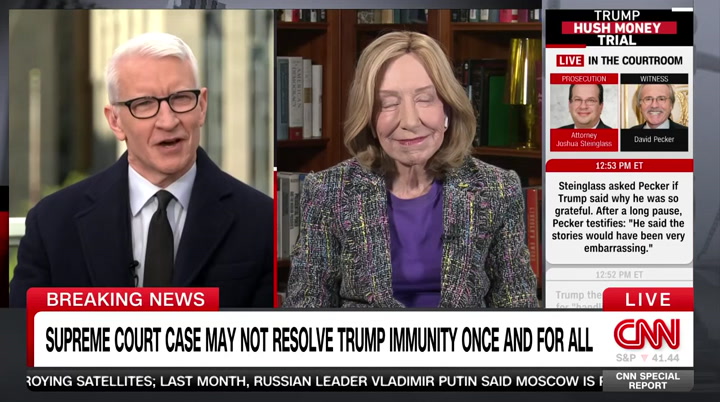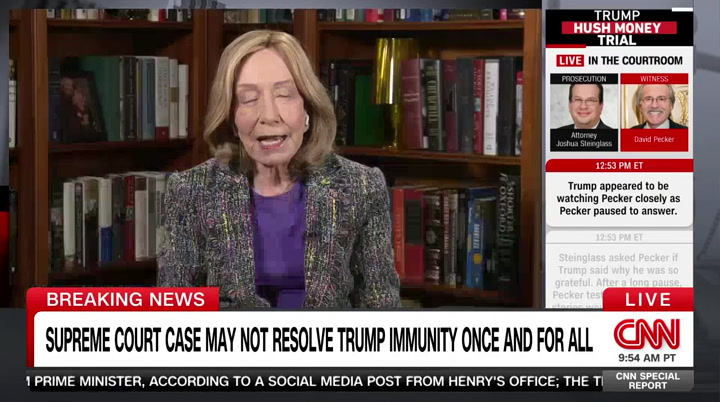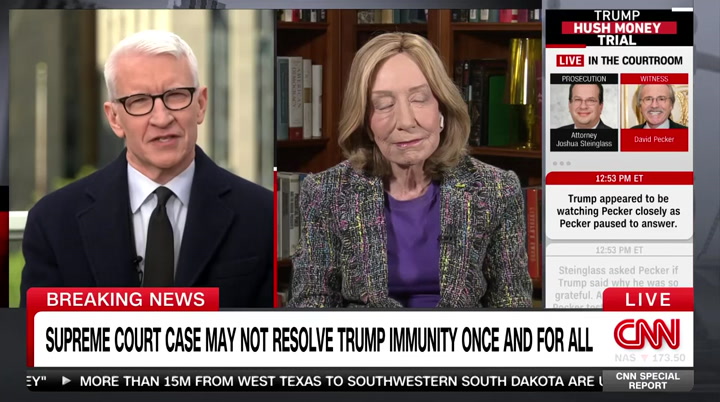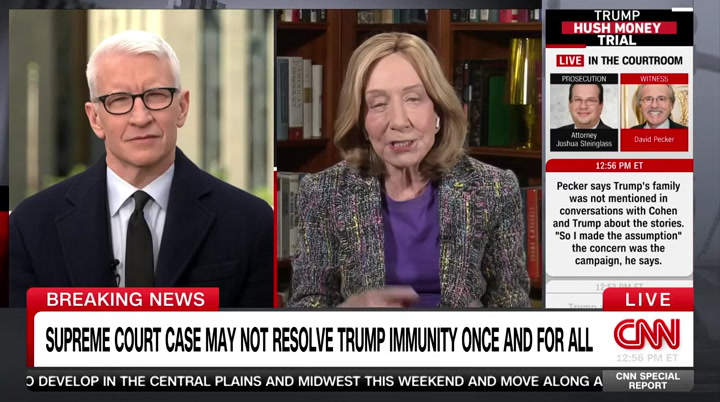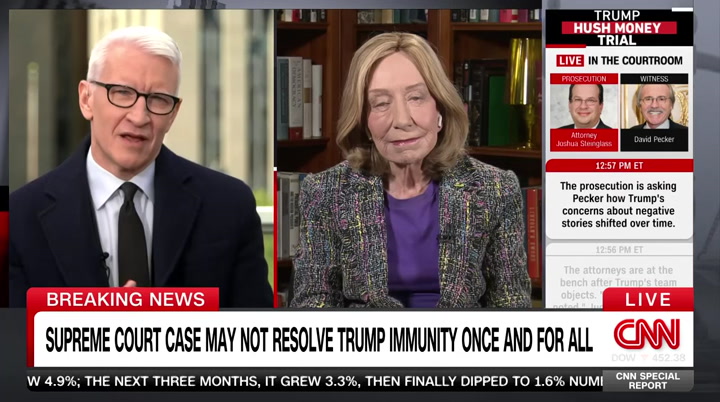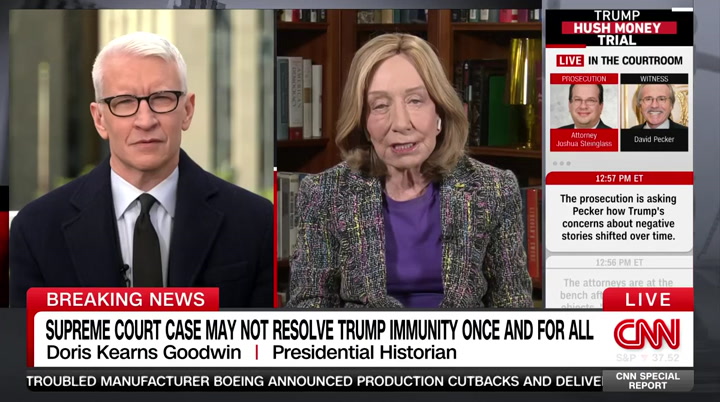tv Trump Immunity Battle at the Supreme Court CNN April 25, 2024 6:00am-10:00am PDT
6:00 am
>> very quickly, ginni thomas, the wife of clarence thomas, made phone calls to state and local officials prior to january 6, in an effort to try to overthrow the election or get rid of election results. there. do you believe clarence thomas should recuse himself from the argument today no, i don't. >> and i think people need to be very careful before they start saying the justices have to recuse based on what their spouse is done. i think people ought to be very careful that. and i say it in full disclosure rob is a law school classmate, a clearances. i've known jenny for many years ambassador bolton, great to see you this morning. >> i appreciate your time as always. thank you very interesting to have a month thank you all so much for joining us today. >> this is cnn news central. now, cnn's special coverage of donald trump's immunity battle. now, before the supreme court starts, now we are live
6:01 am
the us supreme court or historic arguments are about to unfold testing former president donald trump's unprecedented claim of absolute immunity from criminal prosecution for his attempts to overturn his 2020 election defeat. the hub couldn't determine if the presumptive republican presidential nominee's federal election subversion trial happens before this year is 2024. election or at all? >> i'm kaitlan collins outside of the high court and i'm anderson cooper over looking at manhattan criminal courthouse while the supreme court hears trump's immunity case the former president is here in new york city in the midst of his first criminal trial for hush money scheme allegedly aimed at helping his 2016 presidential campaign the leadoff witness, former national enquirer
6:02 am
executive david pecker resumes his testimony soon, recovering. both of these monumental cases in the hours ahead. >> i'm jake tapper in washington and this is cnn special coverage, the trump immunity battle at the us supreme court about an hour from now, oral arguments will begin in donald trump, petitioner versus the united states and the nation's highest court will confront landmark questions that issue trump's claim that he has blanket immunity from criminal prosecution for his conduct on january sex and other efforts to stay in power because he contends those were official acts as president, as our arguments, the lower courts have rejected the state's of this case are enormous, not only for mr. trump and the current presidential race, but for american democracy moving forward, the nine justices, including three justices appointed by mr. trump, have the power to set constitutional precedent but could have a lasting impact on the ability to hold sitting and former
6:03 am
presidents accountable to the rule of law. or in donald trump's view, the court's ruling could potentially please clear the way for presidents to conduct official business without the fear of frivolous prosecution. let's check in with cnn's senior supreme court analyst, joan biskupic, outside the high court right now. and joan, your thoughts on the history-making arguments the justices are about to hear hi, good morning jake you know, this has been so suspenseful. >> what's going to happen at the supreme court, and we're finally here in this moment. but an hour from now, the arguments we'll start. i'm about to go in to get my seat in what will be i'm sure a very crowded courtroom. i'll be both watching and listening for particular things. first of all, once i get into that courtroom, i'm going to be looking for clues in the justices special guest sees who's come to watch this. occasionally their spouses come in. jane roberts, wife of the chief justice, often slips in just before arguments are going to be heard. i'll also be
6:04 am
looking at the two lawyers who will be arguing this case whose voice is you're about to hear? john sour on behalf of former president donald trump, who argue the case in lower courts. and michael driven on behalf of special counsel jack smith defending the justice department, the united states government here before the justices and then i'll really be listening for what the justices themselves act asked who dominates this? what will the chief be asking about the chief who is very protective of executive authority, but also has had quite fraught experience with donald trump and will be very cautious about what sort of messages projected at this point. you know, there'll be going back to precedent from the time of the framing of the constitution all the way up to richard nixon era. and cases that involve kim and a precedent that was set when gerald ford pardoned richard nixon after watergate and jack smith's side is arguing that that shows that a
6:05 am
president could have been subject to criminal prosecution. jake interesting, joan biskupic. >> thank you so much. kaitlan collins, also outside the court, it will be a fascinating day at the court today. and i'm sure mr. trump wishes that he could attend, but of course he's a busy with a different case. >> yeah. jake, you just said that this morning he was complaining that the judge in new york did not make a special exception for him to be able to come to these arguments. he said that he wanted to come instead, it will be his attorneys inside the supreme court arguing this without mr. trump as he is listening to david pecker's testimony. and i have seen paula reid and kasie hunt here with me as you're waiting for this monumental day, just kinda, i mean, we talk about split-screen a lot, but this is really remarkable to see donald trump in a manhattan courthouse and also his attorneys, his other attorneys going into the supreme court and paula, i just a reminder the question that the justices had before that, which is whether and if so, to what extent does a former president enjoy? we presidential immunity from criminal prosecution for conduct alleged to involve
6:06 am
official acts during his tenure in office. >> it is so wild to me, caitlin, that we are here on this question because in talking to trump's lawyers throughout the special counsel investigation, they would always say this is our strongest argument, but we're going to keep making it that what he did in the wake of the 2020 election to try to subvert the outcome that we're going to make. the argument that those were official acts because not only do we or client a duty of vigorous advocacy, but also the litigation helps to delay any possible trial. >> now, this was completely he rejected by the lower court saying, of course, presidents don't have absolute criminal immunity for everything that they do. an office. and so rejected the idea that what he was doing, pressuring the justice department to investigate the election results, pressuring state officials engaging in this effort to put forth fake electors rejecting the idea that but any of those were official acts completely rejected at the lower-court level so when the supreme court took this up, the two questions are, okay. does the supreme
6:07 am
court wanted be the final word also rejecting this idea of absolute criminal immunity for presidents or did they think there is a little bit of nuance here? and they'll send it back down to the lower courts to litigate that either way, the trump team really walks into court today, winning, because just taking this up now so late in the game has made it difficult, though not impossible for jack smith to bring this case before the election, even if you went here today. yeah, that's a key point, casey, because you know, even if he loses, he could still technically get a win if they take so long to decide that he has lost his argument here that this case does not happen before the election. >> i mean, even if they decided in a month, we wouldn't see a trial potentially until october, so it well into the heart of the presidential election. well, it seems unlikely that they'll decided before the very end of their term and that it'll the late june before we're actually learning. i suppose it's possible that something else could happen, but i think it's just important to reflect on the big picture question. that
6:08 am
is, at hand today because i mean, this lawn on which we are sitting, where right across from the supreme court. this is the place where the mobs overwhelmed the capital which is right across the way, bashed in those injured. i mean, i watched it from a building across the way. i looked out the windows and saw them attacking the sayyed of the building. >> the justices have said that they want to decide whether or not the then president can be held accountable for that day. >> and that is an incredibly weighty question for us as a republic. and it really inserts the supreme court into a central role in deciding whether or not that same person is going to become president in the united states again. and i mean to your point, paula the delays here and this their decision, how they decide this could generate another set of potential delays if their decision ultimately is what means that there's no answer to whether or not trump is accountable for that day before the election. that means that millions of americans are going to have to go and decide whether they want to put donald
6:09 am
trump back in office without having a chance to see whether he was convicted here. and we know from talking to voters that they do care whether or not he is going to be convicted here. so there is a very there's an argument that the trump people have made that pushing it this late close to the election is going to influence it. i would also argue the other side can say this delay is influenced so again yeah, it's going to be a notable and john sauer will be the one jake inside that courtroom are inside the supreme court arguing on trump's behalf. some of his allies didn't think that he did a great job arguing before the dc appeals court. we'll see what they make of how he argues this case today. >> all right, caitlin, thanks so much out. let's break down the key elements of the trump immunity fight with cnn senior legal analyst elie honig le how did the case reach the nation's highest court? >> jake, it's a split-screen de this supreme court argument comes out of jack smith's federal 2020 election interference case. here in washington dc. now, as you said, we've had to go through several for all steps of the legal process to reach the supreme court. it started in
6:10 am
the federal district court, the trial court, donald trump claimed he was immune based on his status as a former president. the district court judge judge tanya chutkan, she quickly and swiftly rejected that. she ruled that there is no divine right of kings in this country. donald trump, you are not immune. now at that point jack smith's team actually made an unusual move. they said supreme court, we want to skip this middle level. we want you to take this case directly. it's too important, it's too urgent. supreme court said, no, you got to go through the normal channel so that brought us to the mid-level court of appeals, donald trump again claimed he was immune and again, the appeals court, they rejected that argument two they said the same thing essentially, presidents are not covered by their status as former president's. now, a couple of things that we need to know and a couple of things we don't know about immunity. first of all, there is such thing as civil immunity. you cannot sue a president or other federal officials for things they did and within the scope of their job, we know that from
6:11 am
1982 supreme court case involving richard nixon, you will hear reference to that case today. what we don't know and what we will learn today is, first of all, is there such thing as criminal immunity for federal officials at all? and if so, what are the scope of those protections now we are going to hear i think three key the arguments and some variation today from trump's team first of all, they argued in those lower court cases that donald trump has complete immunity for everything he did from the moment he took the oath of office as president until the moment he left office four years later, that argument though, has essentially been dropped out. i don't think donald trump's team is going to rely on that today in this supreme court. it's been firmly rejected by the courts below. i think the argument we're going to hear much more about is donald trump's claim that he has limited immunity. for whatever he did within the scope of the job. there'll be a separate question about waze within the scope of the job relating to january 6 and what led up to it. but i think that's gonna be the main argument. the third argument you'll hear from donald trump is something called the impeachment judgment clause. his lawyers are going to argue
6:12 am
that the only way you can indict a president or former president is if he has first been impeached by the house and then convicted by the senate. the prior judges who heard this word, very skeptical of that argument. and jake, just one last thing as kasie hunt was just talking about, the calendar is all important. and of course, the election is in november. we expect to get a ruling on this case towards the end of the supreme court's term, you're really looking here at late june, early july. and as you can see, that leaves us with only a very limited window where this case could possibly be tried if the supreme court sends it back down. so timing is of the essence here, jake, this is gonna be history-making day in the supreme court. >> all right. elie. thank you so much. i'll let's talk about this with the panel. laura coates, let me start with you because when when one is preparing for a us supreme court argument, i assume they are studying where these justices have been, are at least five out of the nine in order to win on the issue of presidential power this is we need to remind our viewers. this is a conservative court.
6:13 am
there are a lot of people on this court who believe that the executive branch, the presidential branch has been to weakened in recent years and so they're going to, i assume the trump lawyers tailor their arguments accordingly. and the other lawyers to the defense lawyers, the us lawyers, will also tell her their arguments that way. well, they need not go back quite so far. remember, before the 2020 election, the supreme court was considering the issue of immunity for donald trump as related to his taxes. and justice roberts wrote an opinion we talked about that are present does not enjoy immunity for a criminal subpoena. they could and they send it back to the lower courts. it kicked around for about six months until after the election. so they could go back to that and try to play to that vary side and say, you know, we've been here before and last time we kicked it down to think about the contours of this and so on. a precedent making day, there aware that these judges do not necessarily want to rewrite history. they want to rely on their past precedent and they could maybe do a light edit on that very ruling. but they also know they have think about the larger audience here, including those
6:14 am
members who did not sign onto that unanimously and said, well, hold on a second. are we really going to say that a president would essentially have no checks and balances when we ourselves are the head of judicial branch who's knows, we have to check and balance the other branches. >> and jamie talk about the timing of this case. if you would. >> so this is not just about what the supreme court does. we think we have an idea of it is about when they do it and how quickly they do it. you heard le talk about the election and when the case could start, but why is that so critical? it's not just about putting donald trump on trial. it's about what will come out in the course of the trial are sources have told us that there is critical grand jury testimony if a dance that special counsel, jack smith has that while the january 6 committee learned a lot, he has much more and that the american public should hear this
6:15 am
evidence should here this testimony before they vote. >> and dana abbey and john, if we could just take a step back and look at them? that's from the 30,000 foot view. the fact that we have former united states president who is facing two cases right now. we know it's more than that out there, but just today, one case of the us supreme court about his actions essentially on january 6, 2021. and then of course, the new york hush money cover-up case in man and hatton, which is which is the second story of the day. pretty remarkable. >> it is remarkable. i mean, we, we've run out of synonyms for unprecedented. but it's good to take a step back and look at how absolutely remarkable and credible it is. when you look at what's happening in washington in the highest federal court in the land at the supreme court. and it is also important not just to think about the timing which is critical whether or not the special counsel is even going to be able to get the information that he's collected
6:16 am
through the months for the grand jury out to the public through a trial but also about the idea that you have had scores of people who were actually physically at the capitol who have been tried, who had been convicted and are in jail the big question when we were sitting there on january 6, waiting for that then president of the united states to say something and you didn't for hours and hours and hours was what is he doing? and then ultimately, what is his culpability? how the supreme court decides this immunity case is going to decide for the american people and for history whether we're ever going to find that out. >> i mean, it is a stress test for the entire judicial system in this country from the state level all the way up to the supreme court. >> and donald trump has been that as a political figures since he became a political actor in the most recent case
6:17 am
and 20 i think that i've been thinking about the choice that the court made to decide to even hear this case in the first place they very well could have led the lower court ruling stand. they could have just stayed out of it. i think some people worry that the court might be wanting to outline president more leeway. but i do think that donald trump is a major party candidate for the presidency. again he could very well when and we may very well need to know the answer about what, what are the contours here of what is acceptable and what is not? because trump has this way of just pushing the boundaries all the way to the very edges. i mean, his lawyers brought up this possibility it's or essentially that he could order an assassination of a political rival and essentially be immune from it those things have to be taken seriously and maybe we do need
6:18 am
to hear what the court has to say about that. i think right now at the lower levels, also, there's just an attempt to on all the things that happened between the 2020 election and january 6 is to say we need full accounting of all of that& the system now has to decide if it's possible for there to be accountability. and i don't think we've gotten that answer yet in really any of these instances. >> normally when you get to the supreme court, you think like it or not like the case are not agree or not. we're going to get clarity. we've made it to the last step. the supreme court, we're gonna get clarity, forget about it. forget about it because there's not just this case and the supreme court case in michigan the other day, the state case, they're a witness testified that donald trump isn't unindicted coconspirator in the effort to overturn the michigan election results just yesterday. all of the trump inner circle indicted in arizona in another new case that they tried to overturn the election results in arizona supreme court will answer the immunity question eventually. and donald trump wants to delay everything he does is delay,
6:19 am
delay, delay. let me give you two numbers. why recent ap poll 22 of republicans said he would be unfit for office if he is convicted in any of these cases, 22% of republicans you don't lose them all, some of them say, i can't vote for biden at the end. but if you lose a chunk of them you lose the election. and just the other day in your home state, the commonwealth of pennsylvania, nikki haley, who has been out of the race for how long? got seven, 17% of the vote. she got more than 150,000 votes and republican primary and she's long gone from the race. what does that tell you? that this is a closed primary. there only republicans, trump always says they're democrats voting. here are the democrats voting there? these are republicans. a significant slice of republicans have severe doubts about donald trump. some of its character, some of its covid but some of its this, some of its the legal issues against him. so he wants to delay this as long as possible. he wants to make it all a witch-hunt, make it against if his supreme court conservative supreme court says he does not have immunity, takes a lot of air out of the trump balloon let me bring it out. >> steve vladeck. steve, we should note that this idea of
6:20 am
how much immune kennedy a president, has while in office, it's not a, it's not a frivolous notion the question about whether or not what donald trump was doing on january 6. that's a separate issue. but the idea that presidents can't be prosecuted for things they are doing as president there is some basis for that yeah. >> and jake, i think a lot of what we're going to hear during the oral argument later this morning is going to reflect that exact point where i think we're going to hear hypothetical questions from justices across the bench that are less about former president trump and more about president's for whom some of these justices worked present in the past and whether they could have faced criminal prosecution for actions that we now know to have crossed the relevant legal lines. >> jake, i think that's the real question for the court, is not are we going to immunize for president trump? but can we draw a line? in a way that is going to put the allegations
6:21 am
against former president trump arising out of january 6 on the yes, you can be prosecuted side while not say an every action of president takes order on a military operation deciding when to classify secret information ordinary day-to-day stuff, where there it really isn't the same controversy. shouldn't be the basis for prosecution. i think if there can be some kind of consensus on the court about where that line is perhaps the argument today will actually be fairly one-sided if there's not a consensus about where the line is, i think that's where we can see both a lot of contest across the bench and also jail it probably a relatively slow time horizon for a decision interesting. >> all right. today, thanks so much. there's much more ahead as we get closer to this high-stakes moment for the us supreme court with the federal prosecution of donald trump on the line, we're going to get insights and reform. member of the january 6 house select committee, democratic congressman jamie raskin of maryland, plus an update on the trump hush money cover up trial and new york city is
6:22 am
testimonies about the resume and the judge could issue a decision at any moment on whether donald trump violated his gag orders. stay with us live from the nation's capital, one of the most unforgettable night in dc, misra will read back here again, president biden and camino the in collin joseph headline, the white house correspondents dinner, live saturday at seven eastern non cnn i went to experience. i trust them on my phone. they showed me subscriptions. i'm paying for even the ones i don't remember then any i don't want experienced cancels for me. >> easy see all you can do it. >> experienced.com slash say, now, okay, ready to washington one second. i got it. finished my laundry. >> it's gaslight, one second. i use rentz. >> was rentz to the company that will pick up wash fold and olivia all right.
quote
6:23 am
>> it looks like it's coming okay. >> let's watch this. >> wait, i'm gonna do my laundry. better. hurry gun. i'll schedule sign up for rinsing rinse.com to get $20 off your first order. >> this tiny home trend not for me. now, this is more like it the same goes for my footwear. so i went hands-free with white fits. get your slip and just step in and go without bending down or touching my shoes why pitt hands-free skechers, slip ends okay. yeah, we got orders coming in, starting a business is never easy, a star net eight months pregnant. >> that's a different story. >> i couldn't slow down. >> we were starting a business from the ground up going way up and the stock market is this and the numbers are very bad. >> this is by now, it's catching up with him. it's
6:24 am
border, destroying drink with other countries. they no longer respect these states. >> i think that dollars are tremendous struggle in terms of currency this is going to be the standard& it's going to be the standard with me with biden even lose $1, the standard that'll be like losing the biggest war we've ever lost. and it's a shame, but it's all the way down to 1.6 and don tell you, nobody thought that would be possible. >> and it looks like it's heading down from there so that's very bad news. this morning, i met with great people construction workers, some teamsters, and other unions, and some nine unions then we had a fantastic morning. who were there are some of the person's there great job support as you know, some in this fall's came out over the last 24 hours when we're up the call up in swing states and up nationally but one came out when we're down
6:25 am
very little in new york new york traditionally isn't won by republicans anymore, used to be 50 years ago, but not anymore. and i think we have a good chance of winning here and we're gonna give it a big plague of going to the south bronx to go rally we're going to be doing a rally at madison square garden where we believe we think we're madison square garden to do whenever big rounding, honoring the beliefs and honoring the firemen. everybody a lot of people. including teachers by the way, we're honoring teachers because teachers have been very badly aligned with some very poor leadership. but it'll be honoring the people that make new york work and we'll be doing a number of large rallies and we're very excited, but we think we have a real good chance of winning new york and again, the swing states were leading in every one of them. and via a lot, not just by a little by a lot, but the big news today i think is the 1.6% when you look at 1.6 gdp, that's a number that nobody
6:26 am
though was awesome. >> let's a real bad number and it looks like the projections are at setting in the wrong direction. and that's why the stock market stem. so they've today so in the meantime, mom, that this trial, mike rights have been taken away differently, but every single expert, every legal scholar, every respect to scholar, has said this is no case. there is no case here this, is just a political witch. had thank you very much for argument i think that the supreme court has a very important, to arguments before today, i would've loved to have been there for this, judge would not i shouldn't be there. >> but you wouldn't allow it to happen? >> which themselves above the supreme court which is unfortunate, isn't it but argument immunity is very important to president has to happen this has nothing to do with me. >> this has to do with a president in the future for 100
6:27 am
years from now. if you don't have immunity, you're not gonna do anything thank you. letter become a ceremonial president. they're just gonna be doing nothing. you're not going to take any of the risks, both good and bad either make great decisions and save the country, you're going to make some decisions which are unfortunate, but that's the way it is. but you're not going to do anything if you don't have immunity because otherwise you're going to be processed thank you after you leave office or doing something like going into an area, going into a country, doing lots of things that you would be doing and we don't want to ceremonial president. we have to have a real president. and assuming you have the right person that can make a big difference, you saw that for four years. when i was president were respected all over the world, we had the best economy we've ever had. everything was good. we had no wars were defeated. isis-k, we had no wars. we had no nothing. but were respected all over the world and now it's a disgrace.
6:28 am
we also by the way, had the single best border ever in recorded history of our country when the best border ever we built 571 miles of wall where we're going to build 200 more miles farm president, i said we were going to build but we had a country that was respected and now we have a country that's a joke is being left at all over the world and, you have riots and all the universities. the only place that's locked down as this court house because they don't want any supporters here. they don't want maga here. they don't want anybody in this it is lockdown like a buttoned up vest and it shouldn't be if they did the same lockdown in columbia, nyu, and the colleges and universities please you'd have no problem whatsoever, but there you could put tense up. you can stay as long as you want. but this courthouse is locked down. there's not a person within five blocks. they have more police year and i call up new york spiders because that's what they are. >> and they don't want are you
6:29 am
doing this they'd like to be straightened conditions and they'd like to be at the colleges and making sure that they don't have what's happened here is what's happening at the colleges is a disgrace all over the world. people are laughing at this. >> this is the worst run country right now, probably anywhere just about, you don't get much worse. >> we have a president who was a disaster we have a president who is the worst president in the history of our country, really have to do is look at the millions of people coming in from prisons from mental institutions and tariffs and coming in levels. we've never seen before. so i'm going to go in down and sit in front of the election interference. this is the way they think they're going to get elected but. i guess
6:30 am
factually incorrect or hyperbole or complete overstatements saying the economy is the worst, it's ever been is claiming that the stock market is crashing, which it is not and we're going to bring in daniel dale for fact-check shortly, but just the sheer volume of molson, false things there was quite normal for the former president daniel joins us right now danielle, i mean i don't even know where to begin yeah. that's a constant challenge. fact-checking donald trump anderson only donald trump could bring up crowd size lie to a criminal trial. he keeps saying this entire area is locked down. he said there's not a person within five blocks that is categorically untrue. there was a designated protest zone right across the street at a park, literally right across the street from the courthouse. and the fact is that very few, just a handful of pro-trump demonstrators have shown up there not being prevented from going there by police as he claimed on social media. the other day, he said a whole bunch of things about a whole bunch of topics tons of people
6:31 am
from prisons and mental institutions flooding cross the border. there's no evidence of that. and his own campaign has not been able well to produce any evidence, but i've repeatedly inquired. he said we built 571 miles of border wall. that's more than 100 miles exaggerate its 458, including much of which was replacement while secondary wall rather than a new wall and unguarded areas, he's at california gas prices were just announced that $7 that's something you hear from him? a lot, there may be a station or two somewhere in california where that's true. the average though today is $5.41. so more than $2 off there. he also complained about the dollar crashing, as you said? well, he also complained on social media this week that the dollar had just hit a 34 year high against the yen. so he's complaining from both ends of this, the reality is understand the dollar is significantly stronger against foreign currencies than it was when he left office and he repeated his claim. you hear a lot from him that we had no wars of generously, you can say that he was suggesting he didn't start any war. but as we know, he certainly presided
6:32 am
over a number of war. as he presided over the wars in iraq, afghanistan did not fully withdraw us troops, troops in syria and other countries. so no war is at very least significant exaggeration yeah, the idea that this whole area two is locked down, that nobody can get in and out. >> it's not even as you said, is just simply not you can you can hail a cab just some anti-trump protesters blocking a street and they were able to do that. i mean, so there's yeah, if people want it to come down and be supporting him, there. >> yeah. >> let me excuse me. let me just add the courthouse is open to the public. if trump's supporters want to attend the trial, they can go into the courtroom if they line up early enough, you can take a taxi, an uber. your own car to the front of the courthouse. it is not fully locked down, so he's saying this to suggest that's why we don't have this massive approach trump demonstration people, my people can't get close, but they can get close and they're not showing up
6:33 am
daniel, dale. >> thanks very much the, karen friedman agnifilo here. and cnn's kara scannell out. let's talk about what we expect to happen today before the jury comes in. it's very possible, judge juan merchan may rule on the gag order yeah. >> i mean, that's one thing we're looking for today to see if he does rule on this gag order and if he does if he addresses donald trump to make sure he understands what the judges findings are here in course, prosecutors have asked the judge to fine trump in contempt for violating gag order. they say ten times, find him the maximum of thousand dollars per violation require them to take down the post and also warn him that he could face 30 be days in jail if he continues to violate this gag order. they said they weren't asking for any incarceration at this point. but as our colleagues have reported, the secret service and department of corrections are now thinking about what they would do if it comes to that, because of the former president's propensity need to make comments and make
6:34 am
statements about some of the witnesses in this case. >> again, that seems like a very unlikely that it would actually come to that. let's talk about what kind of testimony we're going to hear. here today. david pecker, it's just third time on the stand. third day on the stand, dish will be the longest. he's been on the stand because court was short, both both days prior to this he did not really get into there wasn't time for him to get into the stormy daniels hush money payment. that's really the heart of this that's what's going to be talked about today by the prosecution. >> yes. so he's still on what's called direct examination, which is the prosecutor there is asking the questions of david pecker. we haven't even begun the cross-examination yet where the defense attorney will show trump is chatting right now with attorney emil bove, who is in the first chair before the judge enters. again, just for our viewers who are joining us on the left-hand side of your screen all morning long, you're gonna be seeing a reports from the error, the number before we
6:35 am
have both in the courtroom and in the overflow room, trump is whispering with his attorney right now, todd blanche, we're going to be reading those to you as were also discussing what is going on on in the big picture. so karen, i'm sorry, continue. yes. so the first chair means that's the person who's likely to do the cross-examination& the objections during that particular killer witness. and with the two tables, the person in the isle of each table is the first chair. so the fact that emil bove is the one who moved over to that chair suggests that he will be doing the cross-examination of david pecker at that point when that when that time comes, do you have any sense of how long pecker may be on the stand today in the hands of the prosecution. >> it's unclear because as you know, he did not i have as much to do with stormy daniels as he did with the karen mcdougal and dino sajudin doorman hush money one payments. so are the catch and kill payment i should say.
6:36 am
and so by trump said to david pecker, i'm going to be turning this over to michael cohen and that's a lot of the interaction pecker might have had with michael cohen exactly. and i think that's what you're going to expect. the cross-examination of david pecker to be it's going to be all the times that donald trump was it's not involved that only michael cohen was because i think the defense attorney is going to want to make this all about michael cohen's credibility and distance trump as much as possible. >> they really trump attorney todd blanche is nodding along as trump speaks with him before the judge enters the prosecution is really used. david pecker to kind of set the stage, but also kinda narrate the events. i mean, previously had thought is michael cohen the person they're going to use to try to narrate this. but there really relying on david pecker to kind of set up the big picture. >> and he's, he's a cleaner witness as far as this history with trump goes, so he will appear more neutral in that sense, describing pinera history together explaining this when this alleged conspiracy began in this
6:37 am
meeting at trump tower in august of 2015 and he's able to tell the sorry, but even after he goes finishes the karen mcdougal piece of this explaining how am i got involved. we're still going to hear a lot of phone calls and how this transpired. >> the court is now in session. judge. merchan is on the bench because where testimony left off was with him saying how michael cohen was anxiously calling him, that his senses michael congress there are a lot of pressure. he speculated it was from former president donald trump who wanted to know what david pecker is lieutenants interview with karen mcdougal is going how it was going. so we left it at this at the brink of them learning how this was going to play off. then there's a stormy daniels piece of it. >> who judges wished mr. trump. good morning when he does that every morning despite what trump's tweets about him and posted about the judge but also a david pecker is going to testify about is what happened after the
6:38 am
2017 for what in court four days a week. we know that he is expected to have two campaign events next week, but i do want to mention david pecker because there's couple of angles here that i do think are very important. the first being that this is quite the week for this testimony to come out. it has been very salacious. we expect it to be more salacious. we expect conversations it's around stormy daniels. this is
6:39 am
also melannie has birthday this weekend, donald trump will be going home to mar-a-lago to celebrate and just a reminder that when these reports first came out about this alleged affair around stormy daniels and put an intense intense strain on their marriage while he was in office. the other part of this is that i asked on trump specifically about david pecker, what he thought of the testimony, how long it had been since the two of them had spoke, given that they had been such close friends for so long, he wouldn't answer that question, however, all he said was that pecker sure. had been nice to handle christian trump's attorney says that they discuss their objections with the da's office, is they made progress though they still have some issues to work out.
6:53 am
michael cohen though the initial meeting 2015 was between pecker michael cohen and meeting. they had it at trump tower and trump, according to david pecker, said. what can you and your magazine do to help my campaign? >> which is interesting because earlier on, i mean, before this, before they were actually on the
6:54 am
stand, the idea seemed to be that david pecker had come to them saying, hey, what can i do for you guys? when in testifying is that it was trump i michael cohen saying, we want your help on the campaign and specify that it was for the campaign that wasn't a meeting of we want i can to help because mr. concern about melania trump. trump is leaning back looking down at times at pecker as he testifies again, had the interaction between these two, given their long history, i'm going to be to be inside the mind of donald trump. what he must be thinking as he's watching david pecker right now well, the risk always when you have somebody who is known, someone for a very long time is you don't know what that person as a prosecutor, you don't don't know what they know. >> so in other words, what is donald trump know about david pecker i want is david pecker know about donald trump that you as the prosecutor, aren't aware of? and so that's always the concern and the risk will also i mean, you hear donald
6:55 am
trump, you know the david pecker because pecker's now describing how cohen told him he wanted to buy mcdougal story. >> pecker has more information about donald trump and that goes back years and then he's needs to be testifying about so the idea, according to the prosecutor that the president and trump form of trump was sending a message to pecker by calling him a nice guy. >> this morning. i mean, he he might be concerned about what else pecker could say. pecker says that cohen didn't think mcdougal wanted to effore story about the alleged affair out there yeah i, mean that's true. and what makes this whole thing illegal because of course, catch and kill is not illegal and paying hush money isn't illegal. but what makes this illegal is that this was all about trying to influence the election excuse me. >> pecker said she said that she he didn't want to be the next monica lewinsky. she wanted to restart her career. >> so what makes this illegal
6:56 am
is that by paying money to people that david pecker was doing on behalf of candidate trump because that's what he was at the time if you do that and you don't do clare that as a contribution to an election that is in violation of election laws and what makes this criminal is then they wanted to not only do that and make this campaign contribution, but then cover it up by falsifying business records so that that's what makes this whole scheme illegal. ultimately, as we continue to fall the case jake, let's get back to you. thanks, anderson. so the us supreme court is about to consider if mr. trump can be tried on criminal charges of election interference, or if the former president's claim of absolute immunity for official acts is legally and constitutionally sound. the historic oral arguments begin in a matter of minutes and you're gonna be able to follow those arguments on the left side of your
6:57 am
screen. and we'll continue to follow donald trump's hush money trial in new york with constant updates that will appear on the right side of your screen. you see it right there on the right side of your screen we have pictures of a sudden district the attorney joshua steinglass and the witness, david pecker. the tabloid magnate,& the 9:55 a.m. updates several of the jurors are taking notes as pecker testifies, they're turning their heads between the prosecutor and pecker as they eat, speak. reporters inside the courtroom trying to bring you there with descriptions of what's going on given the fact that new york does not allow cameras in the courtroom, elie honig. >> so the payoffs to karen mcdougal, which were hearing testimony about right now, they are not charged as the actual crime. the crime is centered on the subsequent payments to stormy daniels, but this is sort of chapter two in an important three chapter story that prosecutors are trying to tell of catch and kill incidents that donald trump david pecker, michael cohen, and others pulled off. the first one we heard about on
6:58 am
tuesday. that was the payoff to the doorman who claimed falsely that he had this story about donald trump having a child out of wedlock. they paid him off in order to silence him. now we're into karen mcdougal, which is chapter two she alleged this affair with donald trump they paid her off in order to take the rights to her story and not running catch and kill it. and this will set the stage for the stormy daniels incident. and if people are wondering, well, why would prosecutors have charged the stormy daniels payment, but not the karen mcdougal payment it's important to remember the crime here is none of these payments. hush money is not a crime. the crime is in the falsification of the business records around the payment. and a structured these payoffs differently. the kind of mcdougal payment was pretty straightforward. there was no falsification. they paid or for a story, they tell the story. no falsification. the allegation is that a couple of months later when it came time for stormy daniels, they falsified those payoffs, can make them look like legal then also what happened that karen mcdougal who alleges that she had about ten or 11 months relationship with donald trump in 1998, play made of the year
6:59 am
that she was paid $150,000 by david pecker himself by the tabloid, the national enquirer in that company. >> whereas stormy daniels the payment was made by michael cohen, trump's attorney, and then the allegation is that donald trump then paid michael cohen back, right. saclay. and the last part of that is where the crime lies in donald trump reimbursing michael cohen, david pecker says, when i got on the phone, mr. trump said to me i spoke to michael. let's michael cohen, karen, that's karen mcdougal is a nice girl. is it true that a mexican group is looking to buy the story for 8 million. so trump is saying to hit david pecker that he talked to michael cohen. this is trump talking and says michael collins says karen's a nice girls is it true that a mexican group is seeking her story for $8 and pecker says he told trump, he absolutely did not believe that was true. $8 million from some mexican. and this is important because david
7:00 am
pecker has direct contact here with donald trump. a lot of what david pecker was testifying about before he was communicating with and through michael cohen. so trump says to david pecker, according to pecker, what do you think i should do this is about the fact that karen mcdougal is allegedly out there with her story of a ten, 11 months relationship with donald trump this is in 2016, by the way, what he's running for president, he does not want the story out. pecker recalls he told trump, i think you should by the story and take it off off the market. that's, catch and kill except not by a publisher by donald trump himself, right? we're seeing catch-and-kill in the works here. but again if the national enquirer wants to buy stories and bury them, they can do that. >> i think that one of the big questions as we continue with this testimony is going to be that was pecker's advice to trump that did not happen. and the question is, why i do think we want to know what was going through packers mind would ultimately he decided not to have trump essentially reimburse him for this payoff to karen mcdougal, and we'll
7:01 am
see if the prosecutors get to that we should mention just prosecution for actions that he carried out as related to his duties. it's gonna be a huge case. we're going to bring that to you in seconds. meanwhile, of course, there's this other very tall tree thing going on on the, on the right side of your screen, where we're bringing you updates on the manhattan case. david pecker, the tabloid magnate, recalling, telling trump, i think you should by the story and take it off the market. sorry, no, i think what abby said that is true about this sort of part of their conversation that pecker is testifying about the other key thing i should say, prosecutor now is asking pecker why he told trump they should biden mcdougal story, quote, i believed the story was true.
7:02 am
you should note that donald trump to this day is denying that he had a relationship with karen mcdougal. >> i believe it would have been embarrassing to himself and also his family pecker set as to why he advised trump to buy the store. >> and what is important here as we have talked about elleithee in particular, you and i think it bears repeating an underscoring is that what happened with karen mcdougal? why are we even hearing about this considering the fact that there is no alleged crime here. and it is because the prosecution is clearly trying to establish that trump was very involved. >> exactly. they're trying to show the stormy daniels payment didn't come out of nowhere. there was something that led up this by the way, that's really important piece of testimony, checkerboard, telling him about paying for the storage quote, the boss will take care of because i believe what happens, ally and correct me if i'm wrong, is that pecker pays for karen mcdougal story $150,000, right. and then he never gets repaid. he thought he was going
7:03 am
to repay it and he doesn't get repaid they didn't use this as okay. well in the indictment it's implies that he spoke to his lawyers who advise him not to get repaid, not to get repaid. so joshua steinglass, the assistive district attorney prosecuting trump here says, he's asking david pecker to clarify the identity of the boss when cohen, michael cohen says the boss will take care of it. pecker explains the by the boss. donald, every appellate lawyer is going to be looking at this portion of the testimony very closely for the reasons because this is not the charged conduct. >> this is the prior behavior that creates a pattern at the prosecution's talking to say, this is what they normally did stormy seem different. here's who paid or didn't pay. here's the timing of it is closer to the election. >> is there a look at these issues and say to themselves, should the jury be hearing this information, it is it is prejudicial, but it also was probative. >> do this, they have to balance these two things to figure out what the duration actually here inside some cases have already been overturned
7:04 am
for these very reasons to suggest if the jury hears two months, it might be about non charged conduct is problematic, but trump now it's covering with attorneys as he's testifying where hearing a little bit of color in the core mu shutting his eyes as he listened to remember this person, david pecker, someone he knew for a very long time. this is an overall scale. let's go to, i'm sorry rep. let's go to the us supreme court right now where the case is beginning, spanning 200 years and policy considerations rooted in the separation of powers kid, all counsel against it i welcome the court's questions mr. salary, to your last point, could you be more precise as to the source of this immunity? the source of immunity is principally rooted in the executive vesting clause of article two section. >> wow, does that happen? >> yeah. the source of justice, thomas i think is as you described here, separate opinion than cif a tosca, for example, that the executive vesting clause does not include only executive powers laid out explicitly therein, but encompasses all the powers that were originally understood to be included therein. and but
7:05 am
marbury against madison itself provides strong evidence it's this kind of immunity abroad principle of immunity that protects the president's official acts from a scrutiny direct, sitting in judgment, so to speak, of the article three courts that that's matches the original understanding of the exact house. >> how exactly would we determine? what the what an official act is that point the court to two cases for that. obviously, fitzgerald against nixon is the best guidance of the court gives or the course corn adopted the outer perimeter test in this court engaged in analyse that analysis there. that's very instructive here where it looked at the level of specificity at which the acts are described in that case, a civil case here it would be the indictment. >> what if you have let's say, the official act as appointing ambassadors and the president appoints a particular individual to a country but it's an exchange for a bribe. somebody says, i'll give you $1
7:06 am
million. if i made the ambassador to whatever. how do you analyze that? >> that i think would fall under this court's discretion in brewster, where the court held with respect to legislative acts, that bribery is not an official act, which also matches the court that common law background. so the way that this court in brewster kind of sliced at the joint was to say accepting a bribe and the agreement to sex that bribe are not official acts. that's private conduct or not appointment would not be would be essentially unresectable power of this gourd that congress couldn't directly regulate. >> it's accepting a bribe, isn't an official akre, but appointing an ambassador is certainly with and the official responsibilities of the president. so how could you how does your official acts or the official acts border boundary come into play when it's going to be official assuming that the president is innocent. >> but the whole question is whether he's going to be found innocent or guilty. >> again, i think brewster and johnson do address that. are
7:07 am
very persuasively, at least in a slightly different context. brewster a johnson say, the indictment has to be expunged of all the immune official acts. so there has to be determination what's official, what's not i show expunged. the official you say okay. were prosecuted even because you accepted $1 million they're supposed to sit, not say what it's for because the what's four part is within the president's official duties. there has to be, we would say, independent source evidence for that and keep in mind that this indictment charges what this court is described as unrestricted powers of the president. so the premise, the logical premise of this indictment is that congress passing vague and general criminal statutes has purported to directly regulate the president is exercise of things like the exercise of the appointment and removal power things like his ability to speak directly american public core exercises of his it's already under the recommendations clause to recommend a congress members of congress. the measures he thinks necessary and expedient so you have a indictment in this case that goes right to the heartland of the
7:08 am
president's powers that alleges a whole series of official acts and tries to tie them together by saying, well, there's a private aim or a private purpose. in that case and that's a situation which of course could be alleged in virtually any and daikon. >> so it can be alleged, but it has to be proven melhem in say, is a concept long viewed as appropriate and law that there's some things that are so fundamentally evil that they have to be protected against now, i think your answer below, i'm going to give you a chance to say if you stay by it if the president decides that his rival is a corrupt person and he orders the military or order someone to assassinate him is that within his official acts that for which he can get immunity?
7:09 am
>> it would depend on i but that'll go but we can see that could well be an official. i could. and why? because he's doing it for personal reasons. these not doing it at like president obama is alleged to have done it to protect the country from a terrorist. he's doing it for personal gain. and isn't that the nature of the allegations here that he's not doing them doing these acts furtherance of an official responsibility. he's doing it for personal gain i agree with that characterization of the indictment and that confirms immunity because the characterization is that there's a series of official acts that were done for an oil because immunity says, even if you did it for personal gain, we won't hold you responsible. >> what do you how could that be that's an extremely strong doctrine in this court's case law in cases like fitzgerald. >> well, we go back to justice
7:10 am
thomas's question june, which was where does that come from there are mika here who tell us that the founders actually talked about whether to grant immunity to the president. >> and in fact, they hit pad state constitutions that granted some criminal immunity to governors and yet they didn't take it up. instead, they they've passed an impeachment clause that basically says, you can't remove the precedent for morphous, except by a trial in the senate but you can impeach him after or you can impose criminal liability. we would be creating a situation in which we would be saying is this is what you're asking us to say which is that a president is entitled not to make a mistake
7:11 am
but more than that a president is entitled for total personal gain. to use the trappings of his office that's what you're trying to get us to hold without facing criminal liability your honor, i would say three things in response to that. >> first, the doctrine that immunity does not turn on the allegedly improper motivation. our purpose is something at this court has reaffirmed in at least nine or ten. >> that's absolutely but immunity qualified immunity does say that whatever act you take has to be within what a reasonable person would do i'm having a hard time thinking that creating false documents that submitting fault documents that ordering the assassination of arrival, that accepting a bribe, an countless other laws that could be broken for personal gain that anyone would
7:12 am
say that it would be reasonable for president or any public official to do that you're honore as this court said, very persuasively in fitzgerald, the allegation that this particular act would be done for an unlawful purpose or was unlawful could be made in every case. >> and therefore, if that were the doctrine that the allegation of improper purpose is what deprives the objective asieh they're immunity then the immunity would have no purchase. and that's reflected in many cases, isn't, isn't the work though of the improper motive at least in the absolute immunity context to tell us what our official acts and what are not. >> i mean, i understood that even in the app, first of all, you're asked is absolute immunity, isn't it? i suppose that's your your your position is you want the same kind of doctrine that we've applied in other contexts. >> when we say an official has absolute immunity, am understanding is that when we say that, we mean for their
7:13 am
official x is that right? >> yes. okay. so any official acts of them in that world, the real decision-making from the court's standpoint is whether or not something is an official act or not, correct that is an important determination by ami i mean, that's the determination in the absolute immunity world because if you determine that it's an official act, then the principle is that you get immunity for it, correct? that is correct. all right. so my question and i think the chief justice may have asked this at the beginning is how do you determine what or maybe justice thomas, how do you determine what is an official act? and when we're talking about the kinds of scenarios justice sotomayor brought up. one could say that when the president is using the trappings of his office to achieve a personal gain, then he's actually not acting officially even if the doctrine was absolute immunity. so what do you say about that? >> but truth things in response to that first and the last point that allegation that this
7:14 am
was really motivated by an improper private purpose could be made in every single case no, i understand that, but it would have to be made. i'm just trying to assess even if we had the doctrine of absolute immunity, that same allegation& the facts related to it would come in because the person would be arguing that he was not acting in his official capacity. he wasn't doing something official. he was doing doing it personal, correct i agree the objective i'm not sure i agree, but the point i would make response to that is in fitzgerald against nixon, this court emphasized that will result in an intrusive discussion or determination of the president's personal motives for every official act. >> and again, this is not just in the case of the presidency, right? can i just ask you another another quick question before my colleagues take it over here. at the beginning of your analysis when you were giving your opening statements, you were talking about you suggested that the lack of immunity and the possibility of
7:15 am
prosecution in the presidential context is like an innovation. and i understood it to be the status quo i mean, i understood that every president from the beginning of time, essentially has understood that there was let's read of prosecution if for no other reason than the constitution suggests that they can be prosecuted after impeachment that the office of legal counsel has said forever that presidents are amenable to a threat of prosecution, and they have continued you to function and do their jobs and do all the things that presidents do. so it seems to me that you are asking now for a change in what the law is related to immunity. >> i would quote from what benjamin franklin said at the constitutional convention which i think reflects best to the founders original understanding and intent here, which is add the constitutional convention. benjamin franklin said history provides one example, only of a chief magistrate who was subject to pub, public justice, criminal prosecution and
7:16 am
everybody cried out against that. as now i understand. but since benjamin franklin everybody has thought, including the presidency who've held the office, that they were taking this office subject to potential criminal prosecution? >> no, i don't i see the opposite. i see all the evidence going the other way. marbury against madison mississippi, against johnson discuss this broad immunity principle that nacht, so what, what was up with a pardon? what was up with a pardon for president nixon i think if everybody thought that presidents couldn't be prosecuted than what was that about? >> well, he was under investigation for most private and public what conduct at the time, official acts and private conduct. i think everyone has properly understood that the president since like president grants carriage writing incident, everyone is understood that the president could be prosecuted. it's been council well, on breivik, on that score, you there does seem to be some common ground between you and your colleague. on the other side that no man's above the law, and the president can be prosecuted after he leaves office for his private conduct. is that right?
7:17 am
we agree with that and then the question becomes, as we've been exploring here today, a little bit about how to segregate private from official conduct that may or may not enjoy some immunity. >> and i'm sure we're going to spend a lot of time exploring that but the dc circuit in blazing game chief judge, their hello, joined by the panel express some views about how to segregate private conduct which no man is above the law from official acts. do you have any thoughts about the test that they came up with there? >> yes. we think in the main that test, especially if it's understood through the lens of judge cats this is separate opinion, isn't very persuasive cat task would be a great source for this courtroom. rely on in drawing this line and it emphasizes the breadth of that test. it talks about how actions that are plausibly connected to the president's official duties are official accident also emphasizes that if it's a close case or it
7:18 am
appears here's, there's considerations and other side that also should be treated as immune. those are the aspects of that that we'd emphasize as potentially guiding the left open in that case, the possibility the of further proceedings and trial. >> exactly. right. and that would be a very natural course for this court to take in this place. the court can and should reverse the categorical holding get the dc circuit that there's no such thing as official acts, especially when it comes to, but you'd agree further proceedings would be required that is correct. >> there would have to be in and i would point the court to anderson against creighton, where the court said that you kind of two stages these further savings there's looking at the indictment itself or in that case, it was a a complaint, but look at the charging document itself and see whether on the face of it this is alleging official acts. and if not, or can't be deterred permitted, then there'd be a factual proceeding and all that under mitchell against for and so forth would have to occur before any other proceedings and the district can you go ahead? >> mr. sorry, you began by
7:19 am
explaining why you believe that immunity from criminal prosecution is essential for the proper functioning the presidency but my question is whether the very robust form of immunity that you're advocating is really necessary. in order to achieve that result. so just to take one possible alternatives, suppose the rule we're that a former president cannot be prosecuted for official acts unless no plausible justification could be imagined four what the president did, taking into account history and legal precedent and the information that was provided to the president at the time when the act was taken, would that be sufficient or if it is insufficient? and why would it be insufficient? >> that might be a much better rule than what a merchant the
7:20 am
lower courts here, we think it would be insufficient because again, that long line of cases talking about using the president's motives and the intrusive. sort of consideration of the president's motives as transforming acts to official and unofficial would be, would comment to play. and of course, once you can make that allegation all of a sudden you've opened the door, you no longer have a per say, clear, bright line rule. you have a hey determination in every single case when we're not what if it did not involve any subjective element, it was purely objective. you would look objectively at the various relevant factors that sounds to me a lot like blazing game and especially viewed through the lens of judge kansas, a separate opinion and that may not be different than what we're proposing to the court today. well, blazing game had to do with the difference between official conduct and private conduct right? >> that's correct. i sorry. i understood the court to be asking that no, this this would apply. and just some possibility. i don't know whether it's a good idea or bad idea or whether it can be
7:21 am
derived from the structure of the constitution or the clause for any other source. >> but this would be applied in a purely objective on purely objective grounds when the president invokes and official power in taking the action that is at issue? >> yes, i believe the reason i think of blazing game is because it talks about an objective, context-specific determination to winnow out what's official what is purely private conduct. and again, in it with a strong degree of deference to i'm sorry. >> if i understood justice alito he suggesting not that he's suggesting whether even if it is an official act, whether you still grant immunity, if that act is not plausibly viewed as within the round of law he can correct me if i'm wrong that was the
7:22 am
question. that i think would be a superior role than one, then the categorical denial that emerge in the trial court here, i do think i'm not quite sure why he used the word plausible because it seems to negate might as well give absolute if you're saying plausible, because anybody could argue possibility i don't even require plausible. we require reasonable in qualified immunity. so well, i mean, one might argue that it isn't plausibly legal to order. >> seal team six and i i i don't want to slander seal team six because there are no seriously, they're honorable they're honorable. bowl officers, and they are bound by the uniform code of military justice not to obey unlawful orders, but no, i think one could say it's not plausible the fat is legal, but that action would be legal. and i'm sure you've thought i'd
7:23 am
thought of lots of hypotheticals. i'm sure you've thought of lots of hypotheticals where president could say i'm using an official power and you the president uses it in an absolutely outrageous matter that if gordon objected, determination may well be a interesting approach to take so apply it to the allegations here. what is plausible about the president is assisting and creating a a fraudulent sleep of electoral candidates assuming you accept the facts of the complaint on their face is that plausible that that would be within his right to do? >> absolutely. honor. i think we have the historical precedent we cited in the lower courts of president grant sending federal troops to louisiana and mississippi in 18, 76 to make sure that the republican electors got certified in those two cases, which delivered the election to recover bas the notion that is completely implausible. i can just can't be supported based
7:24 am
on the face of this indictment or even knowing that the slate is fake knowing that the slate is fake, that they weren't actually elected, that they weren't certified by the state he knows all those things. >> the indictment itself alleges i dispute that characterization. the indictment fixes the word label to the so-called fraudulent electors in pictures. the word fraudulent, but that's a complete miscarry characterization on the face of the indictment, it appears that there was no deceit about who had emerged from the relevant state conventions. and this was being done as an alternative basis. but i want to address a more higher level point of fundamental point, which is that as justice alito's question indicated, there's a whole series of structural checks other than criminal prosecution that are designed to deter these guys outlandish scenarios are extraordinarily obviously illegal things and that's been viewed in this court's opinions going all the way back to at least where do you think the dc circuit went wrong in how it determined what
7:25 am
was official versus what's personal. >> well, i read i read the opinion below in this particular case as adopting a categorical view. it does not matter is that the logic of there their opinion because there is no immunity for official acts and therefore that's the end of the story. i don't really think they went wrong and blazing game in the civil context when they engage in the same determination with respect to what's official and what isn't official? well, they are we agree with most of what that opinions and for some official acts that are not within the article two exclusive power so official acts, but not within the article two exclusive power. even for those, i assume you would think that a clear statement has to be required. a clear statement in the statute covering the president. if the president's official acts are going to be criminalize absolutely. >> obviously, the issue is highest possible level when it comes to the unresectable powers like aza in this
7:26 am
indictment, the long assuming the exclusive so of are walled off and can't be prosecuted before there are a lot of official powers that are not exclusive to the president under his article two authority but for those, i understood you to be saying at a minimum, need to be a clear statement in the statute referencing the president's so that the president's on notice and can conduct himself or herself accordingly. >> that's absolutely correct. and that'd be consistent goes franklin and public citizen in cases along serious some other clear statement follow up on asic can go ahead so you can see the private acts don't get immunity. >> we do. okay so in the special counsel's brief on pages 46 and 47, he urges us even if we assume that there's even if we were to decide or assume that there was some sort of immunity for official acts, that there were sufficient private acts and the indictment for the trial to go for the case to go back and the trial that began immediately. and i
7:27 am
want to know if you agree or disagree about the characterization of the he's acts as private petitioner turn to a private attorney, was willing to spread knowingly, false claims of election fraud to spearhead is challenges to the election results. private dining me dispute the allegation, but private took sounds private petitioner conspired with another private attorney who caused the filing and court of a verification signed by petitioner that contain false allegations to support a challenge. >> so sounds private. >> three private actors to attorneys, including those mentioned above, and a political consultant helped implement a plan to submit fraudulent slates of presidential electors to obstruct the certification proceeding and petitioner and a coconspirator attorney directed that effort you really quickly. >> i believe that's private. i don't want us so those acts you would not dispute those the private and you wouldn't raise a claim that they were official as characterize what we would say. your honor, if i may, what we would say his official was things like meeting with the department of justice to deliberate about who's gonna be the acting attorney general, the united states. sure. again, with the american public
7:28 am
communicating with congress about matters of all enormous thank you thank you thank you. council. and what is the consequence in terms of going forward with your acknowledgement that those are private next, as opposed to official acts, if you look at the if you look at the indictment here, there's a bunch of acts that we think are just clearly official. there may be allegations that mostly relate to what the governor is described here as private a more private and the court should remand or address itself. but remal and for a brewster like determination, which is once official and what's private, the official stuff has to be expunged completely from the indictment before the case can go forward. and there has to be a determination at least on remand of what's official two-stage determination of what's official and what's private. >> well, if you expunge the official part from the indictment, how do you i mean, that's like a one-legged stool, right? i mean, giving somebody money is in bribery unless you get something in exchange and if what you get in exchanges to become the ambassador to a particular country that is official, the
7:29 am
appointment that's within the president's prerogatives the unofficial part is i'm going to get $1 for it so if you say you have to expunge the official part, how does that go forward? >> this particular diamond, what we say virtually all the overt conduct as official, we don't believe be able to go forward. i mean, there could be a case where it good. but if you look at even the government's brief in this case divides up the indictment into things that other than the electric allegations don't really are they haven't disputed that they are official acts, but what they do is say, well, we tie it all together by characterizing it as done. and these are the that the court just referred to by an improper private aim are private. and again, that's their words and that just runs a loggerheads dead set against this course okay, so i'll send you, don't look at when immunity terminations. the motive improper motivation, or purpose. >> thank you. justice thomas in assessing the official acts of
7:30 am
a president to you, differentiate between president acting as president and the president acting as candidate? yes, we do. and we don't dispute essentially the place. again, discussion of that okay. that has to be done by objective determinations, not by looking at what was the purpose of what you did this that's the most important point that did you in this litigation then challenged the appointment of special counsel, not directly. >> we have done so in the southern district of florida case, and we totally agree with the provided by attorney general. nice an general, casey and& it points to a very important issue here because one of their arguments is a course that we shut this presumption of regularity that runs into the reality that we have here. an extraordinary prosecutorial power being accessed by someone who has never nominated by the president or more confirmed by the senate at any time so we
7:31 am
agree with that position. we hadn't raised it yet in this case when this case went up on appeal justice alito when you say that the official acts should be expunged from the indictment that in itself would not achieve very much unless evidence of those it's official acts were precluded at trial. so is that what you're saying? that the prosecution should not be permitted at trial to prove the official access part of the spiro sees that are alleged absolutely. and we think that's just a clear implications of brewster and and their discussion as very, very analogous context. >> thank you i'm a little bit confused by that. >> if you have a scheme to defraud or scheme to accept bribery, there's evidence from which you can infer that scheme. and one of it is that the appointment actually happened. it's an official act he wouldn't expunge that as evidence. you would instruct
7:32 am
the jury that there's no liability for the actual appointment, that the liability is for accepting the bride similarly, here, i don't think the indictment is charging that the obstruction occurred solely because of conversations with the justice department they are saying you look at all of the private acts and you look in the context of some of the public acts and you can infer the intent, the private intent from them. so i'm not sure that i understand why you're problems couldn't be taken care of at trial with an instruction, if we believe if the court were to find i'm not even sure how they could, but if it were to find that some public acts could not be the basis of criminal liability. >> i think the best thing i can
7:33 am
say to that is i think this ties into the chief justice question about a one-legged stool, brewster and johnson and subsequent cases like hell tasky versus meaner. essentially say that that this is a one-legged stool problem. it will be difficult for some of these prosecutions to person seed and that is the implications of official immunity, which is dictated in the constitution here by the executive vesting clause justice kagan can continue on and justice barrett's vein a little bit and ask you about some of the allegations actions of the indictment, and whether they're official acts are not in your view. >> so the defendants signed a verification affirming full selection fraud allegations made on his behalf and a lawsuit filed in his name against the georgia government governor. >> i don't think we have disputed that. that's official. i am sorry. that that is unofficial. >> did that's unofficial? same four. the defendant called the chairwoman of the republican national committee asked her to gather for electors in targeted
7:34 am
states falsely represented to her that such electors votes would be used only if ongoing litigation. and one of the states change the results and the defendants favor, we have taken the position that that is official that's official. yes. why would that be official? >> because the organization of alternate slates of electors is based on, for example, the historic oracle example of president grant is something that was done pursuant to an ancillary and preparatory to the exercise of the core recommendation clause cause power. so when president couldn't could into you have taken this action just in the status of a candidate. >> the fact that he could have done so doesn't demonstrate that he did do so in this case. and based on the allegations think it's clear he did not that this was done in an official capacity the defendant asked the arizona house speaker to cool the legislature into session to hold a hearing based on their claims of election fraud absolutely an official akre, the president, to communicate with state officials on a matter of enormous federal interested concern. >> attempting to defend the
7:35 am
integrity of a federal election to communicate with state officials and urge them to view what he views as their job under state law and federal law. that's an official act. well, attempting to defend the integrity of the election. >> i mean, that's the defense the allegation is that he was attempting to overthrow an election. >> essentially. exactly right. and neither allegation of what the purposes should make a determination should make a difference as to whether it's immune. that is extremely strong precedent from this court. >> does it does it strike you as odd that you're understanding of immunity goes way beyond what olc has ever claimed for the former president. >> id the olc opinions here as strongly supporting us because anytime a congressional statute basically got anywhere near touching the presence prerogatives they've said, oh, we're gonna interpret the statute narrowly to avoid that. >> well, that's a different question. i mean what olc has always said is that sitting precedents get immunity. but
7:36 am
former president's know now there might be a different argument made about whether a statute or whether it's statute as applied to particular conduct is properly available against the president. but that's a very different arguments than the immunity claim. that you are making here, which olc has definitively not supported i don't i don't know why i put it that way. >> i don't recall an opinion directly addressing it, but more fundamental to us your honor, is in fact the language of cases like marbury and statements like made by benjamin franklin at the constitutional convention. statements at george washington, talking about the massive risk of factional strife and how that could destroy the republican. a recta, new government on the ruins of public liberty. that's what we rely on principally here, i cite the olc opinions visit because of course, what do you see? there is a very strong trend that if there's any statute that might trench in any way on the president's prerogatives, which they adopt, they
7:37 am
interpret it to avoid that if a president cells nuclear secrets to a foreign adversary, is that immune that sounds like similar to the bribery example, likely not immune. >> now if it's structured as an official act, you would have to be impeached and convicted first before what does that mean if it's structured as an official aca? >> well, i don't know an hypothetical whether or not that would be an official act. >> you probably have to have more details to apply. ladies and game analysis or even the fitzgerald analysis that we've been talking about. >> how about it for president orders the military to stage a coup? >> i think that as the chief justice pointed out earlier, where there is a whole series of sort of guidelines against that, so to speak, like a uc mj for prohibits the military from following a playfully unlawful act. if one adopted justice alito's tasks that would fall outside. now, if one adopts, for example, the fitzgerald tests that we advanced, that my well be an official act and he
7:38 am
would have to be as i'll say, in response to all these kinds of hypotheticals has to be impeached and convicted of oregon, be criminally prosecuted. but i emphasized the court that well, he's gone. >> let's say this president who ordered the military to stage a coup he's no longer president. he wasn't a phd, couldn't be impeached. but but he ordered the military to stage a coup and you're saying that's an official act i think it would tabassum yoon. i think it would depend on the circumstances, whether it was an official act. if it were an official back again, he would have to be a bullet as i mean, depend on the circumstances. he was the president, he is the commander in chief he talks to his generals all the time and he told the generals, i don't feel like leaving office. i wanted to stage a coup. is that immune if it's an official ads, there needs to be impeachment and conviction beforehand because the framers viewed the that kind of official act isn't official act. >> if it's an official act, it's apiece, it an official on the way you've described that
7:39 am
hypothetical, it could well be. >> i just don't know. you'd have to again, it's a frac specific contexts from here is that answer sounds to me as though it's like yeah, under my test, it's an official act, but that sure sounds bad, doesn't it? >> well, it's sounds very bad and that's why the framers have and that's why the framers have a whole series of structural checks that have successfully, for the last 234 years prevented that very kind of extreme hypothetical. and that is the wisdom of the framers. what they viewed as the risks that need to be guarded against was not the notion that the president might escape a criminal prosecution for something very, very unlikely in these unlikely scenarios, they viewed much more likely and much more destructive to the republic. the risk of factional strife discussed by george washington was, did not put an immunity clause to the constitution, they knew how to, they were immunity clauses is in some state constitutions, they knew how to give legislative immunity. they didn't provide immunity to the president and not so surprising, they were
7:40 am
reacting against a monarch who claims to be above hello wasn't the whole point that the president was not a monarch. and the precedent was not supposed to be above the law i would say two things in response to that immunity, what they did put in immunity clause and in a sense they put in the executive vesting clause, which was originally understood to had to adopt a broad immunity principle that set forth and they're very broad language of marbury against madison. >> and also they did discuss and consider what would be the checks on the presidency. and they did not say, oh, we'd have criminal prosecution right there at the constitution invention. benjamin franklin says, we don't have that. that's not an option. everybody cried out against. that is unconstitutional. the structural check we're adopting his impeachment. and the very clear on that we just 64 to 69 of the second volume of barrett. >> thank you justice gorsuch. just returning to the chief justices hypothetical about the ambassador sale and bribery congress has a statute that specifically names the
7:41 am
president, says he can be criminally prosecuted for bribery presumably after he leaves office outside the core areas that the justice kavanaugh was talking about when congress speaks clearly, couldn't a statute like that congress provides a statute like that. that would allow all manner of evidence to come in to prove the case i think our position is that would have to be in an official act, purely private conduct for that prosecution to go forward. all right. but outside the core areas of executive power, if there's is it clear statement from congress that something is unlawful. and it applies to the president i'm struggling to see why in that case, perhaps the evidence could come in. >> the strongest possible case. and our view is what you've described as kind of the core executive powers, the unrestricted powers within the meeting of sila law but again, the holding of, for example,
7:42 am
brewster johnson that we've relied on doesn't turn on how central it is of an led and legislative act. it just as if it's an official act, which here they is, applies basically the outer perimeter, tessa fitzgerald against nixon, that doesn't come in. >> what would happen if, if presidents were under fear, fear that there successors would criminally prosecute them for their acts and office, whether it's whether they are engaged in drone strike all the hypotheticals i'm not going to go through it seems to me like one of the incentives that might be created as for presidents to fry to pardon themselves. do you have any thoughts about that? >> that is didn't think of that into your honor acid. that is certainly one incentive that might be creative. what we think is most important, we've never answered whether a president can do that. there will happily it's never been presented to us. >> and if the doctrine of immunity remains in place, that's likely to remain the case for those very issues as fitzgerald thanks very
7:43 am
powerfully emphasize the real concern here is, is there going to be bold and fearless action? is the president going to have to make a controversial decision, where his political opponents are going to come after him the minute he leaves office. is that gonna unduly deter as i can to dampen the ardor of that president to do what our constitutional structure demands of him or her, which is bold and fearless action in the face of controversy in perhaps if he feels he has to heal, pardon himself every, every four years from now on. >> but that as the court pointed out, wouldn't provide a security because the legality of that is sunday. that's never when address. >> now one of the checks and balances in addition to impeachment that you've discussed is subordinate liability. you don't contest that everybody following an unlawful order beneath the president, the united states, can be immediately prosecuted. do you i'm sorry. >> it's cord is asking whether the president gives an unlawful order calling the troops. what all the examples we've heard
7:44 am
it every subordinate beneath him faces criminal prosecution, don't they that is what gouverneur morris said explicitly at the constitution convention. >> that is co-activators can be prosecuted. there is important caveat because of course they would have to be a statute that would govern that for them to be practical. we've got lots of statutes, the criminal law books for our replete. but i mean, do you agree is that one check that's available absolutely. >> and again, the only caveat that i was making is if that statute was doing what marbury says, you can't do, which is going after the subordinates to restrict, for example, like core executive function, the franklin clear statement rules might be triggered and you might not be able to go after that presence. so i don't think congress can say well, we can't go after the president directly, but we're going to criminalize the way that the president speaks to congress under the exercise the recommendations clause. and therefore, we're going to put in a criminal tzachi that says if you provide false information to congress in carrying out the presence
7:45 am
recommendation powers, you can be a really prosecuted that would at least be a very difficult question. but the fundamental point of drawing that distinction because having the president himself and his co agitators in the word of gouverneur morris, the constitutional convention is an excellent distinction this is cabinet follow up on the olc opinions question as you read them, and i think i read them, they articulate a clear statement rule as to this court's cases. >> for covering official acts and your point, i think but i just want to underscore this. is that none of the statutes edge tier or cited here have a clear statement covering the president therefore, meaning that the president can't be charged for any official acts under this under the statutes. >> that's absolutely correct. there are extended way the honore separate from the question, what's official versus what's personal. but for that bucket that is official. there's no clear statement period. that's right. and asked you a purely private conduct and we don't
7:46 am
take that clear statement rule would be invoked. but as to official acts these statutes, the ones charged in the indictment or way far afield from purporting to criminalize and clear terms. the president's official acts and then just to clarify this the president's not above the law. >> the president is not a king of the founders thought that i think your point in response to that is the president is subject to prosecution for all personal acts, just like every other american for personal acts, the question is acts taken in an official capacity? >> that's correct. and even those of course, if there was a impeachment conviction could be prosecuted on our view.& we'd emphasized the whole series of structural change in addition to that which deter those kind again, have successfully deterred presidential miss fees. it's for 234 years. >> then on the source of immunity, it's not explicit in the constitution, but also executive privilege does not explicit in the constitution yet. and united states versus
7:47 am
nixon, the court unanimously said that the article to executive power in the constitution encompassed executive privilege and the same principle presumably would apply to executive immunity being encompassed within that executive power. is historically understood. >> that's actually correct. and there's a very telling passage we enterprise fund or this court talked about how there's a letter from james madison to thomas jefferson at the time of the founding where madison said, hey, the raza removal power they did not expressly take this away. so the 7089 congress understood that it was left in place. so if the original understanding of executive vesting clause is broad enough to encompass that, it would have to be the freshly taken away, which is the opposite of the presumption that they were advancing here and then lastly, i think you've acknowledged in response to others questions that some of the acts in the indictment are private and your view is that some are official. >> is it your position then that that analysis of witches, which should be undertaken in
7:48 am
the first instance by the dc circuit for the district court, most likely a district court under the logic of anderson. >> thank you. >> justice barrett said, mr. sour, you've argued that the impeachment class suggests or requires impeachment to be a gateway to criminal prosecution, right? >> yes. i think that's the plain meaning of that second phrase in the clause. >> okay. so there are many other people who are subject to impeachment, including the nine cities on this bench. >> and i don't think anyone has ever suggested that impeachment would have to be the gateway to criminal prosecution for any of the many other officers subject to impeachment. so why is the president different when the impeachment clause doesn't say so, someone very important has made the opposite suggestion as to the president himself, which is solicitor general bork, which is reaffirmed we're warmed in the llc opinions on this where that where solicitor general bork written 1973 as to the issue with the vice president reviewed historical materials. he said the sequence which is mandatory only asked
7:49 am
her the president that is doj's view of the original understanding of the peach. my judgment clause, which is exactly our position. the sequence is mandatory only aza the president good man, nothing criminal prosecution of a president, president prior to impeachment contradicts our view of the plain language of the constitution, but also hundreds of years of history and what doj admits is the framer's intent. and so we say that that practice, whatever it's filling kennedy should not be extended at this novel contexts where it clashes with the constitution. what disrupt your mental conduct isn't discovered until after the president is out of office. >> so there was no opportunity for impeach we say the framers assumed the risk that of under enforcement by adopting these very structural checks as justice scalia said and morrison against olsen, the separation of powers pencils from writing every wrong, but it does so that we do not lose liberty, okay? >> and the special counsel makes a point that i think is a pretty compelling one. you admit that if the president were six so that's fully impeach that he could be criminally prosecuted after
7:50 am
impeachment, right assuming the prosecution was for the same conduct of which he was convicted, not impeach. >> he must be convicted. that work conviction out right there in the gloss okay granted but you also say that these criminal statutes, unless they explicitly mentioned the president don't apply to him so how can you say that he would be subject to prosecution after impeachment while at the same time saying saying that he's exempt from these criminal statutes. >> well, there are statutes as they concede were president congress has purported two or three, they haven't done a comprehensive review. i think it looks like all i did was texas search for president in 18 us code. again, under franklin, that's very telling indication that the word resume is not in the statute, isn't necessarily a magic ward requirements, so to speak? but more fundamentally than that, more fundamentally that they can see there are statutes that exist in addition to that, much impeachment could occur as a result of private conduct. so the appease your judgment clause does do significant work by authorizing the subsequent
7:51 am
prosecution of a president there because what the framers, if you look at where they're discussing and the thing is in the constitution convention is principally concerns about private costs which of course we can see it or not. >> okay, so just pick up justice kagan's example of a president who orders a coup let's imagine that he is impeached and convicted for ordering that coup. and let's just accept for the sake of argument your position that that was official conduct. you're saying that he couldn't be prosecuted for that even after conviction in an impeachment proceeding. if there was not a statute that expressly referenced the president and made it criminal for the president. >> there would have to be a statute that made it clear statement that congress purported to regulate the president's conduct okay. >> thank you. >> justice jackson i think i now understand better your position in your discussions with justice kavanaugh became clear that you are saying that for the private acts of a president, there's no immunity. >> but for the official acts, the president, there is
7:52 am
immunity. does that your position? >> i agree with that. all right so one thing that occurs to me is that the sort of difficult line drawing problem that we're having with all of these hypotheticals is this private act or a public act? he's being necessitated by that assumption because of course, if official acts didn't get absolute immunity than it would matter, we wouldn't have to identify which are private and which are public, correct that in fact is the approach of the dc circuit. there's no determination that needs right. but i'm just i'm just making it so to the extent we're worried about like, how do we figure out whether it's private? the republic we have to we have to understand that we only doing that because of an underlying assumption that the public acts get immunity. so let me explore that assumption. why is it as a matter of theory? and i'm hoping you can sort of zoom way out here. that the president would not be required to follow the law when he is performing
7:53 am
his official acts. everyone else? everyone else. there are lots of folks who have very high powered jobs who make a lot of consequential decisions. and they do so against the backdrop of potential criminal prosecution. if they should break the law in, that capacity. and we understand and we know is a matter of fact that the president united states has the best lawyers in the world when he's making a decision, he can consult with pretty much anybody as to whether or not this thing is criminal or not. so why would we have a situation in which we would say that the president should be making official acts without any responsibility for following the law. >> i respect i fully disagree with that characterization. the president absolutely does have responsibility. he absolutely is required to follow the law in all his official x, but the remedy for that here's the
7:54 am
question. cody, be subject to personal vulnerability sent to prison, but making a bad decision after he leaves office. >> but other people who have consequential jobs and who are required to follow the law, make those determinations against the backdrop of that same kind of risk so what is it about the president i mean, i've heard you say it's because the president has to be able to act boldly. do make kind of consequential decisions. i mean, sure. but again, there are lots of people who have to make life and death kinds of decisions. and yet they they'll have to follow the law. and if they don't, they could be sent to prison, et cetera, et cetera. >> so as i choose things in response from fitzgerald, that's the very inference or reasoning at this court rejected in fitzgerald know, but let me just fitzgerald was a civil situation in which the president actually was in a different position than other people because of the nature of his job, the high-profile nature, and the fact that he
7:55 am
touches so many different things when you're talking about private civil liability you know, anybody on the street can sue him. we could see that the president was different than the ordinary person when you say should he be immune from civil liability from anybody who wants to sue him? but when we're talking about criminal liability, i don't understand how the president stands in any different position with respect to the need to follow the law as he's doing his job than anyone else. >> he is required to follow the law. and what is not is there's no criminal process if there's no threat of criminal prosecution, what? >> prevents the president from just doing whatever he wants all the structural checks that are identified in fitzgerald and a whole series of his court's cases that go back to martin and gets mot for example, impeachment oversight by congress, public oversight. >> there's a long series then fitzgerald directly addresses this in the civil context and we sure actually poor, i'm not sure that's that's much of a backstop. and what i'm i guess more worried about using to be worried about the president being chilled. >> i think that we would have a
7:56 am
really significant opposite problem if the president wasn't chilled if someone with those kinds of powers, the most powerful person in the world with the greatest amount of authority could go into office knowing that there would b, no potential penalty for committing crimes i'm trying to understand what the disincentive is from turning the oval office into the feet of criminal activity in this country i don't think there's any allegation of that in this case. and what george washington sad is what benjamin franklin said is we view the prosecution of achieve jacket is something that everybody cried out against is unconstitutional. and what george washington said is, we're worried about factional strife, which will know, i'm also once let me, let me, let me put this worry on the table. if the potential for criminal liability is taken off the table wouldn't there be a significant risk that future presidents would be emboldened to commit crimes with abandon
7:57 am
while they're in office. it's right now the fact that we're having this debate because olc has said that presidents might be prosecuted president's from the beginning of time have understood that that's a possibility that might be what has kept this office from turning into the kind of crime center that i'm envisioning. but once we say no criminal liability, mr. president, you can do whatever you want. i worried that we would have a worse problem than the problem of the president feeling constrained to follow the law while he's in office. >> i respectfully disagree with that because the regime you've described the regime we've operated under for 234 years. there has not been an expectation based on 234 years of unbroken polit. all right. >> let me ask you another question. let me ask you another question. gen. about this clear statement line of questioning. first of all, i didn't see you argue that below. >> i don't know. i understand
7:58 am
that you have that set of in your briefs here, but did you argue before the dc circuit something about a clear statement? met with respect to statutes that yes. in are separately filed motion for motion to dismiss based on statutory grounds, we extensively argued, not just as clear statement rule, but a whole pan, but that's not that's not the question presented in this case. the question presented in this case comes out of your motion for immunity. so to bring in now an argument that you didn't raise below, it seems to me you forfeited it. no. >> i believe it's fairly included within the question presented especially because the court expanded the question presented from what either the parties submitted, but not to statutory interpretation. that argument goes to statutory avoidance constitutional avoidance, statutory interpretation. you asked for immunity, which is a totally different than i think are very closely related logically, the question is it does immunity exist and to what extent does it and the argument is immunity, at least exists to extent that it raises a grave constitutional question that
7:59 am
triggers the clear statement rule that's a really but that's not really circular you use that argument to avoid constitutional questions. you are asking us a constitutional question here. so it doesn't even make sense to talk about clear statement. rule. the way that it's come up in the context of an immunity question. but let me just let me ask you this about it one more question. yeah so what what is the argument that the president of the united states, who you say is bound by the law, is not on notice that he has to do his job consistent with the law. >> i mean, to the extent the clear statement rule comes in at all, it's about the person not being on notice, so i guess i don't i understand why congress in every criminal statute would have to say and the president is included. i thought that was the sort of background understanding that if they're enacting a generally applicable criminal but i'll statute it applies to the president just like
8:00 am
everyone else. so what is the clear statement that would have to be made in this context under franklin and under public citizen, congress asked to speak clearly way before it interferes with the president's powers. and we have here an indictment that seeks to criminalize objective conduct that falls within the heartland of core executive authority thank you. >> thank you. council mr. driven mr. chief justice. and may it please the for this court has never recognized absolute criminal immunity for any public official petitioner, however, claims had a former president has permanent criminal immunity for his official acts unless he was first impeached and convicted. his novel theory would immunized former president's for criminal liability for bribery, treason, and sedition, murder. and here, conspiring to use fraud to overturn the
8:01 am
results of an election and perpetuate himself, in power such presidential immunity has no foundation in the constitution the framers knew too well the dangerous of a king who could do no wrong therefore devised a system to check abuses of power especially the use of official power for private gain. here, the executive branch is forcing congressional statutes and seeking accountability for petitioners alleged misuse of official power to subvert democracy that is a compelling public interest. in response, petitioner raises concerns about potential abuses but established legal safeguards provide layers of protections with the article three courts providing the ultimate check. >> the existing system is a carefully balanced framework. >> it protects the president, but not at the high
8:02 am
constitutional cost of blanket criminal immunity that has been the understanding of every president from framing through watergate and up to today, this court should preserve it i welcome the court's questions mr. driven does the president have immunity are you saying that there's no immunity, presidential immunity even for official yes justice thomas, but i think that it's important to put in perspective the position that we are offering the court today the president as the head of the article to branch can assert as applied article two objections to criminal laws that interfere with an exclusive power possessed by the president or that prevent the president from accomplishing his constitutionally assigned functions. that is the
8:03 am
constitutional doctrine that currently governance the separation of powers. what petitioner is asking for is a broad blanket immunity that would protect the president, a former president from any criminal exposure. absent impeachment and conviction, which has never happened in our history. and we submit that is not necessary in order to assure or that the president can perform all of the important tasks that the constitution were poses in him over not so distant past by the president's are certain presidents have engaged in various activity quds or operations like operation mongoose, when i was a teenager and yet there were no prosecution. >> yes. >> why? if if what you're saying is right, it would seem
8:04 am
that that would have been right for criminal prosecution of some so justice thomas, i think this is a central question. the reason why there have not been prior criminal prosecutions is that there were not crimes and i want to explain why there are layers of safeguards that assure that former presidents do not have to lightly assume criminal liability for any of their official acts. at the outset there is a statutory construction principle that is applicable here. it arises when there is a serious yes constitutional question about applying a criminal statute to the president's acts. it is not. and i'm sure that we will discuss this that no statue can apply to the president in his official capacity, absent a designation of the president in it. but there is a principle that if there is a serious constitutional question, courts will strive to construe the statute. so that it does not
8:05 am
apply to the president. in addition to that, the president i think has been mentioned earlier, has access to advice it's from the attorney general and it would be a due process problem to prosecute a president who received advice from the attorney general that his actions for lawful apps and the kind of collusion or conspiracy that itself represented a criminal violation, which i don't really see as being no realistic option and then if i could say one more thing because you raised the question about potential overseas taking of life. and the office of legal counsel has addressed this quite specifically. there is a background principle of criminal law called the public authority exception to liability. and it is read into two federal law, unless congress take specific action to ousted, which had never has done as far as i'm aware and in a case in which the president sought to engage in
8:06 am
overseas activity that would result in the taking of life. olc did not say the firewall murder statute doesn't apply. that would be the the thrust of my friends argument on clear statement instead. olc went through an extensive analysis on why the public authority fans would prevent it from being considered a violation of law to go after a terrorist for example the court of appeals below decision, we're reviewing being said, quotes a former president can be prosecuted for his official acts because the fact of the prosecution means that the former president has alleged did we acted in defiance of the laws do you agree with that statement but i think it sounds tautologically true, but i want to underscore that the obligation of a president is to take care that the laws are faithfully executed. >> well i think it sounds
8:07 am
tautologically true as well, and that i think is the clear the statement of the court's holding, which is why it concerns me as i read it, it says simply a former president can be prosecuted because he's being prosecuted well, i would not suggest that either the proper approach in this case are certainly not the government's approach. >> a prosecution does, of course, invoke federal criminal law. the allegations let's have to be presented to a grand jury, which votes upon the indictment. >> well, that's what i mean shortly after that statement in the court that the court's opinion that's what they but there's no reason to worry because the prosecutor will act in good faith and there's no reason to worry because of grand jury will have returned the indictment now, you know how easy it is. in many cases for prosecutor to get a grand jury to bring an indictment and reliance on the fate, good faith. the prosecutor may not
8:08 am
be enough in the some cases, i'm not suggesting here so if it's tautological and those are the only protections that the court of appeals below gave. and that is no longer your position. you're not defending that position? why shouldn't we either send it back to the court of appeals or issue an opinion making clear that that's not the law. >> well, i am defending the court of appeals judgement and i do you think that there are layered safeguards that the court can take into account that will ameliorate concerns about unduly chilling presidential conduct that concerns us. we are not endorsing a regime that we think would expose former presidents to criminal prosecution in bad faith for political animus without adequate evidence. a politically driven prosecution would violate the constitution, underweight versus united states. it's not something within the arsenal of
8:09 am
prosecutors there's to do. prosecutors take an oath. the attorney general takes an oath. so well, i don't want to overstate your honore is concern with potentially relying solely on good faith but that's an ingredient. and then the court's a stand ready to adjudicate motions based on selective prosecution. political animus this court relied on those very protections in the vance case, just two years what what concerns me is, as you know, the court of appeals did not get into a focus consideration of what acts were talking about or what documents were talking about because of its adoption of what you term that i quite correctly as a tautological statement because the fact of prosecution was enough enough to take away any official immunity. >> the fact of prosecutor fusion, they had no need to look at what courts normally look at when you're talking about a privilege or immunity
8:10 am
question. >> well, i think i would take issue, mr. chief justice, with the idea of taking away immunity. there is no immunity that is in the constitution unless this chord creates it today, there certainly is no textual immunity. we do not submit them that's the end of the story. united states versus nixon wasn't a textually based case, neither was nixon versus fitzgerald. we endorse both of those holdings but what is important is that no public official has had the kind of absolute criminal immunity that my friend speaks of, even with respect to the speech or debate clause. it's very narrow. it's focused on legislative acts it's not focused on everything that a congressman does. and it responds to a very specific historical circumstance that basically involved the two other branches potentially harassing legislators and preventing them from doing their jobs that's why it ended up in the constitution nothing like that, ended up in in the constitution
8:11 am
for the president's. and that's because one of the chief concerns of the framers was the risk of presidential misconduct they labored over this. they adopted an impeachment structure that's removal from office has a political remedy from a criminal prosecution. this departed from the british model, the british model was, you get impeached and criminally prosecuted and convicted in the same proceeding the framers did not want that. they wanted a political remedy in case a president was engaging in conduct that endangered the nation. he could be removed he can't be prosecuted while he's sitting president. that's been the long-standing justice department position. mr. driven, you disputes the proposition that a former president has some form of immunity but as i understand your argument, you do recognize that a former president has a
8:12 am
form of special protection, namely that statutes that are applicable to everybody must be interpreted differently under some circumstances when they are applied to a former president, isn't that true? >> it is true because justice alito of the general principle that courts construing statutes to avoid serious constitutional questions. >> and that has been the longstanding practice of the office of legal counsel in the department of courage. so this is more, i think than just a quarrel about terminology, whether what the former president that's is some form of immunity or some form of special protection. >> because it involves this difference, which i'm sure you're very well aware of that it's just a form of special protection. in other words, statutes will be interpreted differently as applied to a former president. then that is something that has to be litigated at trial that the
8:13 am
former president can make take a motion to dismiss and may slight olc opinions and the district court may say, well, that's fine. i'm not bound by olc& i interpret it differently. so let's go to trial and then there has to be a trial. and that may involve great expense and it may take up a lot of time and during the trial, the former president may be unable to engage in other activities that the former president would want to engage in and then the outcome is dependent on the jury the instructions to the jury, and how the jury returned a verdict. and then it has to be taken up on appeal. >> so the protection is greatly diluted. if you take the form. if it takes the form that you have proposed on why is that better it's better because it's more balanced against the blanket immunity that petitioner is arguing for. >> just means that criminal
8:14 am
prosecution is off the table. table. unless he says that impeachment and conviction have occurred. those are political remedies that are extremely difficult to achieve in a case for the conduct misconduct occurs close to the end of a president's term congress is unlikely to crank up the machinery to do it. and if the impeachment trial has two occur after the president is left office, there's an open question about whether that can happen at all. so you're arguing against most far-reaching aspects administer sours argument. that is that is correct. and let me turn then to why well, what about to unpack it a little more do you agree that there are some aspects of article two presidential power that are exclusive and that congress cannot regulate and therefore cannot criminalize absolutely. okay. for other official acts at the present argument this
8:15 am
question that there's not blanket immunity for those official acts. but that to preserve the separation of powers to provide fair notice to make sure congress has thought about this, that congress has to speak clearly to criminalize official acts of the president by a specific reference that seems to be what the olc opinions said the chest. i know you have a little bit of a disagreement that and what this court's cases also suggest. >> so just kevin, i'd like to take all of those in return because i don't think this court's cases peak that broadly. i definitely don't think that the office of legal council opinions stand for this broad proposition that unless the president is specifically named, he's not in the statute and i don't think that that's necessary. in order to afford adequate protection for the president's valid article to function, you said and less sorted interrupt, but i want to just get this out and you can
8:16 am
incorporate an answer. you said unless there's a serious constitutional question well, it's it's a serious constitutional question whether a statute can be applied to the president's official acts. so wouldn't you always interpret the statute not to apply to the president even under your formulation, unless congress had spoken i don't think across the board that as serious constitutional question exists on applying any criminal statute to the president. problem is the vague stat obstruction in 3371 conspiracy for all the the united states can be used against a lot of presidential activities historically, with an a creative prosecutor who wants to go after a president well let me try to batch. >> that's what we're talking about historically is the risk that and going forward the rest. so you can take all of that. >> i think that the question about the risk is very serious
8:17 am
and obviously it is a question that this court has to evaluate 40 executive branch. our view is that there is a balanced protection that better serves the interests of the constitution that incorporates both accountability and protection for the president. and i want to go through the protections that do exist, but perhaps it's worth returning at the outset. tech to the statutory construction question that you raised, the office of legal counsel has said the offense of bribery, of course applies to the president it does not name the president justice courses section 201 does not specifically name the president assume that's personal. >> so well, i think that it's what brewster get bribery statute. 607 says president, i've got it in front of me and so there is there is that well let me just backup, though. just a second. what was a quick
8:18 am
exchange with justice kavanaugh that i just want to make sure i understand. yeah. >> did you agree that there are some core functions of the exact okay. to that present conduct that congress cannot criminalize? yes. we is that a form? >> i mean, we can call it immunity or you can call it they can't do it. but what's the difference? >> we call it an as applied article to challenge that will okay. >> okay. it's when we call it immunity just for shorthand sake. so so i think we are narrowing the ground of dispute here. it seems to me there is some area you you concede that an official acts that congress cannot criminal and now we're just talking about the scope. >> well, i don't think it's adjust by i think it's a very significant gap between any official act and the small core of exclusive official act. i got i got that, but i want to explore that. >> okay. so for example, let's say a president lead, say mostly peaceful protests sit in in front of congress. because he objects to a piece of
8:19 am
legislation that's going through. and it in fact delays the proceedings in congress. now, under 15, 12 c2 that might be corruptly impeding a proceed, an official proceeding is that core and therefore immunized or whatever word euphemism you want to use for that not core. and therefore, prosecutor. but without a clear statement that applies to the president. >> it's not it's not core a core kinds of activities that the court has acknowledged are the things that i would run through the youngstown analysis, and it's a pretty small set. but things like the pardon, power, the power to run recognize foreign nations, the power to veto legislation. the power to make appointments. these are things that the constitution specifically allocates to the president once you get out of president than could be prosecuted for the conduct i described after he
8:20 am
leaves office probably not, but i want to explain a framework work of wine. >> i don't think that that would be prosecution. that would be valid first, i think you need to run through all of the sort of normal categories of analysis is very serious constitutional question that's posed by applying that statute to the president so then you may well default two, it does not apply at least on that found thought you said that was my question. >> yes. and i said it fell outside that core we'll call it immunity for simplicity sake. >> yes, i understand. there's there's category. >> why couldn't he be prosecuted for leading a civil rights protest in front of the capital that the delays vote on a piece of important legislation. >> so i think what you need to do is run through all of the various craze president's specific protective layers of analysis. so one of them is
8:21 am
whether the statute would be construed not to apply to his conduct, even if it's not part of that small core of things that congress can regulate it all if it operates to prevent the president from fulfilling his articles, he could have given didn't speeches against it. he did, yes, but he left he did something more and it corruptly impeded and sought to influence an official proceeding. >> well, so i don't know we're starting with the layers. i think of protection and we're now down through weather, the statute would be construed to apply to him, then there'll be a question of good does i will submit that then there's the question of whether he has the state of mine necessarily a smile correct. >> okay. nobody knows what corrupt intent means. we've been around that tree think we waste rapidly, find out and maybe it means that he knows that he was doing wrong is what the government told us, he knows he's doing wrong. he knows you shouldn't be up there blocking a congressman from block. >> well, let me get to the next
8:22 am
layer then, which is that the president does have access to the attorney general to provide legal advice and regularly gets legal advice from the attorney general or the lawful scope of the president's activities. and we can go down two tracks here. one is that the turning general advises him that as an incident of his article two authority and in carrying out the functions of the presidency, he can lawfully partners let's paint in that protest. it's kind of the first amendment analog to the president's official powers, which the court has exploring. in other cases alternatively, the attorney general could advise him. i'm sorry, mr. president. there's nothing in the language of the statute that carves you out? i don't see a serious constitutional question in it because you don't have to do that. and i would advise you not to prosecute know if he gets a negative opinion from the attorney general's still couldn't be prosecuted. i'm going to assume that most presidents are not going to take. >> but if he gets one and does
8:23 am
it anyway, then you could be prosecuted. >> well, so then if we are down at that level think what we're really asking is whether the president is subject to the criminal law. and our answer is yes, he is subject to the criminal can we go back to the bribery statute? i like you understand that the only thing that is covered by that is the president is barred from soliciting or receiving funds in any room or building in the united it's status got is correct. it's extremely she'll building it's a very limited yes. mentioned really, i think so. >> as i understand, this was two very limited provisions mentioned getting the president is included. that's right. there's a whole number of provisions that exclude the president many, many, many more that exclude the precedent, correct? it's kind of small number on both sides of justice barrett made the point that if we say a president can't be included in a criminal law unless explicitly name, then
8:24 am
that would par the senate from impeaching him for high crimes or misdemeanors because that means that he's not subject to the law at all, correct so i think that's what's you can't escape just sort of my are wet. >> i think that justice barrett was saying and we would agree with it. is that under my friends position after impeachment, it could be prosecuted. but under his actually tori construction approach, there being nothing to prosecute him for exactly. that's the point, which is if he's not covered by the criminal law, he can't be impeached for the root highlighting it. all right now, could we go further on this clear statement rule the situations and you mentioned it earlier in which we have looked to see if the president is covered is contextual, correct? >> correct. >> and what are the factors that generally will look at? i'm thinking specifically about whether the apa covers the president, correct and what we did there was analyzed, what
8:25 am
powers were being given two in the lawsuit and et we looked at words, we looked at structured, we looked at separation of powers issues relating to our case law that says as you can't direct the president to do anything and this would have been a subterfuge for that, correct? >> all correct. all right so i don't know why two of my colleagues how they would fashion a clear statement rule that would say when the law says any person can't accept the bribe, that that permits the president to do it so i agree, justice sotomayor, that that the way that this court ford has interpreted statutes that do carve out the president, justice kavanaugh, asked about this, was very context-specific. >> the franklin case basically really involved a holding that we are highly unlikely to say that the president is an agency, something that the government said would be a peculiar understanding of of
8:26 am
agency when the effective, it would be that we would review the president's decisions under statutes for abuse of discretion, which is a very extraordinary thing to do. i think even going back to marbury is perhaps a point on which i agree with my friend. marbury says discretionary acts of the president or not, the kind of thing that the court reviews. could i go back? back to your brief and going back to what some of my colleagues have asked you there appears to be so narrowing principles to the concept that the president is subject to all criminal laws in all situations, correct. >> you agree that if it affects core powers then he would not be subject to any laws that attempted to limit those core powers. >> got it right you're defining core powers as those specified bye, bye article to it. that is essentially correct, yes. >> all right and the only words in the constitution is that
8:27 am
that have to do with the president than law is that he shall take care that the law be faithfully executed, correct? >> that's all right. hard to imagine that a president who breaks the law is faithfully executing the law, correct? >> he has to execute all of the laws. >> all right. >> i'm sorry. three been do you really president's have to make a lot of tough decisions about enforcing the law and they have to make decisions about questions that are on and they have to make decisions based on the information that's available. >> de really did did i understand you to say well, you know, if you make some mistake, you make some mistake. he subject to the criminal laws, just like anybody else. >> you don't think he sent a special peculiarly precarious position he's in a special position for a number of reasons. one is that he has an access to legal advice about everything that he does he's under a constitutional obligation to supposed to be
8:28 am
faithful to the laws of the united states. i am the constitution of the united states. and making a mistake is not what lands you than a criminal prosecution. there's been some talk about the statutes that are issue in this case. i think they are fairly described as mellman say statutes engaging in conspiracies to defraud the united states with respect to one of the most important functions, namely the certification of the next president i don't want to dispute that particular application of that of three conspiracy to defraud the united states. so the particular facts here, but would you not agree? that that is a peculiarly open-ended statutory prohibition in that fraud under that provision unlike under most other fraud provisions, does not have to do doesn't require any impairment of a property interest he designed to protect the
8:29 am
functions of the united states government. >> and it's difficult to think of a more critical function then the certification of who won the election. yeah. >> as i said, i'm not discussing that particular facts of this case, but it applies to any fraud that interferes seriously with any government operation, right? >> so what the government needs to show is an intent to impede, interfere, or defeat a lawful government function by deception. and it has to be done with c enter. these are not the kinds of activities that i think any of us would think a president needs to engage in in order to fulfill his article two duties and particularly in a case like this one, i want to pick up on something that the courts said earlier about the distinction between a public official acting to achieve public ems any public look official acting to achieve private ems as applied to this case, the president has no functions with respect to the certification of
8:30 am
the winner of the presidential hello election. it seems likely that the framers designed the constitution that way because at the time of the founding, presidents had no two term limit. they could run again and again and it works pectin potentially to want to do that. so the potential for self-interest would explain why by the state conduct the elections they send electors to certify who won those elections and to provide votes. and then congress had a joint extraodinary joint session certifies the vote and the president doesn't have an official role in that proceeding. so it's difficult for me to understand how there could be a serious constitution shawn question about saying, you can't use fraud to defeat that function you can't obstruct it through deception. you can't deprive millions of voters a their right to have their vote counted for the candidate who they chose. thank you. council justice thomas.
8:31 am
justice alito we just briefly review the layers of protection that you think exists. and i'm going to start with what the dc circuit's so the first layer of protection is that attorney's general and other justice department attorneys can be trusted to act in a professional and ethical manner, right? yes how robust is that protection? >> he most of the vast majority of attorneys general and justice department attorneys and we both served in the justice department for a long time. >> are honorable people and they take their professional ethical responsibilities seriously, but they are i've been exemptions, write both among attorneys general and among federal prosecutors. there have been rare exceptions. >> justice alito, but when we're talking about layers it's a protection. i do think this is the starting point. and
8:32 am
if the court has concerns about the robustness of it, i would suggest looking at the charges this case. they well, i'm gonna talk about this in the abstract because what is before us, of course, does involve this particular case, which is immensely important. but whatever for we decide is going to apply to all future presidents so as for attorneys general, there have been two who were convicted of criminal offenses while in office there were others a mitchell palmer as one that comes to mind who is widely regarded as having abused the power of his office. would you agree with that? >> i would, but they are two officials in a long line of attorneys generals who did not end in departments of justice that are staffed by multiple paul people who do adhere to their office. and justice alito, if i could just the point that i wanted to make about this case does go to the general proposition. the allegations about the misuse of the department of justice to perpetuate election fraud. show
8:33 am
exactly how the department of justice functions in the way that it is put let's to petitioner is alleged to have tried to get the department of justice to send fraudulent letters to the states to get them to reverse electoral results. >> i understand. i understand that mr. dreaming, but as i said, this case, we'll have effects that go far beyond this particular prosecutors so moving on to the second level of protection that the dc circuit's sayyed federal grand juries will shield former president's from unwarranted indictment how much protection is that well, it affords two levels of protection one is the probable cause finding requires evidence. >> i think some of the fears about groundless prosecutions aren't supported by evidence and they're not gonna get out of the starting game. there there's the old saw about in a ham sandwich yes, but i think just see you ics, you had a lot
8:34 am
of experience in the justice department. you come across a lot of cases where the us attorney or another federal prosecutor, really wanted to indict a case on the grand jury, refused to do so. there are such cases. yes but i thank let the other once in a while, there's an eclipse to well, i think that's for most reason is prosecutors have no incentive to bring a case to a grand jury three, and secure an indictment where they don't have evidence to prove guilt beyond a reasonable doubt. >> it's self-defeating. all right. then the third level was that former presidents enjoy all the protections afforded all criminal defendants, right? we've discussed that. >> and that may be true at the end of the day, but a lot can happen between the time when an indictment in is returned and the time when the former president finally gets a indication, perhaps on appeal, this is not correct he is correct. justice alito, but i think that we should also consider the history of this
8:35 am
country as members of the court of observed it's baked into the constitution that any president knows that they are exposed to potential criminal prosecution. my friends has have to impeachment and conviction. we don't leave the impeachment judgment clause that way, but we so it's common ground that all former presidents have known that they could be indicted and convicted and watergate cemented that understanding the watergate smoking gun tape involved president nixon and hr halderman talking about and then deciding to use the cia to give a bogus story to the fbi to shut down a criminal investigation, you, mr. sour and others have identified events in the past where presidents have engaged in conduct that might have been charged as federal crime and you say, well, no, that's not not really true. >> this is page 42 of your
8:36 am
briefs. so what about president franklin d. roosevelt's decision to in turn, japanese americans during world war ii couldn't fat have been charged under 18 usc 2401, conspiracy against civil rights today yes. given this court's decision in from versus united states, in which the trump versus hawaii excuse me where the court said korematsu was overruled in. president roosevelt made that decision with the advice of his attorney general that's a layers is really true. >> i thought i found it. attorney general bettel flat that there was really no threat of sabotage as the j edgar hoover. >> so i think that third there's a lot of historical controversy but it underscores that that occurred during war time. it implicates potential commander in chief concerns, concerns about the exigencies of national defense that might provide an as-applied article
8:37 am
to challenge at the time, i'm not suggesting today. but the idea that a decision that was made and ultimately endorsed by this court, perhaps wrongly in the korematsu case with support criminal prosecution under 2401, which requires under united states versus linear, that the right have been made specific so that there is notice to the president i don't think that would have been satisfied. all right. well, we could go through other historical examples. i won't do that. let me just touch briefly on a couple of other things. one is the relevance of advice they said council and i wasn't clear what your answer is. so if the president gets advice from the attorney general that something is lawful is that an absolute defense? >> yes. i think that is under the principle of entrapment by estoppel, this is a due process doctrine that we referred two and our brief or reply brief and garland versus cargill, this term at page 19, where we
8:38 am
cited authority of this court that if a authorized government represents tentative tells you that what you are about to do is lawful. it would be root violation of due process to prosecute few for rule that won't give presidents and incentive to be sure to pick an attorney general who can, who will reliably tell the president that it is lawful to do whatever the president wants to do if there's any possibly conceivable argument in favor of it. so i think the constitutional structure protects against that risk. the president nominates the attorney general& the senate provides advice and consent. and these are the sort of structural checks that have operated for 200 years to prevent the kind of uses that my friend fewer is going forward as a result of this. once in history prosecution on the question of whether a president has the authority to pardon himself, which came up
8:39 am
earlier in the argument. what's the answer to that question? i don't believe that department of justice has taken a position that the only authority that i'm aware of is a remember the office of legal counsel wrote on a memorandum that there is no self pardon authority as far as i know, the department is not addressed it further. >> and of course, this court had not address to the either when you address that question before us, are you speaking in your capacity solely as a member of the special counsel's team or or are you speaking on behalf of the justice department, which has special institutional responsibilities? >> i am speaking on behalf of the justice department. we're representing the united states how don't you think we need to know the answer to at least to the justice department? let's position on that issue in order to decide this case because of a president has the authority to pardon himself before leaving being office. and the
8:40 am
dc circuit is right that there is no immunity from prosecution, won't the predictable result be that presidents in the last couple of days of office are going to pardon themselves from anything. but they might have been conceivably charged with committing. >> i really doubt that justice alito units presupposing this is our regime that we have never had except for president nixon. >> and as alleged in the indictment here, presidents who are conscious of having engaged in wrongdoing and seeking and to shield themselves. i think the political consequences of a president who asserted a right of self pardon, that has never recognized, that seems to contradict a bedrock principle of our law, that no person shall be the judge in their own case those are adequate deterrence, i think so that this kind of dystopian regime is not going to evolve. are, let me just a question about what is required for the functioning of the stable democratic society, which is
8:41 am
something that we we all want i'm sure you would agree with me that a stable democratic society requires that a candidate who loses this is an election even a close one, even a hotly contested one leave office peacefully if that candidate is the incumbent, of course. all right. now if a, an incumbent who loses a very close hotly contested election knows that a real possibility after leaving office is not that the president is going to be able to go off into a peaceful retirement but that the president may be criminally process secured it by a bitter political opponent will that not lead us into a cycle that destabilizes the functioning of our country, is a democracy. and we can look around the
8:42 am
world and find countries where we have seen this process, where the loser gets thrown in jail. >> i think it's exactly play the opposite. justice alito, there are lawful mechanisms to contest the results in an election and outside the record, but i think of public knowledge petitioner and his allies filed dozens of electoral challenges. and in my understanding, is lost. >> all but one that was not outcome determinative in any respect. >> there were judges that, that said in order to sustain substantial claims of fraud that would overturn an election results. that's certified by a state, you need evidence, you need proof and none of those things were manifested. so there's an appropriate way to challenge things through the courts with evidence. if you lose, you accept the results that has been the nation russians experienced. i think the court is well familiar with that. thank you.
8:43 am
>> justice sotomayor stable democratic society needs the good faith of its public officials, correct? absolutely. >> that good faith assumes that they will follow the law, correct? now, putting that aside, there is no fail-safe system of government meaning we have a judicial system that has layers and layers and layers of protects three for accused defendants in the hopes that the innocent we'll go free we fail routinely but we succeed more often than not. in the vast majority of cases, the innocent do go free sometimes they don't, and we have some post conviction remedies for that but we still fail. we've executed innocent people. having said that, justice alito
8:44 am
went through a step-by-step. all of the mechanisms that could potentially fail in the end. if it fails completely it's because we've destroyed our democracy on our own, isn't it? >> it is justice sotomayor and i also think that there are additional checks in a system. of course, the constitutional framers designed a separated good powered system in order to limit abuses. i think one of the ways in which abuses are limited is accountability under the criminal law. for criminal violations? but the ultimate check is the goodwill and faith in democracy. and crimes that are alleged in this case that are the antithesis of domain accuracy. that's your mind that an encouragement to believe words that pin somewhat put into suspicion here that no man is above the law either in
8:45 am
his official or private it i think that is an assumption of the constitution justice kagan, mr. dreaming, i want to go through your framework and make sure i understand ended. >> so first on the small category of things that you say have absolute protection, that they are core executive functions? yes what are those small? >> categories pardon, power, art in veto, veto, foreign recognition appointments. >> congress cannot say you can't appoint a federal judge who hasn't received a certainly diploma. it hasn't achieved a certain age there are a few other powers as commander in chief, commander in chief has on the list, but i want to add to my answer on that, the congress has substantial authority in the national security realm. congress declares war, it raises armies who has power over the purse? that's more may be viewed as not really in
8:46 am
that core set of functions which nobody has any power, but the president over. >> yes. i think that there may be some aspects like director i think troops on the field in which the president's power is completely on more viewable, okay. >> now, in in the nest category where you we've left the course set behind but we're still in the world of official actions. and that's where you say there are various statutory construction rules that might come into play? >> correct. would you have characterized those as something? different from just saying, oh, look, the statute doesn't say president, therefore, it doesn't apply to the president. that's right. >> so i wanted to give you an opportunity to say how that would look, how that analysis would look in a given case. >> and in the course of responding to that i'm sort of thinking of something like, the olc opinion which says bribery. the president can be tried and
8:47 am
convicted of bribery, even the part of the bribery statutes the do not say the president why is that true? >> that is true because there is no serious constitutional question that the president needs to be engage in bribery in order to carry out his constitutional functions. and the office of legal counsel pointed out that bribery is enumerated in the impeachment clause. so it falls outside of anything that could be viewed as inherent in the need of article two function. >> do you think the premise of that olc opinion was that the bribery was simply not official? >> no. or is the premise that the bribery was official and still the president could be prosecuted for it. >> i think that that bribery is a kind of hybrid that illustrates the abuse of public office for private gain that we think is paradigmatic of the kinds of things that should be not i held to be immune in a bribery case, the public official cannot extract the bribe without the official
8:48 am
power to offer as the quid or the bro i guess the cuo actually so it really isn't crime that can only be committed by public officials who misuse. there power. and it was one of the things that was most mistrusted many of the acts that are charged in this indictment or that would violate federal criminal law. similarly involved the misuse of official power for private gain. so if you were to say what the line is in this category, like when it is that the statute should be the understood as precluding presidential prosecution. and when it is that the statute should be understood as allowing it what general principles should guide so the general principles i think kind of emerged from looking at what the office of legal counsel has done. so, for example, with respect to a federal statute that prohibited appointments to courts of people within certain degrees of content. good news, it the office of legal counsel
8:49 am
said this infringes on a very important and appointment power of the president, the power to appoint federal judges it cannot be presumed that congress tended to do that because it would raise a very serious constitutional question. the president is out. then there are categories of statutes were the president is in like for example pulled the grass roots, lobbying statute that office of legal counsel wrote an opinion about that, and it said, for the president or other public officials to go out into the world and to promote their programs that can't be what congress intended to prohibit, what it did intend to prohibit is using federal funds to jen jen up in artificial grassroots campaign that gave the appearance of emerging from the people. but it was really top-down. and the office of legal counsel said the president and officials who carry out the president's mandates are subject to that statute. so that's on more nuanced one. and then the third example that i will give you is
8:50 am
the statute that would permit prosecution for contempt of congress. >> the office of legal council concluded that a good faith assertion of executive privilege as a reason for not providing information to congress would preclude prosecution because congress cannot be deemed to have altered the separation of powers in such a manner. >> i think llc probably would have gone on to say, if congress tried to do it, it would be deemed unconstitutiona l. but again, this was a statute that did not specifically named the present there are only two that do that. so the entire corpus of federal criminal law including bribery offenses sedition, murder, would all be off limits if it were taken to the extent that some of the questions have suggested and for the general principle, does it raise a serious crime? let's usual question. and if so, to what extent can be carved out individually. and there may be some instances where the statutes here could be carved
8:51 am
out and a particular act could be found to be protected or does the statute across the board in such a wide range of applications? somewhat analogous to overbreadth analysis of infringe on the president's powers so that we're going to say that the president is just now that's sort of issues they seem important and may occasionally be difficult. they, they also see him not really before us in the way justice jackson's suggested earlier what do you suggest? let me do you think they are before us? we should just clear it up here it is. we have a case what else could we do? how should we deal with this? that there are these lingering issues? yes, they'd go beyond the question of whether there's the kind of absolute immunity that the former president is invoking. so i think the court has discretion to reach that issue, even though justice jackson is totally right, it was not raised in the district court and it was not raised in the
8:52 am
court of appeals. >> and the the analysis that i would use to get there is a few fusion of a couple of principles. one is the court has often resolved threshold questions that are a prerequisite to an intelligent resolution of the question presented. the case like united states versus grubs for example, the court reached out to decide what whether anticipatory warrants are valid under the fourth amendment before turning to the question whether the triggering condition for an anticipatory warrant had to be in the warrant so that's one principle. and then a precedent that bears some analogy to this is vermont natural resources agency versus united states x real stevens, who is a qui tam case. and the first question was whether a state agency was a person within the meaning of the false claims act. and the second question was whether if the state agency was 11th amendment unity kicked in and the court wrote an analysis of
8:53 am
why it could reach both questions. the reaching the person question didn't expand the court's jurists objection. and it made sense as a matter of constitutional avoidance to do that, there are some considerations that cut against this, and i want to be clear that up for overall government we are not wild about parties who raise a immunity case that can be presented to a court on an interlocutory appeal. then smuggling and other issues. so we would want to guide the court not to have an expansive approach to that issue with the final thing that i would say about this is part of our submission to this court, is that the article one branch and the article two branches are aligned and believing that this prosecution is and appropriate way to enforce the law congress by making the law the current executive, by deciding to bring it. and since i building block of that submission is that congress actually did apply these criminal laws to official
8:54 am
conduct. court may wish to exercises discretion to resolve that issue. >> okay. have one last time live questions which has to do with the official on unofficial line. and you heard mr. sours responses to both justice barrett's questions and my questions about what he thinks counts as official hears and what he thinks counts as unofficial here. and i'm just wondering what you took from his responses and also how you would characterize what is official and what is it's not official. in this indictment so i think petitioner conceded that there are acts that are not official that are in the indictment, and we agree with them on all of that. >> i think i disagree with him on everything else that he said about what is official and what is not organizing fraudulent and slates of electors creating false documentation that says, i'm an elector. i was appointed properly. i'm going to send a vote off to congress
8:55 am
chris, that reflects that petitioner one rather than the candidate that actually got the most votes. and who was ascertained by the governor and who's electors were appointed? to cast votes that is not official conduct. that is campaign conduct. and i think that the dc circuit in the blast and game case did draw an appropriate distinction. a first-term president who's running for reelection can act in the capacity as office seeker or office holder. and when working with private lawyers and a private public relations advise her to gin up fraudulent slates of electors. that is not any part of a president's jobs. so there's i'm sorry. there's an allegation in the indictment that has to do with the removal of a justice it's department official would is that core protected conduct? we don't think that that's core protected conduct. i don't think that i would characterize that episode quite that way. we
8:56 am
do agree that the department of justice allegations we're use of the president's official power in many ways. we think that aggravates the nature of this offense seeking as a candidate to oust the lawful winter in the election and have oneself certified with private actors is a private scheme to achieve a private end. and many of the coconspirators alleged in the indictment are private. but for an incumbent president to then use his presidential powers to try to enhance the likelihood that it succeeds makes a crime in our view worse. and so in the department of justice episode is card is very late in the election cycle after many other schemes had failed and at that point the petitioner is alleged to have tried to pressure the department of justice to send false letters to the state's
8:57 am
claiming that there were serious election irregularities and that the should investigate who they certified as a president. none of this was true. the department of justice officials all said this is not true. we are not going to do do that and at that point, petitioner is alleged to have threatened to remove the department of justice officials who were standing by their oath and replace them with another person who would carry it out. we're not seeking to impose criminal liability on the president for exercising or talking about exercising the appointment and removal power? no, we're seeking to impose criminal liability for is a conspiracy to use fraud to subvert the election. one means of which was to try to get the justice department to be complicit in this the case would have been no different if petitioner were successful and he had actually exercise the appointment removal power and it had gone through and those fraudulent letters were sent. it would have made the scheme more dangerous, but it would not have changed the crime. >> and how do we think about things like conversations? with the vice president. in other
8:58 am
words, things that if you say it that way, it's clear that they would fall under executive privilege. but how does that relate to the question that we're asking here? so this is one of the most difficult questions for the department of justice and i want to explain why that is. if we are operating under a fitzgerald versus nixon lens and looking at this the way that we look at things when there is a private lawsuit filed against the president we take a very broad view of what the outer perimeter of official presidential so action is in order to be as protective of the president against private lawsuits that as this court explained in nixon versus fitzgerald, can be very diligent curious to the president's conduct of business. so if we were putting this under a fitzgerald lins, we would then have to answer to the question was he acting in capacity as office seeker or was he acting in the capacity as office holder? and if you
8:59 am
run through the indictment, you can find support for those two characterizations. and the department of justice has not yet had to come to grips with how we would analyze that set of interactions thank you. >> justice gorsuch, if you did, though. i just wanted to confirm. i thought i heard you thought that the blazing game framework was the appropriate one. >> largely yes. justice gorsuch week we agree with the idea of the distinction between office holder for an office seeker we also agree that if it's objective, reasonable to view the activities as those of office colder than the fitzgerald immunity kicks in. i think we would look more at the content of the actual interaction in order to to make that determination, then blasberg games suggested at least on the facts of that case, might be appropriate.
9:00 am
>> can you give me an example of what you have in mind? i'm just trying to understand what nuan you're suggest. >> some blasting game adopted. generally very favorable pro-government framework that we endorsed. so what i'm okay okay. >> not here because we don't think that fitzgerald applies in the criminal code understand that other foot, but but but putting that aside, the distinction between official act in private office seeker their test is you think good enough for government work i on this one the department hasn't taken a next steps since the blessing game decision, but let me offer a few thoughts that just scores which i think might clarified the blessing game decision i'm focused on objective contextual indications to try to see whether the president was acting as a campaigner as opposed to a an office holder i think that that that decision can also be made by looking at
9:01 am
what the president actually said. >> and let me illustrate that with an allegation that i think my talk briefly in one of the interactions between petitioner& estate official petitioner is alleged to have said, i needed you to do is to find me 11,000 boats and change. i think if you look at that, that content, it's pretty clear to that petitioner is acting in the capacity as office seeker, not as present and we would look at that content ago. okay. but the test i'm just focused on the legal test. right. >> i'm not hearing any objections to it other than i think that the dc circuit get placed more content consideration off limits than i would. >> okay. all right. >> then i wanted to understand on the core immunity or whatever word we use that it seems to meet that were narrowing ground of dispute here considerably do we look at motives, the president's motives for his actions? i mean
9:02 am
for example, he has lots of war powers, as we've discussed, but he might use them in order to hence his election is personal interests. >> is that a relevant consideration when we're looking at core powers? >> so i am thinking of this more as looking at at the objective of the activity as opposed to the kind of subjective motive in the sense that you're honor is talking about. i think that there is a lot of concern turn about saying an electromotive to be re-elected in such every first term, president, everything he does can be seen through the prism of by critics, at least of his personal interest in reelection? yes. >> so you wouldn't want that. i think you would say personal motive what evasions off limits with respect to the core powers and probably with respect to the core powers, we think those are just things that can't be regulated at all, like the pardon power during veto,
9:03 am
right? >> regardless of motive, cracked, regardless of openness, right. >> all right. so then we're in the non-core powers, right? where we're fighting over what role do motives? play there. i mean one could remove an an appointee it that well, first of all, is maybe asked this first is removing an opponent when t of presidential appointee, a core power or a non-core power. >> so here i'm might need to differentiate between the principal office he serves that this court in cases like meyers and it's still a law, has regarded as having a constitutional status of being removal fallout will from inferior officers were congress does have some regulatory latitude to impose restrictions on removal. sure. and soft i understood that. put it putting that aside. yes, i'm pointing a principal officer is a core power. i am not prepared to say that there is no potential
9:04 am
criminal regulation to say you can't do it for corrupt purposes to enrich yourself, for example but bribery right? >> all right. but, but, but that's what i was wondering. the motives come into the core power analysis are not. and now i'm hearing, i thought i heard no one now i'm hearing maybe i think maybe might be a little bit more appropriate because it's not involved in this case, the department has not had to take a position on exactly how these core powers would be resolved under an as applied constitutional analysis, none is involved in this case, and i guess i'm wondering and i'm not concerned about this case so much as future once but these non-core powers and maybe core powers, where a president is acting with a least in part, a personal interest in getting reelected everything he does he wants to get reelected. and if you're if you're allowing in motive to color that i i'm
9:05 am
wondering how much is left of either the core or non-core powers. >> so i would be fine with carving that out and deeming that to be something thing that's intrinsic& are electoral system, we're not talking about applying criminal law to somebody who makes an announcement that this program will be good for the united states and somebody could come along and say, well, you really did it to get reelected, leaving aside whether any of that violates a criminal law. i know that the next question is assumed that it does. i'm doubtful that it in fact does because i don't think criminal laws generally operate on motives as opposed to objectives and purposes. but all. right in pensions, i mean, frame of motive as an intention and attention as a motive as you well know, every day of the week. so let's put that aside. i understand one but we'll put it putting that aside. that really to me falls in a very different category and it is also some motives or intense that our cogs isaac, and others
9:06 am
that aren't. i mean, it's awkward, right? when we look at back at like the injunction in back to marbury and the early cases you can't enjoy the president also made any hold them in contempt. sitting a sitting for sure, for sure. just coursework. i try one more time. let me just say so in the is a second right? it didn't matter what the president's motives were. we're not going to look behind it, right? and same thing in nixon, we said, gosh it nixon versus fitzgerald. that's something courts shouldn't get engaged and because presidents have all manner of motives. again, i'm not concerned about this case, but i am concerned about future uses of the criminal law to target political opponents based on accusations about their motives whether it's reelection or who knows what corrupt means in 15, 12 right? we don't know what that means maybe we'll find out sometime soon but the dangerousness of
9:07 am
accusing europe political opponent, of having bad motives. and if that's enough to overcome your core powers or any other limits reactions, thoughts yeah i think that you're raising a very difficult question, but see i write i mean, that is the idea testing, testing the limits of both sides arguments and i'm going to say something that i don't normally say, which is really not involved in this case we don't have bad political motive in that sense i want to understand that appreciate that. >> but you also appreciate that we're writing a rule for yes. for the ages? yes. and i think i would start by looking at the statutes and then seeing what restrictions they do place on the president's conduct.& for example, the statute that prohibits fraud to defeat the lawful functions the united states statute defines what the purpose is that the defendant has to have in mind. it has to be to defeat something that the
9:08 am
united states is doing. and it has to be by deception i don't think that that gets us into the realm of mode of hunting in the area where we are as concerned, i think as the court would be about doing something that what undermine the presidency and the executive branch. and 15, 12 c2, we may have different views on the clarity and the scope of that statute. i think if the court does interpret corruptly as involving a consciousness of wrongdoing and elevates that to consciousness of illegality. then we're in a different way. from wanting to get reelected is not an illegal motive and you don't have to worry about prosecuting presidents for that. >> okay. thank you, mr. group. >> justice qarrah as you've indicated, this case has huge implications for the presidency, for the future the presidency for the future of the country, in my view you've referred to the department of few times as having supported the position who in the department is that the
9:09 am
president, the attorney general the solicitor general of the united states, part of the way in which the special counsel functions is as a component of the department of justice. >> the regulations envision that we reach out and consult& on a question of this magnitude that involves the equities that are far beyond this prosecution as the questions of the court. so i saw a surge, general? yes. okay second like justice gorsuch not focused on the here and now of this case i'm very concerned about the future and i think one of the court's biggest mistakes was more sun versus olson i think that was a terrible decision for the presidency, for the country. >> and not because there were bad people who were independent councils but president reagan administration, president bush administration, president clinton administration, we're really hampered. in their view.
9:10 am
all three by the independent and then council structure and what i'm worried about here is that that was let's relax article to a bit for the needs of the moment i'm worried about the similar kind of situation applying here that was a prosecutor investigating a president and each of those circumstances and someone tapped from the opposite party, the current president and usually was how it worked and justice scalia wrote that the fairness of a process must be judged on the basis of what it permits to happen. not what it produced in a particular case, you've emphasized many times regularity, the department of justice, and he said and i think this applied to the independent counsel says some, and it could apply if presidents are routinely subject to investigation going forward. one thing is certain, however, it involves
9:11 am
investigating perhaps prosecuting a particular individual can want imaginal less equitable manner of fulfilling the executive responsibility to investigate and prosecute. what would the reaction be if in an area not covered by this? statute, the justice department posted a public notice inviting applicants to assist in investigation and possible prosecution of a certain prominent person does this not invite with justice? jackson described as picking the man and then searching the wall books are putting investigators to work to pin some offense on him to be sure the investigation must relate to the area of criminal offence specified by the statue. but that is often been nothing prevents it from being very broad. i paraphrased at the end because it was referring to the judges yes. that's the concern going forward. is that the system will when former presidents are subject to prosecution and the history of war, sun versus olson tells us it's not going to stop. it's going, it's going to cycle
9:12 am
back and be used against the current president or the next president, or& the next president and the next president after that all that, i want you to try to allay that concern. why is this not morrison v. olson? the ducks, if we agree with you. >> well first of all the independent counsel regime did have many structural features that this an independence at the expense of accountability we don't have that regime now, but even under that regime, justice kavanaugh, i think to look at lawrence walsh's report on iran contra. i think this goes to a very fundamental point for the court to consider judge said, i investigated these matters the proof did not nearly come close to establishing criminal violations. >> so we've lived from watergate through the through the independent counsel at euro with all of its flaws without these prosecutions having gone
9:13 am
off on a runaway train. i think president reagan president bush president clinton, whether rightly or wrongly thought opposite was thought contrary to what you just said. >> i think nobody likes being investigated for a crime, but it didn't result in the kind in the vindictive prosecutions that i think, your honor is racing as possibility. we have a different system now. i think there was a consensus throughout washington that there were flaws in the independent counsel system. it lapsed we now are inside the justice department with full accountability, resting with the attorney general. so the special counsel regulations now don't operate the way that the independent counsel regulations do and this court would have something to say about and i think if the independent council statute were revived, i'm not sure that anybody is in favor of that right now. i was just saying this is kind the mirror image of that is one way someone could perceive it. but i take your point about the different structural protections internally like justice scalia said, let me i
9:14 am
do not mean to suggest anything of the sort in the present case, i'm not talking about the present case so i'm talking about the future another point you said talks about the criminal statutes. it's very easy to characterize presidential actions as false or misleading under vague statutes. so president lyndon johnson statements about the vietnam war say something's false it turns out to be false. study says about the vietnam war, three, prosecution. after he leaves office i think not, but we this is an area that i do think that merits some serious and nuanced consideration statements that are made by a president to the public are not really coming within the realm of criminal statutes. they'd never been prosecuted i realized that the court can say, well, what if they were and then i think you get to what i would regard as a
9:15 am
hard constitutional question that i would probably guide the court away from trying to resolve today. although i do think it's very different from our case and distinguishable in important ways but you're dealing here with two branches of government that have a paramount interest in the integrity and freedom of their interactions with each other. on the one hand, the president, of course, should be very free to send usually his cabinet officials and sub cabinet officials to testify to congress to provide them with the information needed to enact legislation, and to make national policy we're very concerned about anything that would trample that. on the other side of the equation, congress has a compelling interest in receiving accurate information. and at the very least, i formation that is intentionally and knowingly false. that would pollute the lead time on i think it came up before president ford's pardon
9:16 am
very controversial in the moment. yes, hugely unpopular, probably why he lost and 77 yes now, looked upon as one of the better decisions in presidential history, they, by most people if he's thinking about, well, if i grant this pardon to richard nixon could i be investigated myself for obstruction of justice on the theory that i'm interfering with the investigation of richard nixon. >> so this would fall into that small core area that i've mentioned to justice kagan and justice gorsuch of presidential responsibilities that congress cannot regulate. >> how about president obama's drone strikes the office of legal counsel looked at this very carefully. >> determined that, number one, the federal murder statute does apply to the executive branch. the president wasn't personally carrying out the strike, but the aiding and abetting laws are broad and it's that a public authority exception that's built into statutes and
9:17 am
that applied particularly the murder statute because it talks about unlawful killing did not apply to the drone strike. so this is actually the way that the system should function. that of justice takes criminal law very seriously. it runs it through the the analysis very carefully with established principles, it documents them, it explains them. and then the president can go forward in accordance with it. and there's no risk of prosecution for that course of activity. >> thank you for your answers. >> justice barrett. >> mr. davis, i want to pick up with that public authority defense, so i'm looking at the olc memo that david baron wrote that you cited in your briefs? he describes. the public authority defense, citing the model penal code. there are few different definitions, but i'll just highlight this one justifying conduct which is required, are authorized by the law, defining the duties are functions of a public officer. the law governing the armed services are lawful conduct of
9:18 am
war or any other provision of law and posing a public duty that sounds a lot like dividing line between official and private conduct. it's i think it's narrower and i recognize it's a defense, not an immunity. but when we look at when you look get the definition of it, are you acting within the scope of authority conferred by law, discharging a duty conferred by law. i think it's narrower than blasberg game, narrow the nixon versus fitzgerald, but that's what it sounds like to me. >> do, agree or disagree. >> just fired. i certainly understand the intuition that when you act outside of your lawful authority, it's kind of gone on a frolic and detour the longer carrying it out. i don't really think that that quite works four, presidential activity. the only way that he could have implemented the orders his by exercising his commander in chief authority over the armed forces or his authority was supervised the executive branch, those seem like core executive x to me, there is such a possibility as
9:19 am
an unlawful executive at i'm not sure they understand your answer. >> i mean, i was thinking it seems to me that in your briefs and today, when you refer to the public authority defense just said that's one of the built-in protections. and why immunity is not necessary because in some of these instances, when the president take such actions that the court's been asking you might this result in criminal prosecution? you say, well, he could raise this public authority defense. i'm saying isn't this public authority defense? if raise doesn't it sound like a defense that says, well, i had i was authorized by law to discharge this function. >> and therefore, i acted law. laura, i acted lawfully and not criminally. >> reliable, correct. >> does that involve a look into motives? >> this gets to what justice gorsuch was asking you. could you say i was acting within the scope of my authority by granting a pardon, removing a cabinet officer but then the public authority defense might not apply because you had a bad motive in doing so. i don't
9:20 am
think so. just bear it. i think that it operates based on objective facts, just close to counsel. counsel then provides the advice in this case the department of justice, and it's an objective leave valid defense. it's a complete defense. two prosecutions. so what would be so bad? i mean, one thing that strikes me is different. well, one thing that's obviously different between the public authority, defense in immunity is an interlocutory appeal and having it resolved that the outset what would be so bad about having a question like that resolved at the threshold, having it be in immunity the same of question that could be brought up as a defense later, but have it be brought up at the threshold as an immunity and then an interlocutory appeal would be available, and it would be a freedom from standing trial but not a jet, not a get out of jail free card? >> yes. i understand that. and i think that if the court believed that that was the appropriate way to craft presidential protections, it has the authority to craft procedural rules that implement
9:21 am
its article two concerns that's said of public authority is we're calling it a defense, but under many statutes, attack actually an exception to liability itself and what you're really talking about is trying the general issue and generally in criminal cases, even cases that involve first amendment issues like threats a choose the jury is the determinant of the facts and i have a little bit of difficulty with the idea of trying the whole public authority issue to separately to the judge and having that go up on interlocutory appeal with review of facts before you could ever get it forward into a criminal case. that's said, if i would prefer a regime in which the court altered some of the procedural rules surrounding the prison that's it. and then a total absolute blanket immunity that takes away the possibility of
9:22 am
criminal prosecution. even if it was a core violation of the statute in the teeth of attorney general advice and has no overriding public post. think it has to be a jury question and i mean, let's see, i wasn't necessarily proposing actually treating it as a defense that was done at the outset and then subject to interlocutory appeal. i was proposing what about an immunity doctrine that drew from the public authority to fans that the department of justice thinks would otherwise apply. so just just go with me on that a minute. why would it be so bad for it not to be a jury question? i mean, it seems to me that summer for these article two concerns would be exacerbated by having it go to a jury rather than a judge. >> so i think some of them are judge questions could be resolved in the face of the indictment if the department of justice over returned and indictment that said the issuance of this pardon or this series of pardons instituted obstruction of justice i have a little difficulty hypothesizing it, but emotion could be made
9:23 am
on the face of the indictment that says article to precludes congress from regulating these activities. the indictment needs to be dismissed. and if the court wished to attach to that kind of a rule interlocutory appeal, then that that would be a a lesser safeguard than the one that my friend is proposing here. other kinds of defenses though really do intersect with it the general issue and for those, i have a much greater time seeing how the courts could implement that and would there be costs and go into trial? yes. there is no perfect system here. we are trying to design a system that preserves the effective functioning of the presidency and the accountability of a former president under the rule of law and the perfect system that calibrates all of those values probably is not been devised. i think that the system that we have works pretty well. maybe it needs some few ancillary rules. it is different from the radical
9:24 am
proposal of a friend. i agree. >> let me ask you about state prosecutions because if the president has some kind of immunity that's implicit in article two, then that immunity would protect him from state prosecutors as well. a lot of the protections that you're talking about our internal protection ends that the federal government has protections in the department of justice, which obviously are not applicable at the many, many, many, many state and local jurisdictions across the country. >> what do you have to say to that? >> so that raises a supremacy clause issue and the court would run a supremacy clause analysis that would probably start with basic principles like mcculloch versus maryland, the states do not have the authority to burden federal functions and would then kind of move through in renewable order. the court said that a state murder prosecution of our federal official guarding the supreme court justice and who fired a shot, was not
9:25 am
permissible if the court thought that you needed a more categorical rule for the states, i think the supremacy clause certainly leaves it within the courts prerogative to determine that the president, unlike all other officials deserves more of a robust federal defense than what i have just discussed would still be a defense and the state's it wouldn't be i mean, well, i got my point like it's one thing to say, well, the president, they're not going to be these prosecutions that are politically motivated. the things that justice kavanaugh was referring to that might be the danger of this system. one thing that we have to worry about that might not carry the day, but that's a concern. it's totally different when you take it out. side of the department of justice and its structures and then you throw it out elsewhere. the idea across, across the states, the idea of an immunity. i think thank has a lot more purchase if you're talking about something that protects the former president from standing trial and the state, state, and local level. >> so i don't know that you
9:26 am
would have to design a system in which which the president would have to stand trial at the state and local level. it's certainly within the court's authority as a matter of supremacy clause law to find an immunity but we have been talking here about some length on the distinction between official acts and private adds that will have to be determined by some sort of a process any immunity defense that the court announces can still be met by a state assertion that we're prosecuting private conduct. you're going to have to have some process. i think having some legal process is not a reason to cast aside a nuanced system it actually looks at what protections are necessary as opposed to what would provide the absolute maximum insulation for former presidents, even if we acknowledge that it's highly prophylactics hold i agree and i wasn't actually contrasting the absolute immunity rule. i was saying that if there was some sort of official private, their consequences towards
9:27 am
about making immunity. okay. and since you bring up the private acts smile last question. so i had asked mr. sour about on page 46 and 47 of your brief? yes. >> you say even if the court were inclined to recognize some immunity for former presence, official acts, it should remand for trial because the indictment alleges substantial private conduct. yes. and you said that the private conduct would be sufficient? yes. the special counsel has expressed some concern for speed and wanting to move forward. so the normal process, what mr. sir. sour asked would be for us to remal if we decided that there were some official acts, immunity and to let that be sorted out below it is another option for this counsel's are just proceed based on the private conduct and drop the official conduct two things on that. >> just fired. first of all, there's really an integrated conspiracy here. that had different components as alleged in the indictment, working with private lawyers to achieve the goals of the fraud. and as i
9:28 am
said before the they petitioner reaching for his official powers to try to make the conspiracies more likely to succeed. we would like to present that as an intern graded picture to the jury so that it sees the sequence and the gravity of the conduct and why each step occurred. that said, if the court were to say that the fraudulent electors scheme is private, reaching out to state officials as a candidate is private, trying to exploit the violence after january 6 by calling senators and saying please delay the certification proceeding is private campaign activity. we still think contrary to what my friends said that we could introduce the interactions with the justice department, the efforts to pressure the vice president for their evidentiary value as showing the defendant's knowledge and intent and we would take a jury instruction that would say, you may not impose criminal culpability for the actions that he took. however, you may
9:29 am
consider it in so far as it bears on knowledge jimmy intent. >> that's the usual rule with protected speech, for example, under wisconsin versus mitchell, my friend analogize is this to the speech or debate clause, but we don't think that speech for debate clause has any applicability here. >> some very explicit constitutional protection that says senators and representatives shall not be questioned in any other place. so it carries an evidentiary component that's above and beyond whatever official lacked immunity he is seeking and the last thing i would say on this is we think that the concern turns about the use of evidence of presidential conduct that might otherwise be official and subject to executive privilege is already taken care of by united states versus nixon that balances the president's interest in confidentiality against the need of the judicial system for all available facts to get to the truth and once that has been overcome come we submit that evidence can be used even if culpability can't rest on it. thank you.
9:30 am
>> justice jackson, just to pick up where justice barrett left off, i think i heard you say that it even if we decide here something or rule that's not the rule that you prefer. that is somehow separating out private from official acts and saying that that should apply here there's sufficient allegations in the indictment in the government's view that fall into the private acts bucket that the case should be allowed to proceed, correct? >> because in an ordinary case, it wouldn't be stopped just because some of the acts are allegedly immunized even if people agree that some are immunized, if there are other acts that aren't the case would go forward. that is right all right. >> going back to the clear statement argument, i'm struggling with that argument because my understanding was that when a charged criminal statute is read narrowly in the presidential context to not
9:31 am
apply to the present isn't it a constitutional question is being avoided? so that you're doing that to avoid having to deal with the constitutional questions. so what is the constitutional question that is being avoided in those kinds of situations? >> a serious one, this is just an application of this court's ordinary construction of criminal while statutes. that if there is an available interpretation that would avoid a serious constitutional question, the court's preferences to nature, i guess i'm going at what what is my understanding? is that what is being avoided in that situation is the question of whether a former president or can be held criminally liable? for doing the alleged act that is being asserted in that statute, consistent with the constitution. so we look at the statute, it's got some elements in it, and we're saying, well, jeez, if this statute and those elements applied to the president's conduct in this
9:32 am
situation, we'd have to answer the question, can the president be held liable consistent with the constitution for that behavior? is that right? so the first step in that analysis, i just wanted yes. >> yes. but the first step is is there ambiguity and write these statutes applied to any person? soon they applied to whoever there's no ambiguity in those phrases, this court in nagaon versus united states concluded that similar words, any person yes, applied to government officials. >> all right. well, as suit let's just assume that we i guess i'm just trying to get at we're avoiding a constitutional question. if we do that in the ordinary case, and what's confusing to me about this case is that we're not being asked to avoid the constitutional question in fact, the question of whether or not the president can be held liable consistent with the constitution or does he have immunity? is the question that's being presented to us. so i don't understand how the clear statement kind of
9:33 am
analysis, even works. it seems completely tautological to me for us to hold that presidents cannot be prosecuted under any criminal statute without a clear statement from congress to avoid the question of whether or not the constitution allows them to be prosecuted we'd have to have a reason, right? i mean, we'd we'd have to have a rationale for applying the clear statement rule. >> i would have to have some rationale that's not evident in either the existing doctrine or the text. and just one data point for the court in thinking about how the clear statement rule works in united states versus and diamond in the case about gratuities. accord is probably familiar with justice scalia wrote an opinion for unanimous court in which he used a hypothetical about what would happen if the president received a sports replica jersey at a typical white house event with that violate section two or one c and the court offered a construction that it had to be four because an
9:34 am
official act to avoid that problem, i think if there was such a well received understanding that presidents are not included in general federal criminal law unless the president is specifically named, which he is not in section 201. justice scalia would have thought of that and some member of the court would have reacted& undid. all right. >> let me go on to ask about what you take the petitioners position to be in this case because we've had a lot of talk about drawing the lines justice kavanaugh, justice gorsuch suggested that we should be thinking about blasberg game and that within the first week of private versus official. and then within official, now, we have something about core acts versus other acts as we try to figure out at what level the president is going to have immunity. but i took the petitioners argument in this case not to be inviting us to engage in that kind of
9:35 am
analysis. i thought he was arguing that all official acts get immunity. and so i didn't understand us to be having to drill down on which official acts do and so my question is, why isn't enough for the purposes of this case, given what the petitioner has argued to just answer the question of whether all official acts get immunity that that is enough. >> and if the court add answers that question the way that the government has submitted that resolves the case i want to make a clarification that i may have left the court with some uncertainty about the the official act analysis that my friend is talking about is the fitzgerald versus nixon outer perimeter test, which is extremely protective of the president it's not looking at core versus ancillary. it's saying everything the president does is a target for private civil lawsuits that is not a
9:36 am
great thing. and therefore, they here are all cut off. that's an absolute immunity kind of concepts, right anything that's official in the outer perimeter is not subject to liability? >> that is right. and so we don't have to then go well, okay. we have the bucket of official now, let's figure out out which within that might be subject to liability, not on the theory of absolute immunity, correct? >> neither on the theory of absolute immunity or on our theory. on his theory, everything's protect acted on our theory. there is no immunity, but this is where i would draw the distinction. there are as applied constitutional challenges that you run through the youngstown framework this court's customary method of analysis and you determine whether there's a infringement of article two. >> so what you're saying is, even if we reject the absolute immunity theory, it's not as though the president is it have the opportunity to make the kinds of arguments that arise as at the level of this particular act or this
9:37 am
particular statute has a problem in retrospect i think i hear you saying we should not be trying to in the abstract setup those boundaries ahead of time as a function of blanket immunity allow each allegation to be brought and then we would decide in that context yes. >> with the additional note that petitioners never made that argument, and i think it would be up to a district court to decide whether to go that route at this point? >> continuing to litigation he's put all of his eggs in the absolute immunity basket. right. and if we, if we invite if we'd see the question presented as broader than that, and we do hey, let's engage in the core official versus not core and try to figure out the line is this the right vehicle? to hammer out that test? i mean, i'd understood that the most, if not all, but most of the allegations here, there's
9:38 am
really no plausible argument that they would fall into core versus not such that they are immune we don't think there are any core acts that have been alleged in the indictment that would be off limits it's a matter of article two. so if we were going to do this kind of analysis, try to figure out what the line is. we should probably wait for a vehicle that actually presents it in a way that allows us to test the different sides of the standard that we'd be creating, right? >> i don't see any need in this case for the court to embark on that analysis. all right. the final sort set of questions that i have have to do with what i do take as a very legitimate concern about prosecutorial abuse, about future presidents being targeted four things that they have done an office i take that concern. i think it's a real thing, but i wonder whether some of it might also be
9:39 am
mitigated by the fact that existing administrations have a self-interest in protecting the presidency. that they understand that if they go after the former guys, soon, they're going to be the former guy and they will have created precedent that will be problematic. so i wonder if you might comment on whether some of the caution from the justice department and the prosecutors and whatnot comes from an understanding that they will soon be former presidents as well. >> i think absolutely. and i would locate this as a structural argument that's built into the constitution itself the executive branch, i think as this court knows, has executive branch interests that it at times asserts in position to congress so that the proper functioning of the president is protected. and i believe that that value would be operative and is operative in anything as momentous has charging a former
9:40 am
president with a crime. >> and i would also say, i think and asked you to comment on president's are concerned about being investigated evaded in process dequeued it and it chills to some extent, they're ability to do what they want in office. and that's a concern on one side. but can you you comment on the concern about having a president unbounded while in office, a president who knows that he does not have to ultimately follow the law because there is really nothing more than say political accountability in terms of, of impeachment. i mean, we have amicus briefs hear from professor lederman, for example, who says a present that it would not be prohibited by statute from perjured himself under oath about official matters, from corruptly altering, destroying, or concealing documents to prevent them from being used. in an official proceeding, from supporting others to commit perjury from bribing witnesses are public officials and he goes on and on and on about the
9:41 am
things that a president in office with knowledge that they have no criminal accountability would do. i see that is a concern that is at least equal to the president being worried. so worried about criminal prosecution that he you know, is a little bit limited in his ability to function. so can you talk about those competing concerns justice jackson, i think it would be a sea change too. >> we'll announced a sweeping rule of immunity that no president has had or has needed. i think we have also had a perfectly functioning system that hasn't seen occasional episodes of presidential misconduct. the nixon euro is the paradigmatic won the indictment in this case alleges another, for the most part, i believe that the legal regime and the constitutional regime that we have works until alter it poses more risks. >> thank you.
9:42 am
>> thank you. thank you. council rebuttal, mr. sour i have nothing further, your honor. thank you. counsel. counsel, the case is submitted the honorable court is now adjourned until thursday 9 may at 10:00. and the case is submitted. we just heard from the chief justice of the united states, john roberts. we heard about an hour and 40 minutes of argument as it wasn't until i have my math right to tune it two hours and 40 minutes, right. i'm sorry time flies when you're having fun, two course and 40 minutes of oral arguments in a very momentous us supreme court case. donald j. trump, petitioner, versus the united states, in which all nine justices tested the arguments of that of donald trump's attorney, as well as that of the attorney representing special counsel jack smith, who is seeking to prosecute donald trump. but mr. trump and his attorneys are
9:43 am
claiming that he should have immunity for official acts. he committed while he was president. and right now as we heard from the justices, they realize they're making a decision not just about this case, but a decision that will have implications for all future us president's. let me bring in laura coates because it sounded as though some of the justices we're more focused on what they're ruling might potentially mean for a future president than they were focused on what this meeting would mean for the prosecution of donald trump. i don't mean that as a value judgment, i'm just in terms of how they were they were testing the arguments. >> well, we want that in part think about the long-term consequences of this question. would a president have immunity? it's not just looking in the past, it's about what would come forward. now, remember it this way. it came down to the last few minutes at
9:44 am
this oral argument. argument. ketanji brown jackson asking the question about these competing interests on the one hand, you have someone like donald trump who was saying, listen every president has got to have immunity. otherwise, it'll be so afraid to do there actual job. i'm paraphrasing, of course. and she's saying that's one interest, but the other one is what do you do with an unbounded president who has no fear of any criminal liability and the only solution is a political one. how do you balance those two things? and ultimately, the entire discussion today was about that, but also about what should we be doing in this instance right now is this, we can resolve right now or is it a matter of taking it back to the lower court and saying, listen, you guys figure out what's an official act. you guys figure out what is a personal act. we're not going to go through a list, give you an itemized list of all the things that could be present and what could be personal. >> you figure that out now the consequence of that is, is it about the prosecution that would be impacted here today or about a prospective one in the future.
9:45 am
>> and that way you look at the counsel for trump. we all want to have resolution. we all want to know what the answer is today. but it's in their best interest to have it put off to the future to think about it, not for this moment, but maybe prospectively that buys more and more time then let me bring in steve vladeck right now and steve is it your judgment that that will probably be where the justices arrive at least five of the nine kicking it back to the appeals court level to have them sort out. >> okay. what counts as an official action? what does not count as an official action? do you think that's where this is headed & how much longer could that take? >> yeah. i think it is. i mean, i think it probably would actually go all the way back to judge chutkan and the trial court and to me, what's really interesting about the arguments we heard is just how closely chief justice john roberts played his cards to his chest. i mean, i think we heard justice amy coney barrett
9:46 am
really, i think picking up on the dear of sediments back to the trial court, put in private acts on the prosecutorial side of the line. she even got trump's lawyer to concede. yeah. i see. let me interrupt. let me interrupt right there. just to play that soundbite so you can then explain it better to us if we could run sought 11 with justice amy coney barrett you concede the private acts, don't get immunity. >> we do. okay. and i want to know if you agree or disagree about the characterization of these acts is private petitioner turn to a private attorney was willing to spread knowingly false claims election fraud to spearhead is challenges to the election results. private as i want to jamming, we distribute the allegation, but sounds private it sounds private. petitioner conspired with another private attorney who caused the file blinken court of a verification signed by petitioner that contain false allegations to support a challenge. >> so sounds private. >> three private actors to attorneys, including those mentioned above and a political consultant helped implement a
9:47 am
plan to submit fraudulent plates. have presidential electors to obstruct the certification proceeding and petitioner and a coconspirator attorney directed that effort you write it quickly, i believe that's private. so steve, just to underline what you're saying here, this is amy coney barrett, the justice who do trump appointed, getting trump's attorney to concede that some of the things things that he has been charged with by the special counsel, jack smith are definitely not covered by immunity i think that's right. >> jake. and the reason why that's so important is because you can build out from there, send him this back to the trial court. and i think the question becomes two-fold. first, are there five justices perhaps? justice barrett, the three democratic appointees, and chief justice roberts, who can agree on what the line is that puts those acts on the prosecutor able side, and maybe some other things not. and then jake, second timing, if that agreement exists, if there is at least five votes for that proposition, how quickly? can
9:48 am
the justices right that opinion, especially if there are separate opinions concurrency's are dissents from the other four republican appointees from justices thomas alito, gorsuch and kavanaugh. and so i think where's john roberts& how quickly can he draw a line that at least justice this is barrett& the three democratic appointees are comfortable with sending back to the lower court. that's the real takeaway. i have after that to and almost 50 argument led agree. i do, jake, it looks to me like we could be headed for richard nixon like resolution here and here's what i mean. >> now you mean that quickly all right. not that quickly, but in terms of the way it comes out, and richard nixon resolution was within two weeks or so. it's going to take longer. 1924, richard nixon gets a subpoena. he says, but i have executive privilege that was never recognized by the supreme court. supreme court comes back a couple weeks later, says, good news, bad news. good news is you're right, there is such thing as executive privilege, bad news. it does not apply to you in this situation. richard nixon, and it could well be that this
9:49 am
court says for the first time in history, yes, there is such thing as as immunity, criminal immunity for the president. however it does not ultimately apply to you, donald trump, on the facts here, the question is, how much do they have to go through to get there? how much time is it going to take? and i agree we could well see a remal back to the district court, which will take plenty of time. all right. let me throw it to kaitlan collins right outside the court. kaitlan yeah jake fascinating to listen to those conversations and trump's attorney making those arguments. i've gotten my panel back here with me, paula reid, and kasie hunt, and paula, there was a moment that we were all listening to that caught everyone's year where it was justice ketanji brown, jackson, essentially asking the reverse of what trump's team, trump's attorney was arguing, which was he saying it? this is what jack smith and the government says it is. then future presidents are going to be chilled. they're not gonna be able to make decisions as bold and fearlessly as we've seen, presidents do for the last over 200 years and she kinda reversed that questioning, tim,
9:50 am
i want to listen to that moment because there's a few hours ago what just this is katon to brown jackson had to ask to trump's attorney if someone with those kinds of powers, the most powerful person in the world with the greatest amount of authority could go into office knowing that there would be no potential penalty for committing crimes i'm trying to understand what the disincentive is from turning the oval office into the sea heat of criminal activity in this country. if the potential for criminal liability is taken off the table, wouldn't there be a significant risk that future presidents would be emboldened? to commit crimes with abandon while they're in office i mean, that is really reversing their argument basically turning it on its head. yeah, exactly. and it acknowledges that the task before the justices right now is to set the standard for criminal liability for all
9:51 am
presidents in the future. and it's pretty clear from what we heard that the majority of justices are not willing to just toss out the special counsel's case. and as you heard there from her, she's like, you could potentially make the oval office write this hotbed of crime and it was interesting too, from the trump legal team, we even heard them kind of draw down some of their argument because justice amy coney barrett, she got one of trump's lawyers to concede that not everything in this indictment, because it was an official act that was so significant. and so that's kinda the bad news for trump, right? but the good news is that chief justice john roberts, a clearly believes that the lower courts did not do enough to assess out exactly what is an official act versus a private act. so what they're setting up here is likely the justices are going to come up with some sort of test and then send it back down to the lower courts for more litigation. and what that means is that we could maybe all be sitting here again in a year after more litigation at the lower-court level, or if trump is
9:52 am
reelected, he can make this case go away. so even if he's not likely poised for a legal win at the high court, strategically, it sounded like this is going to be a win for him. yeah. i mean, kasie, this is such the most brazen argument that i think we heard from trump's team today was when justice kagan was asking, okay, well, if there's basically a military coup, if the president orders, they got the military to stage a coup then you're still saying that he can't be prosecuted for that unless he's impeached. and then convicted that that's the only basically mechanism for that. but i mean, if that's it's theoretical, but if it actually happened, you know, what's to say? okay. well, he bars the house and the senate from impeaching him. i mean, what they were doing really does test the bounds of the presidency. well, i mean how theoretical is it exactly? i mean, we're sitting here after january 6, which was in the minds of many very clear attempted coup. i mean, that's kind of what this case is all about at the bottom of it and this theory that they were
9:53 am
putting forward this argument, that they were putting forward about, well, actually, if you did that would encourage president's if you didn't grant immunity would encourage president's two stage quds because they would be trying to protect themselves, is really a little bit head-spinning to be quite honest, i did think the kagan exchange of everything we heard here and i have to say one of the things that came out of the pandemic era, getting to listen to these arguments, i have paula, you sat in the court and done it many times, but it's really just so fascinated be able to do it. but the thing that really cut through for me in terms of what is easy to understand was exactly what kagan was saying, where she kind of went through and forced them to say, well, what about this, what about if you tried to bribe an ambassador private that might not have been kagan, but roberts, yes. like those kind of clear examples of potential conduct, for example, the seal team six thing that cut through from the lower court arguments. i feel like those are the things we're gonna be talking about here in the months to come. >> yeah. >> we've seen how that has persisted from the dc appeals court where one judge was the
9:54 am
one who posed the question about seal team six. now at that has become pervasive line of questioning you see in paula standby. we'll get back to this conversation in a moment. anderson, to you in new york yeah. >> kaitlyn, thanks so much. i want to bring endorsed kearns goodwin into this conversation fuel, which prize-winning historian as the author the remarkable new book and unfinished love story or personal history of the 1960s. doors, thanks so much for being with us today. it is. >> it's such an incredible day. >> you have the sort of split-screen moment of on the one hand, you have this this case going on in new york. the former president, a criminal defendant in new york, while the supreme court is hearing arguments about whether he is immune in a separate criminal matter can you put this into perspective? for us. i mean, have we seen something like this before i mean, i've been trying to imagine what it would be like 50 years from now or 100 years from now? >> when historians are trying to put this into perspective. and what it really comes down to. we have to remember is the
9:55 am
most important thing is that all these actions, especially in the indictments on jack smith's side i relate to the failure of the former president to accept the loss of his presidency, something that every other president has been willing to do. every other candidates been willing plane to do. and i think that's where they history will, judge. i mean, think about how hard it is to lose that election if you're a candidate, i'm president carter said, when he lost it, i promised you i never tell you a lie, but i have to tell you now, this hurts. it really hurts, but i deeply respect what the people have done. i respect the system, and therefore, i give my congratulations to reagan when gore lost after 31 days of a disputed election, the supreme court decided against him. he said, i strongly disagree with the supreme court's decision, but it's the law of the land i'm talking about the rule of law. and similarly, when hillary clinton lost the heartbreaking election, she said, we not only respect the tradition of the peaceful transition of power, but we cherish it. and this is the
9:56 am
unprecedented thing, is this is the first time that any president didn't accept any candidate the loss. and that's why we're here today. that's why this immunity case has taken blaze and that's i think what history will focus on when they look back on this time, i'd love to be there to figure out how it all turned out i mean, trump's lawyers argued today and from the let's court that he can't be prosecuted for official acts. >> and then said that ordering a political assassination are carrying out a coup could maybe be interpreted as official acts there was that famous exchange that richard nixon had with david frost. and i just want to play that because it sort of speaks to this moment when the president does it. >> that means that it is not illegal. >> by definition exactly i'm wondering what your thoughts are i think the framers would be rolling over in their beds if they heard him say something like that. i mean, the whole idea of the constitution, they put the car it says act one rather than the presidency
9:57 am
there were checks and balances on a president. the idea that simply by sending to that office, you can do whatever you want and that makes it a law. i mean, that's an absurd thought and we're not not really dealing with that right now. my guess is what everybody else is saying that the supreme court will reject that idea of absolute immunity. but somehow throw it back on the, on the court's, the lower courts, which means it'll be delayed. and the accountability will never be had the only hope for that i think is what abraham lincoln said, is if the rule of law is not followed, that that's the most important thing that a democracy will be failing at. he gave a famous speech in the 1830s about mob law, having replaced the rule of law. and he said, let reverence for the law be taught to the children by their mothers. let it be taught in the schools that it'd be taught in the bully pulpit. and that's the way we'll be able to get out of a problem that we have when it possible dictator might arise now the real challenge i think for our country is we're left. we didn't have it on january 6. i thought that would educate the country as to the failure of the rule of law by not agreeing
9:58 am
to the transition of power. i thought it would happen with the senate hearings. now it's going to have to happen during the election. and what lincoln would say is it's so important to somehow educate the country go back to the founding, go back to the constitution, and educate the country as to what's happened here. and then the people will have that power and not a jury of 12, but the people will have that power in november to get that accountability in case president trump were to win the election again. and then make the case go away as we've said, that it might well, i'm sure you're drawing parallels between our moment today and the situation facing abraham lincoln i mean, obviously look ahead of the civil war and during the civil war and after the country was incredibly divided did, did i mean, how does it compare to the divisions we see today? i was looking at the demonstrations on college, on college campuses which were reporting on yesterday. and then you think back to the demonstrations would took place on the columbia campus in the 1960s,
9:59 am
were students were actually even taking over buildings and holding, officials from the college kind of hostage how do you see the parallels? >> i think the important thing when we look at these parallels, they'd never exact, but we can learn from them. i mean, that's why history is so important in one of the things that lincoln and said at the start of the civil war, which relates to this whole transition of power. he said the central issue they were fighting for them was if the south that lost that election could do decide they could secede from the union because they didn't accept the results of the election, then democracy would be an absurdity. it was impossible to have a popular government is we're not at that state where it's motion, where states are succeeding because they didn't accept the decision of the election. but we're at a state where we could be continuing sense of questioning the results of elections time after time after time after time, when one party loses. and that's why this has to be decided in the right way. but that's the great thing we
10:00 am
can learn from history, can learn what mistakes were made and hopefully we can change those because we still have a chance to write our own chapter for this next part of our history yeah. >> oh, doris kearns goodwin. it's always great to talk to you. thank you so much. doors us so welcome it's a bit let's go back to jake in dc. jake, if you're just joining us. welcome to cnn's special coverage of donald trump's historic immunity battle. before the us supreme court oral arguments wrapped up a short while ago after about two hours, 40 minutes, the justices founded skeptical about donald trump's claim of absolute immunity from criminal prosecution for his attempts to overturn the 2020 election. but they also seem to be signaling that they might not be prepared to greenlight a speedy trial in special counsel jack smith's january 6 federal case against mr. trump were also following trump's hush money trial in new york city, former tabloid executive david pecker is on the
0 Views
1 Favorite
Uploaded by TV Archive on

 Live Music Archive
Live Music Archive Librivox Free Audio
Librivox Free Audio Metropolitan Museum
Metropolitan Museum Cleveland Museum of Art
Cleveland Museum of Art Internet Arcade
Internet Arcade Console Living Room
Console Living Room Books to Borrow
Books to Borrow Open Library
Open Library TV News
TV News Understanding 9/11
Understanding 9/11